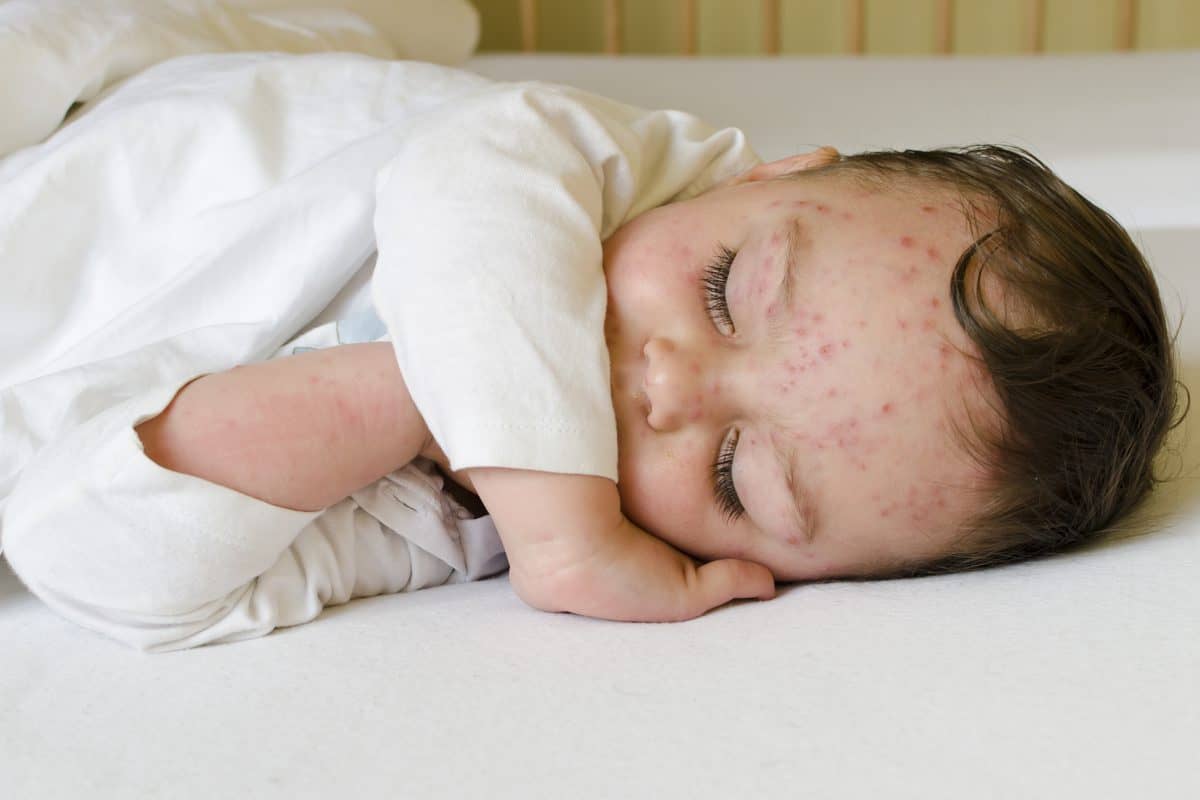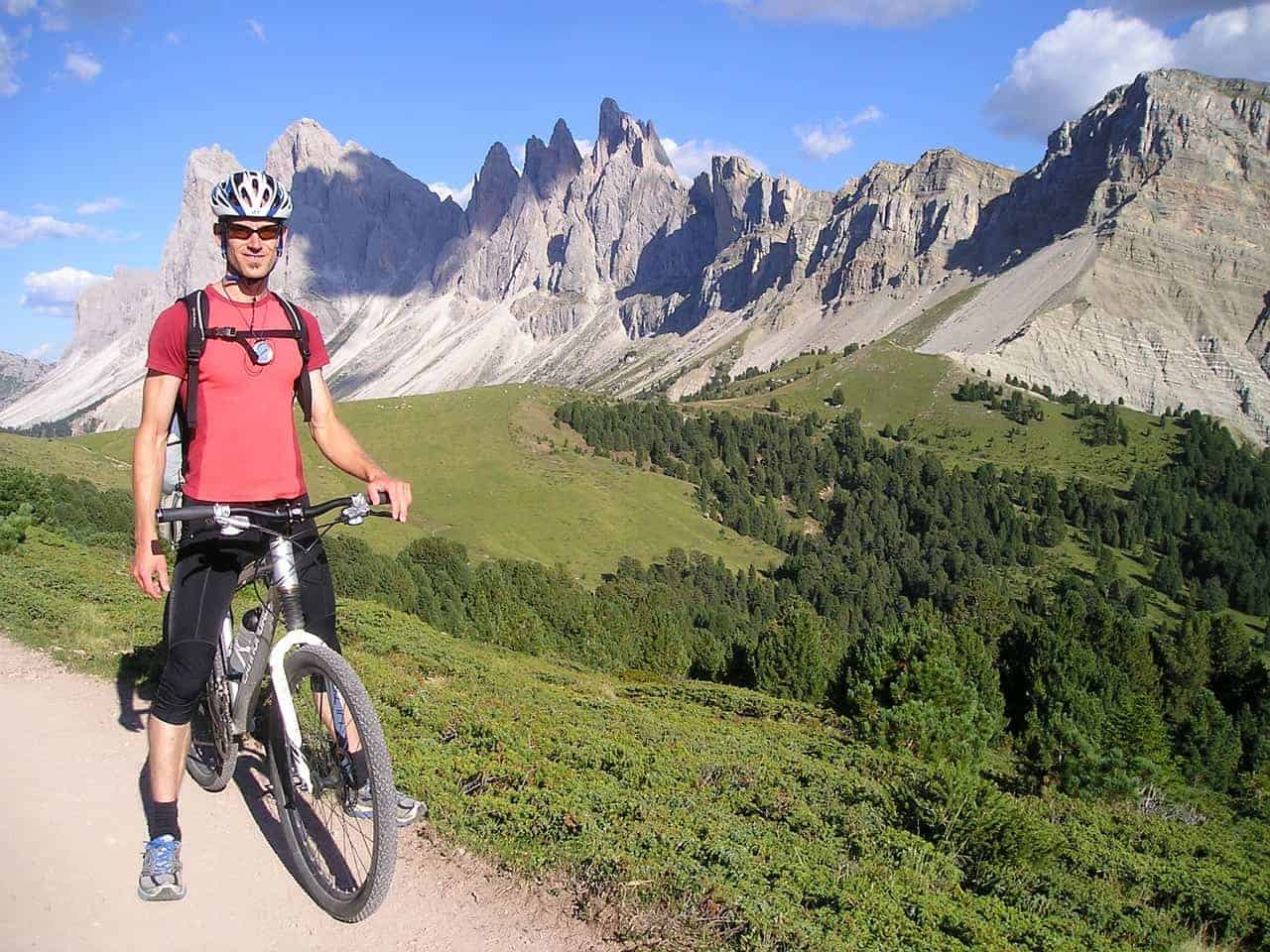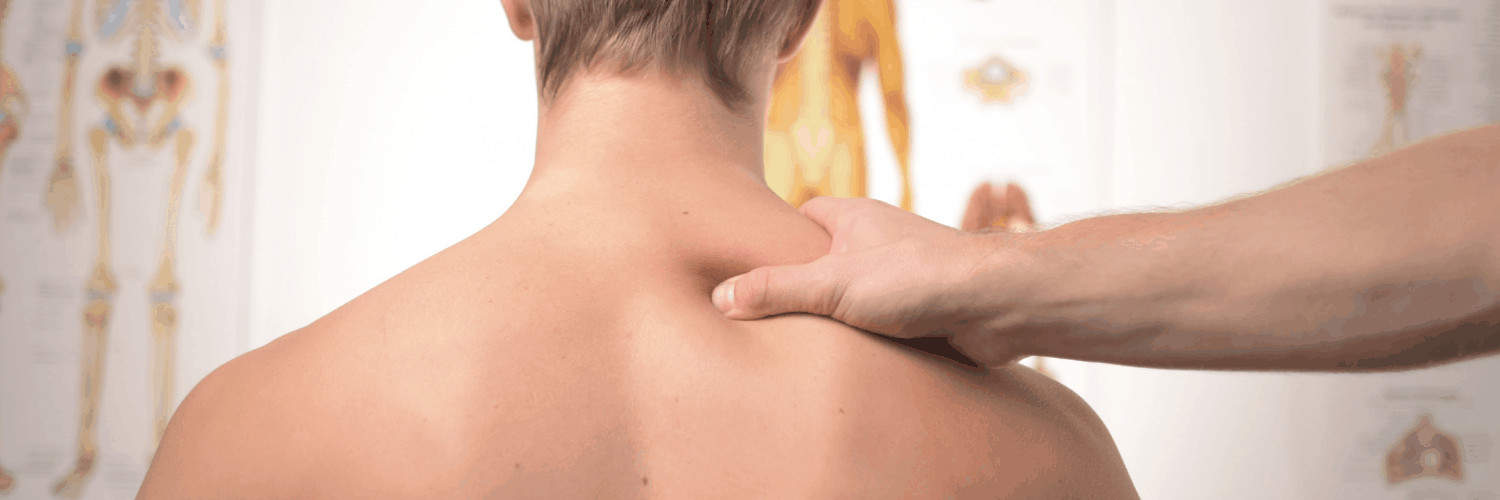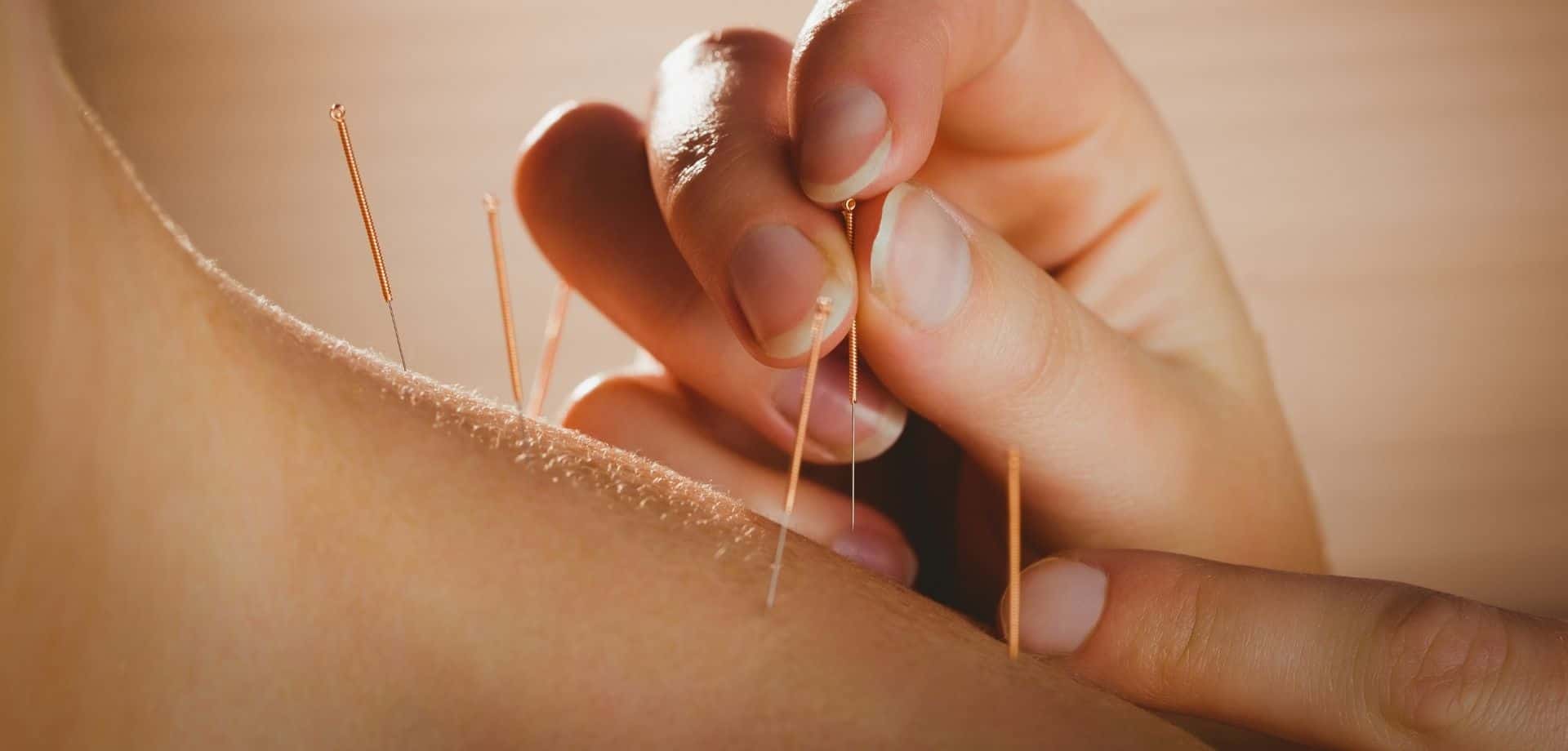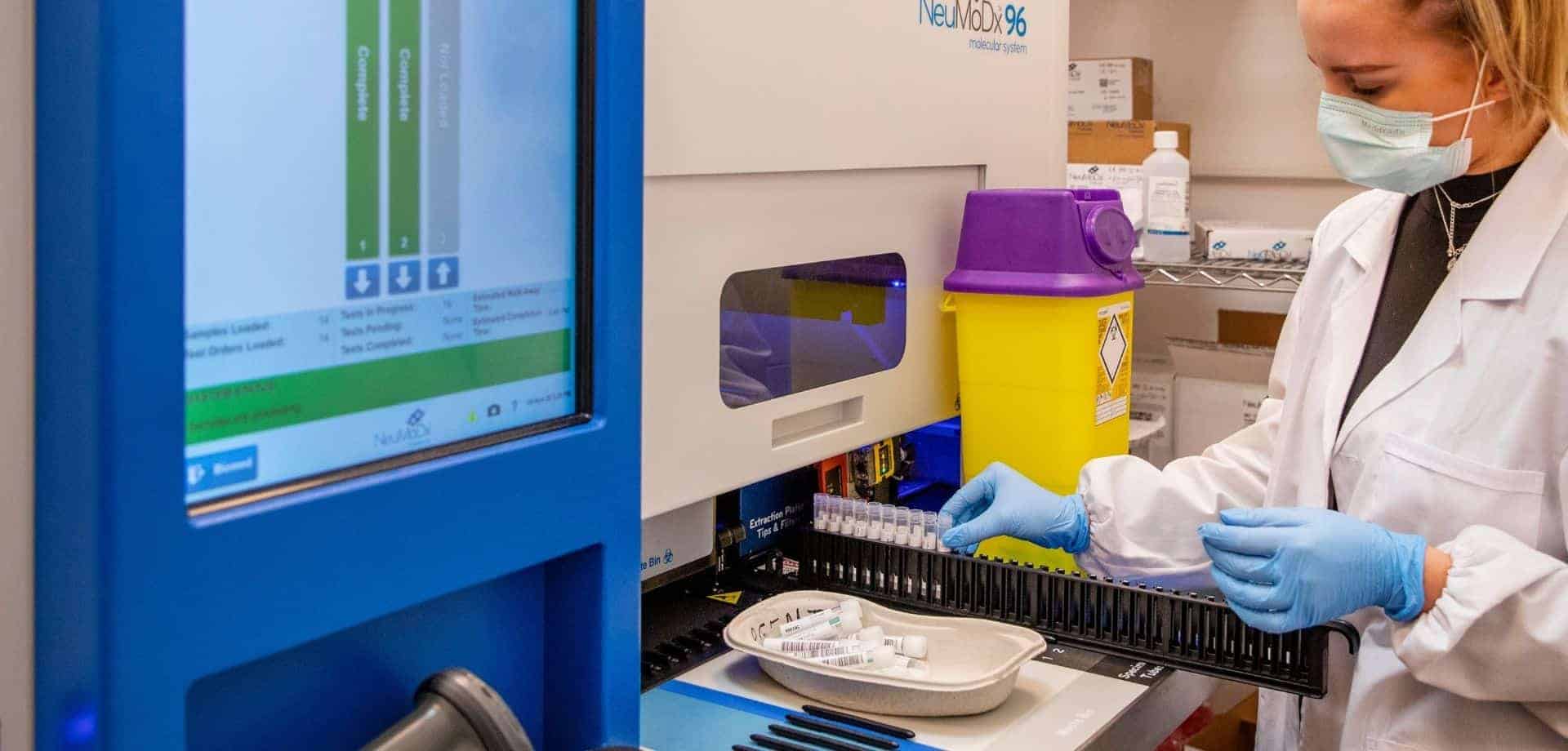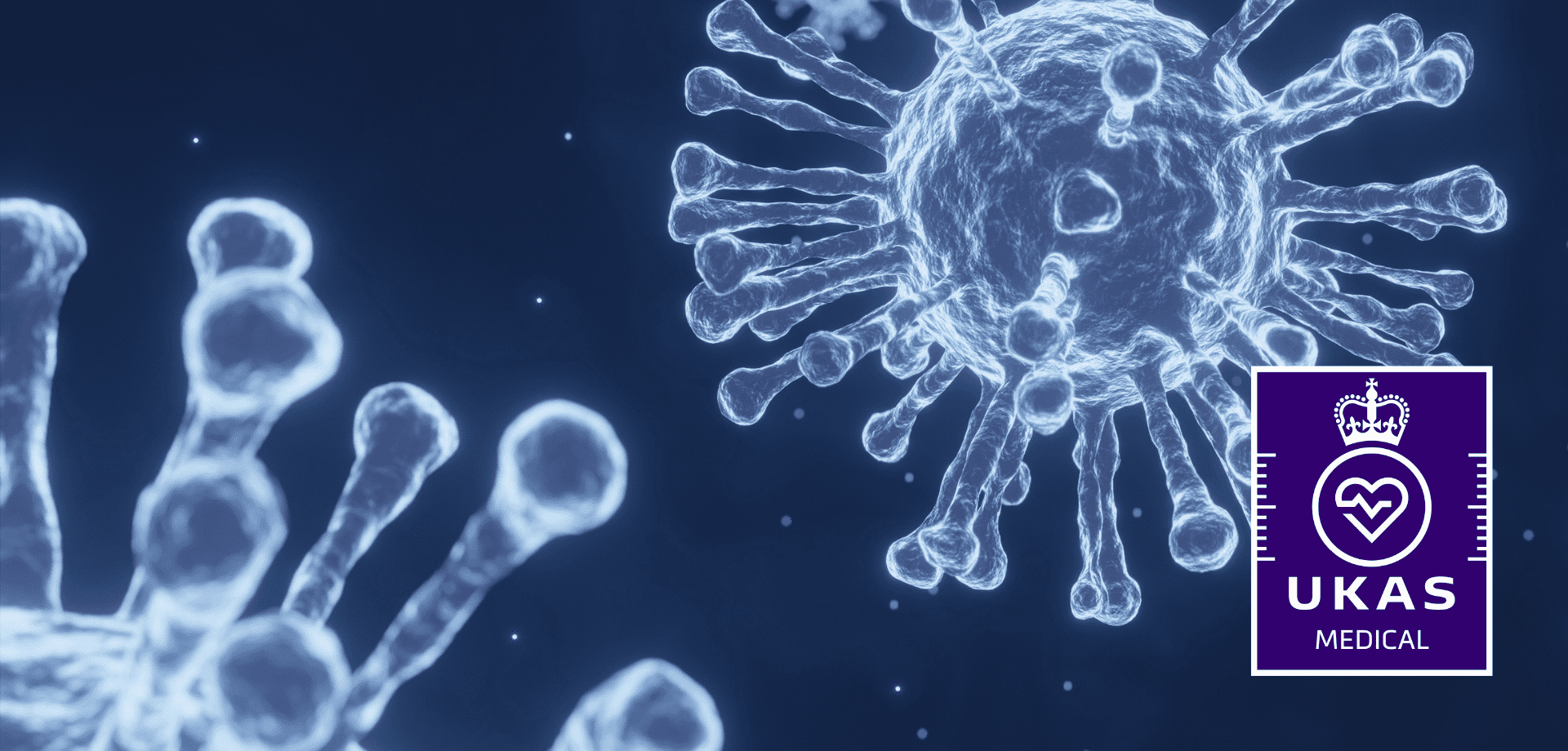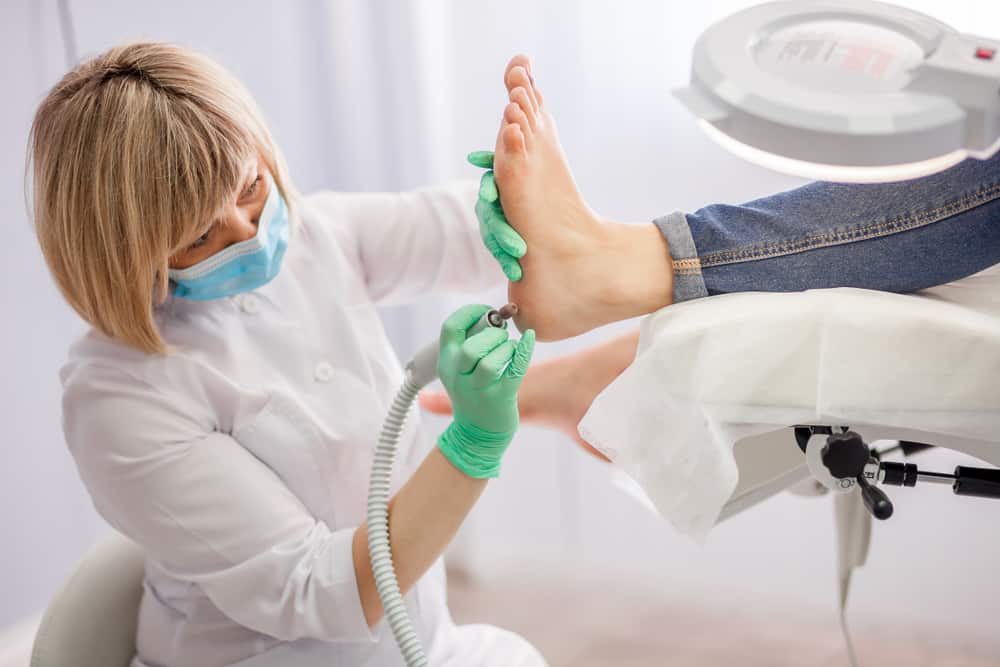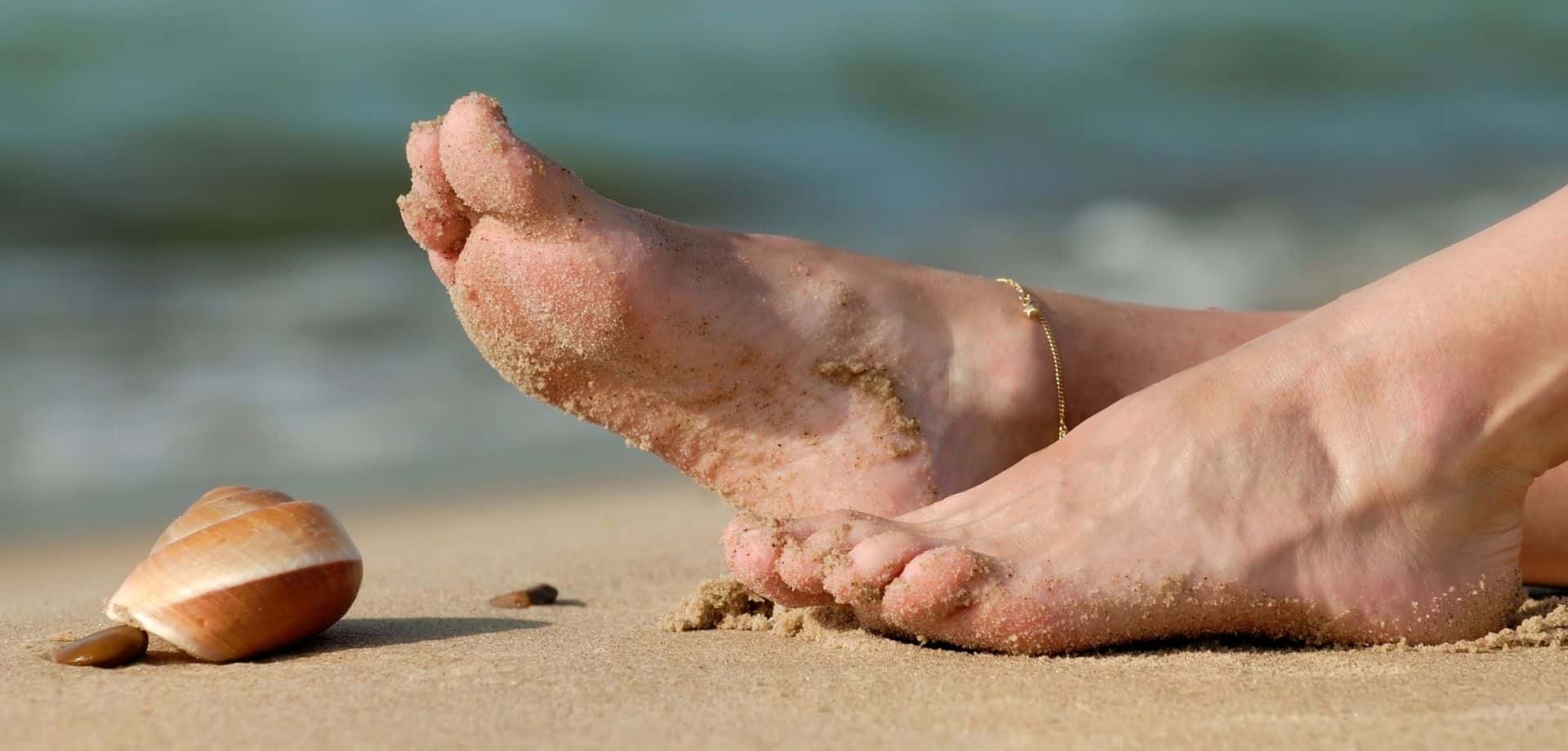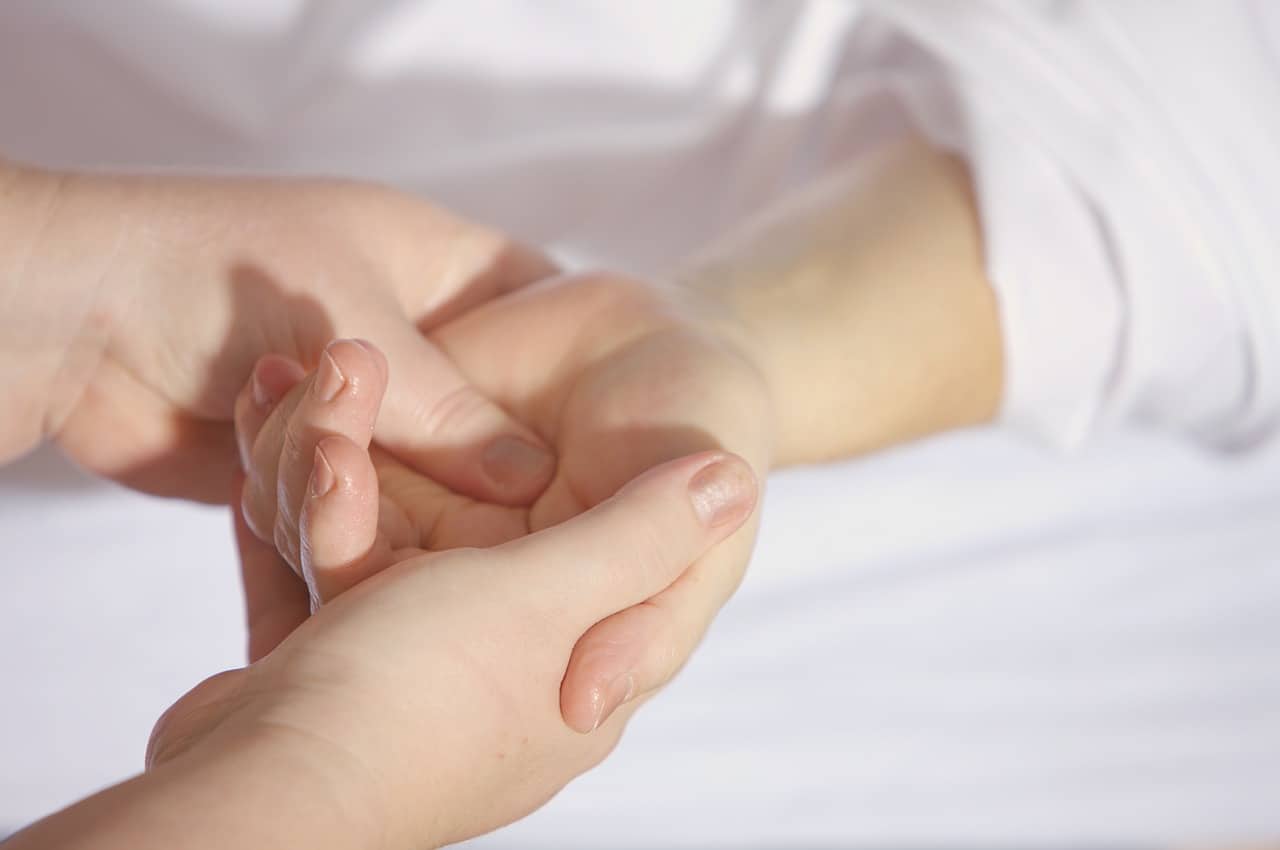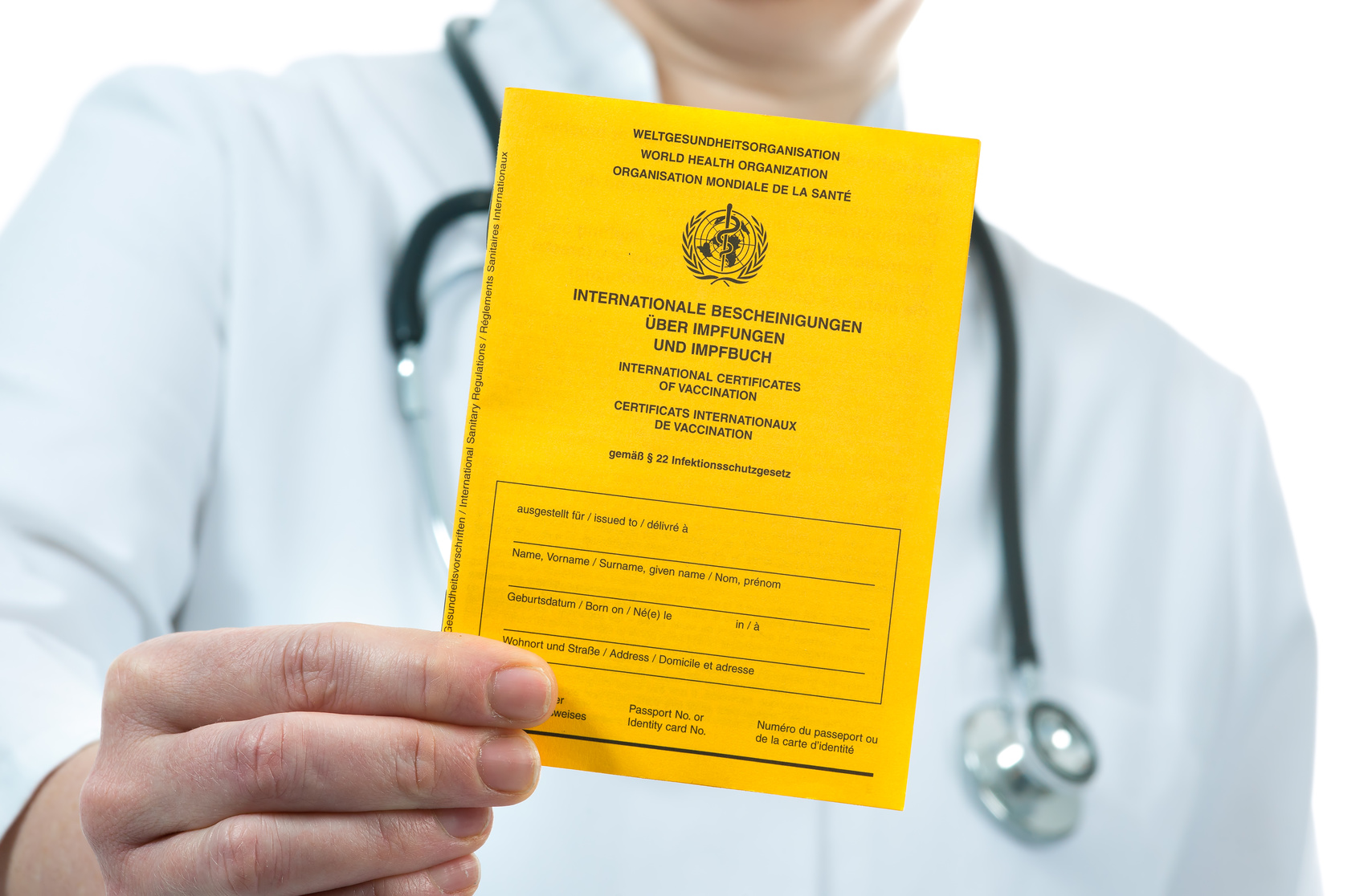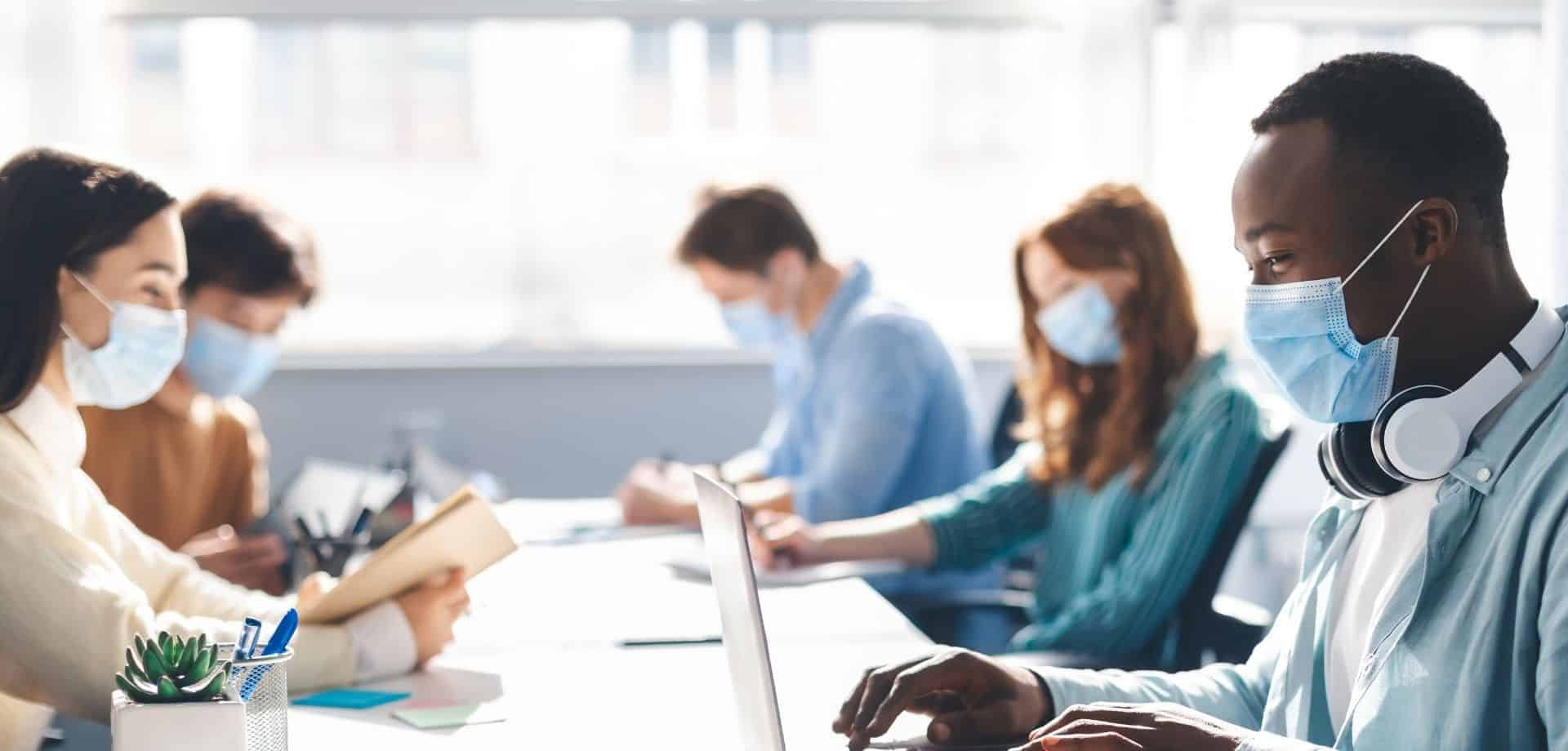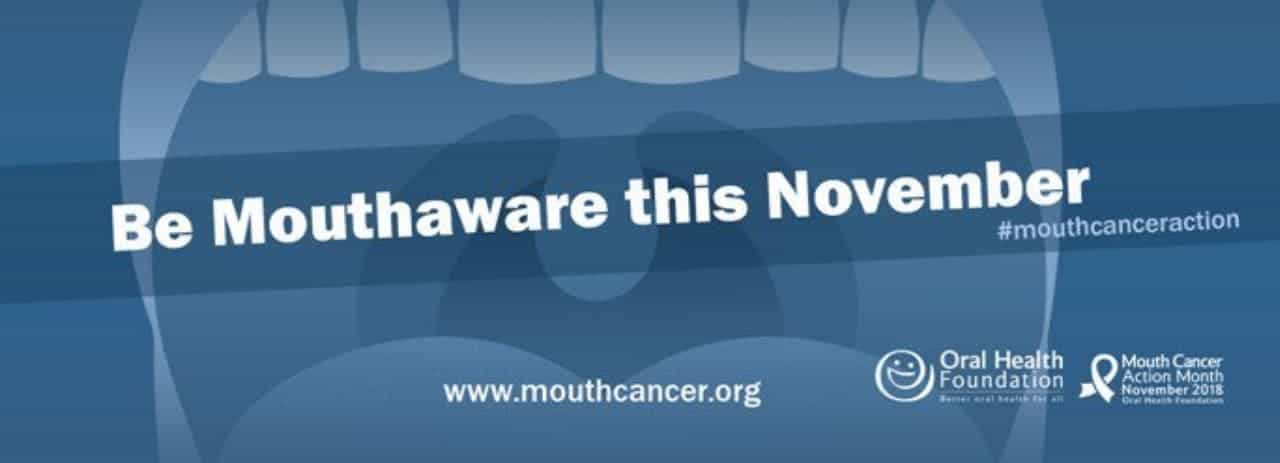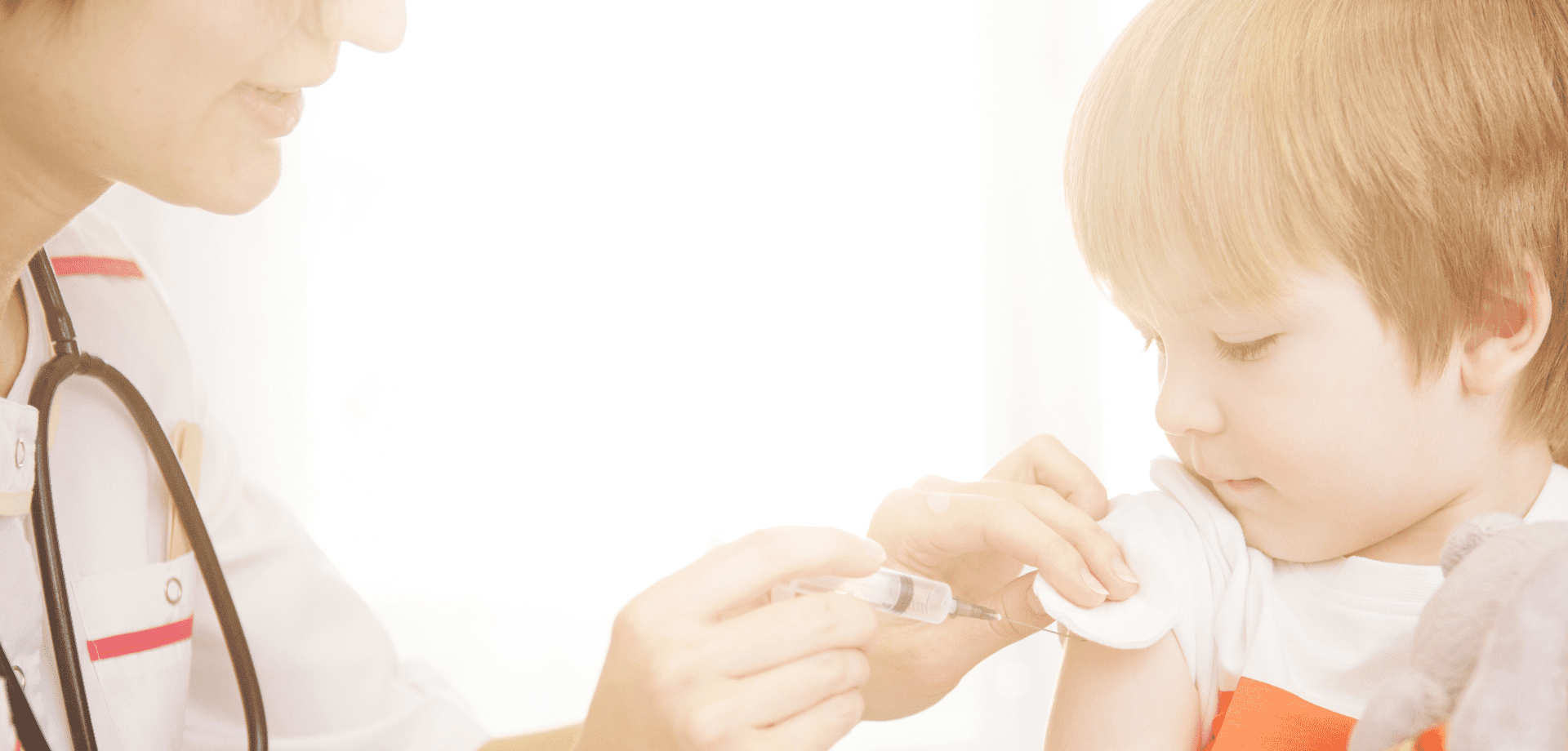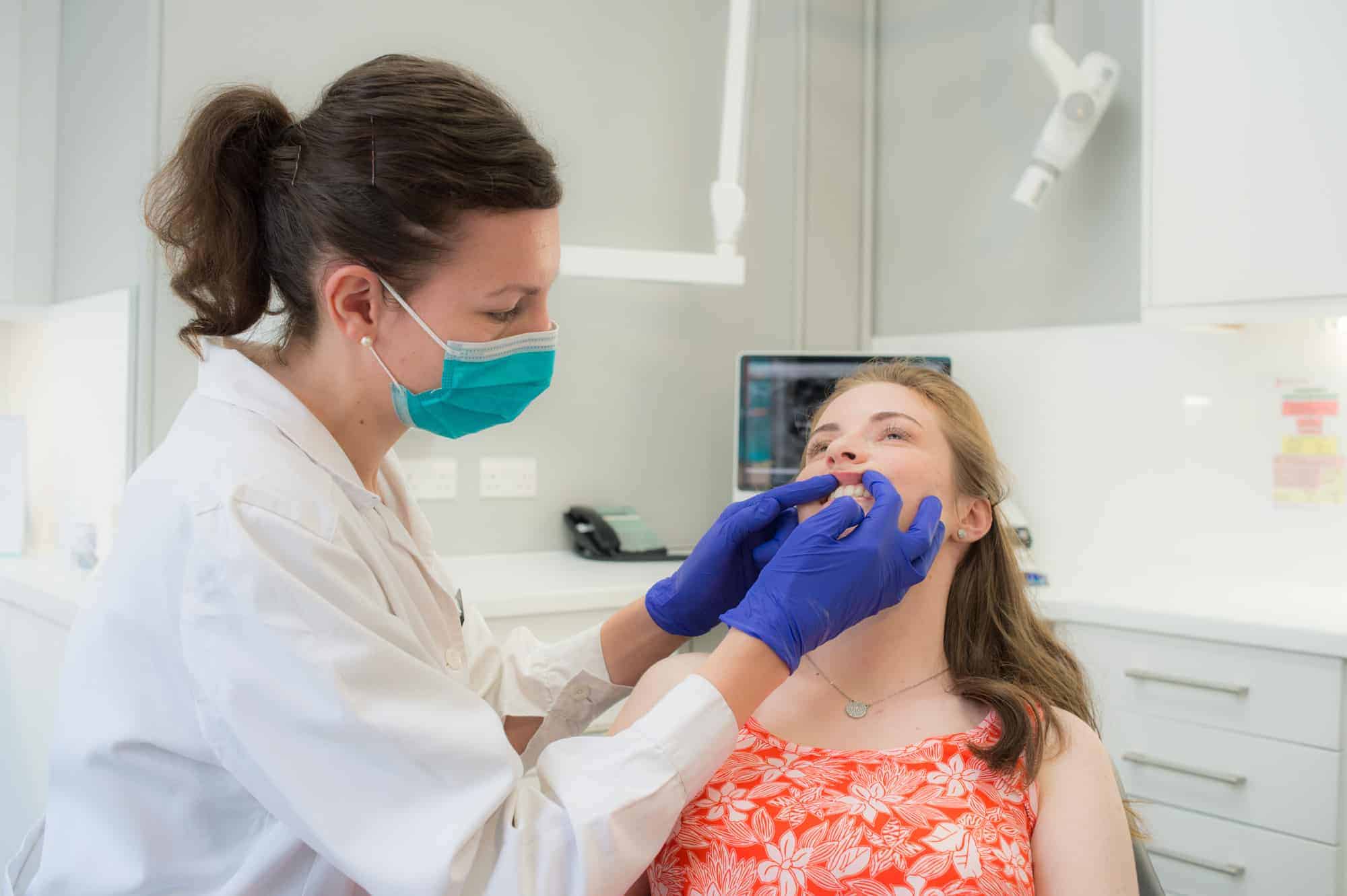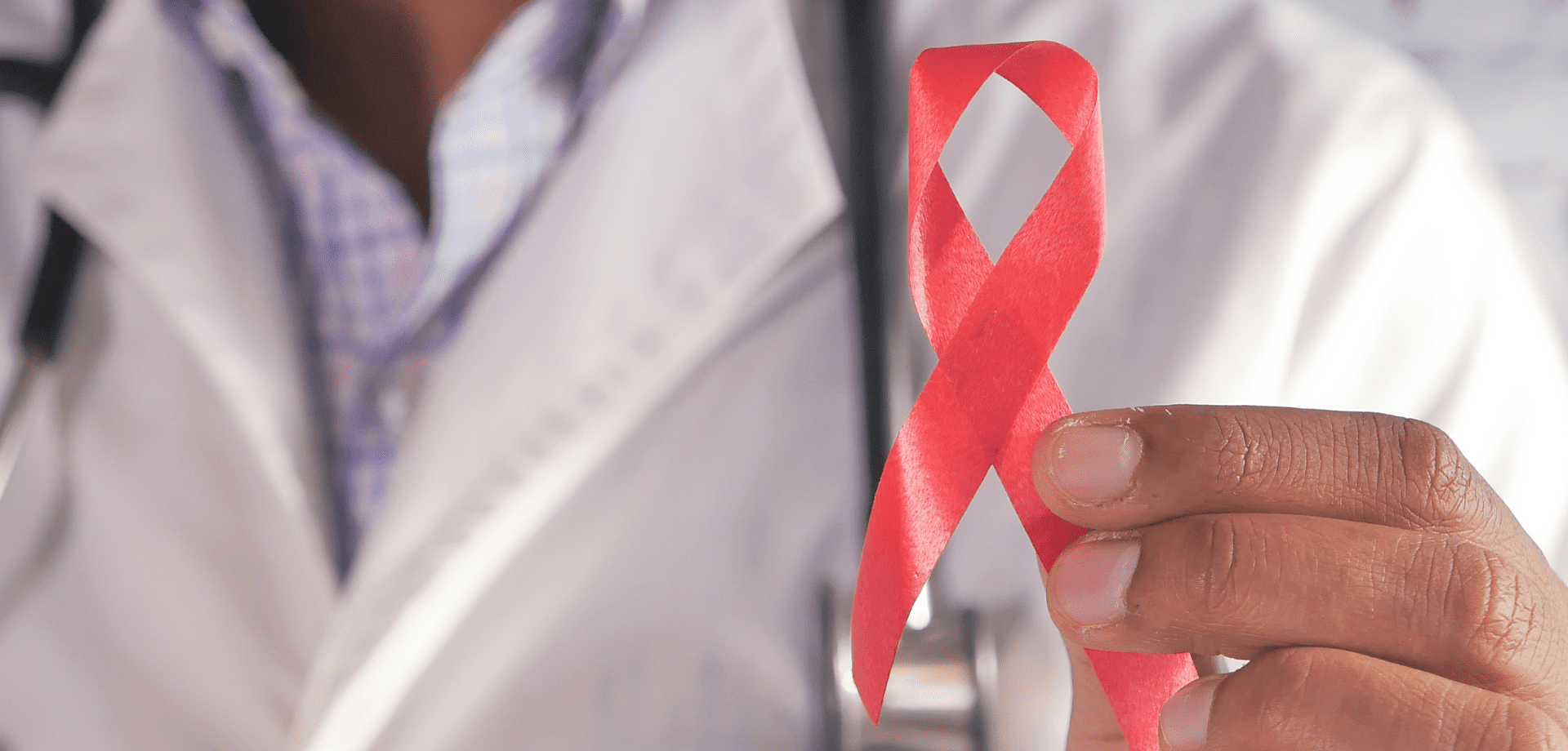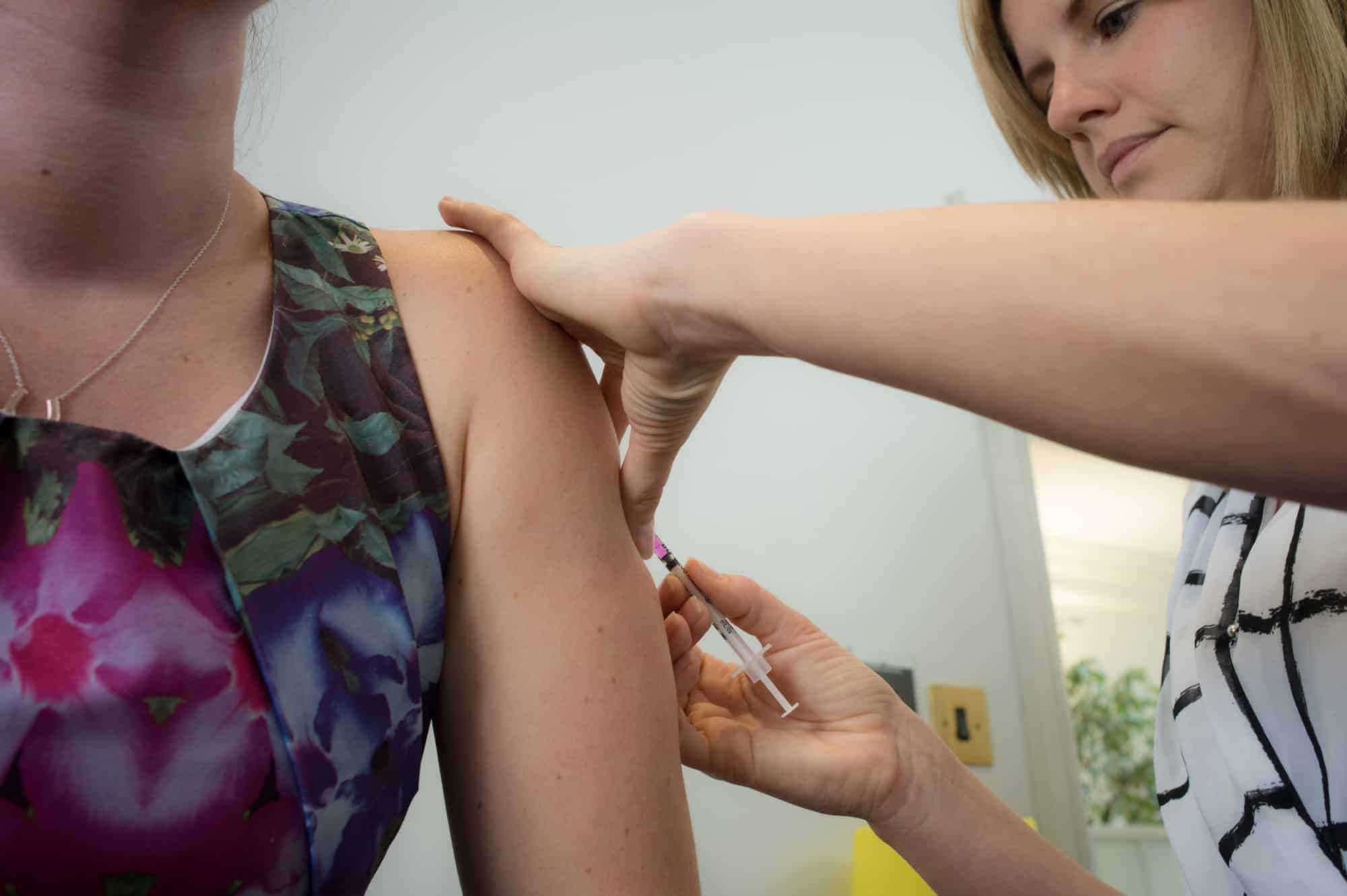Urgent polio boosters advised for London children
UK Health Security Agency (UKHSA) has announced that all children aged 1-9 years regardless of previous immunisation status are recommended a polio vaccine booster from all London boroughs.
The virus, which can cause paralysis, has been found 116 times in London’s waste water between February and July this year.
In the UK, the overall risk of paralytic polio is considered low because most people are protected from this by vaccination. However, due to the recent discovery of type 2 vaccine-derived poliovirus in sewage in multiple locations in London, the Joint Committee on Vaccination and Immunisation (JCVI) have advised that booster vaccinations in all children aged 1-9 years is an appropriate course of action.
The UKHSA says most of the samples detected are the safe vaccine form of polio, but “a few” have mutated enough to be considered dangerous.
Parents should seek the polio vaccine booster as soon as possible – even if their child is up-to-date with their childhood vaccinations.
The aim is two-fold; to ensure a high level of protection from polio paralysis and help reduce further spread of the polio virus across London and beyond.
Booster Polio Vaccinations at Fleet Street Clinic
We offer two vaccinations in-clinic that offer protection from Polio:
Revaxis Vaccine: Suitable for children from 6 years and above
Protects against: Diphtheria, Tetanus, Polio
Cost: £49 + £28 appointment fee
Call to book
Repevax Vaccine: Suitable for children from 3 years and above
Protects against: Diphtheria, Tetanus, Polio & Whooping Cough
Cost: £105 + £28 appointment fee
Call to book
Both of these vaccinations are inactivated, and given by injection. They are both licensed as booster doses, and are not intended for primary immunisation.
More information on the Polio vaccines available at Fleet Street Clinic, click here.
Primary Polio Vaccination
Unfortunately, we do not offer the infant/ baby vaccination for Polio – in the UK this would be the Infanrix-Hexa, the 6-in-1 vaccine. We have no suitable vaccination for children under the age of 3, or for those requiring their primary immunisation against Polio.
Please contact your NHS doctor or an alternative provider to see if they can help you further.
Dr Vanessa Saliba, Consultant Epidemiologist at UKHSA, said:
“It is vital parents ensure their children are fully vaccinated for their age. Following JCVI advice all children aged 1 to 9 years in London need to have a dose of polio vaccine now – whether it’s an extra booster dose or just to catch up with their routine vaccinations. It will ensure a high level of protection from paralysis. This may also help stop the virus spreading further.”
______________________
More information on Polio and the emerging London findings:
What is Polio?
Polio is a serious viral infection that is transmitted through the stool’s of an infected person through contaminated water, food or surfaces. It can cause unpleasant flu-like symptoms and in severe cases, cause paralysis.
What are the symptoms of Polio?
The majority of people with the infection have no symptoms but some feel as if they have the flu, with:
- high temperature
- sore throat
- headache
- abdominal pain
- sickness
In severe cases of polio, the virus can attack the nerves in the spine and brain which can cause paralysis. In some cases, it can cause persistent or lifelong difficulties and even be life-threatening.
Where has Polio been found?
According to the UKHSA statement, in addition to the findings earlier this year of type 2 poliovirus (PV2) collected from the Beckton sewage treatment works, further upstream sampling undertaken by the UK Health Security Agency (UKHSA) and the Medicines and Healthcare products Regulatory Agency (MHRA) has now identified at least one positive sample of the poliovirus, currently present in parts of the following boroughs:
- Barnet
- Brent
- Camden
- Enfield
- Hackney
- Haringey
- Islington
- Waltham Forest
The sampling has also detected the virus in lower concentrations and frequency in areas adjacent to the Beckton catchment area to the South (immediately below the Thames) and to the east of Beckton. However, it is not clear whether the virus has established itself in these areas or if the detections are due to people from the affected area visiting these neighbouring areas.
How many cases of Polio have been identified?
To date, again based on the UKHSA statement, ‘a total of 116 PV2 isolates have been identified in 19 sewage samples collected in London between 8 February and 5 July this year’.
A further 15 sites in London will start sewage sampling in mid-August, and 10 to 15 sites will be stood up nationally to determine if poliovirus is spreading outside of London.
To book your child’s Polio Booster Vaccination, call +44 20 7353 5678 today.
With (hopefully!) sunnier and longer days upon us, summer is a great time of year to get your running shoes on. As a keen runner myself, I understand the appeal; it’s pure, it’s meditative, and it gets your blood pumping like little else.
Unfortunately, for all its positives, running can be problematic for the body and it tends to bring out minor issues and turn them into major ones. These often include achilles tendonitis, shin splints, plantar fasciitis, ITB syndrome, stress fractures, hip and lower back issues, and more knee problems than I have time to list.
Many of the problems from running come from two areas. Firstly, heel strike which is where the heel hits the ground repeatedly and sends a shock through the whole skeleton which causes issues from the heel itself all the way up to the lower back. Secondly, gait – which is the way a person walks; the whole lower limb (especially the knee) is quite finely tuned to work in certain ways, and anything that affects that can begin to cause problems. A dropped arch, tight muscle, old injury, slight one-sidedness etc can bring these issues on.
What can be done to prevent these issues?
Like always, the number one rule is to get any symptoms you are experiencing looked at as soon as possible. Early diagnosis, advice and treatment is vital.
One thing that can really help heel strike and gait is by getting the right trainers. Here’s a few things to consider:
- Don’t confuse fashion and effectiveness. Good running trainers generally don’t look cool! Some of the bigger brands will advertise to you that they are great for sports but do your research. I would usually recommend Asics or Brooks.
- Replace your shoes regularly. The soles of most trainers are good for about 200-250 miles maximum. So, if you’re running 20 miles per week, you’ll probably need to replace them after 4-6 months.
The shoe may still look okay after that but there is an increased risk of injury. It is, therefore, important to ensure that you are replacing your trainers as regularly as required. - You don’t need to buy the most recent model. Many of the best running trainers are on their 20th/30th or so iteration. When a new model is released the price of the last couple of iterations will drop quite significantly, and will still be an excellent option.
- Good arch support. Trainers largely work on preventing pronation etc. by the way they flex. Many have little if any arch support, even with good ones you may need an additional orthotic insole made for your specific needs. This may also mean you need half a size bigger.
- Speak to the experts. A running machine in a shoe shop is useful, but remember the shop assistant has probably only had a brief introduction in what to look for, and no idea of your other contributing factors. Speak to a specialist – an osteopath, podiatrist, or physio.
_____________
OSTEOPATH AT FLEET STREET CLINIC
Andrew Doody is an osteopath at Fleet Street Clinic and is fully registered with the General Osteopathic Council (GOSC).
Book an appointment with him if you have any musculoskeletal injuries by calling +44 20 7353 5678, email info@fleetstreetclinic.com or book an appointment online.
WHAT IS DIABETES?
Diabetes is a lifelong condition that occurs when the body is unable to properly regulate the amount of glucose (sugar) in your blood. Poor control of diabetes can lead to high blood sugar levels and cause long term damage to your overall health and organs.
WHAT HEALTH PROBLEMS DOES IT CAUSE?
High blood sugar levels can cause a lot of damage to your body and if not managed correctly, may lead to many diabetic complications. This will cause long term health problems, especially if they go untreated.
HOW DOES DIABETES AFFECT OTHER PARTS OF YOUR BODY?
Eyes: Retinopathy is a complication of diabetes caused by high blood sugar levels damaging the retina, often leading to vision impairment. It is the leading cause of blindness among working-age adults in the UK. As a consequence of diabetic retinopathy, swelling can take place, called diabetic macular oedema. People with diabetes are also more prone to develop cataracts and glaucoma at an earlier age, contributing to vision reduction.
Feet: Foot health is often a neglected area anyway but high blood glucose levels can lead to insensitivity in the foot and lower limbs, which means you lose the ability to feel pain and distinguish hot or cold. It can also lead to less blood supply to your feet leading to poor circulation.
Loss of sensitivity means that you may not notice if you have a minor cut, sore or wound and poor circulation means if you do get a cut or sore, it will take longer to heal and open wounds are more likely to become infected. This combination is why there is an increase in risk of amputation for those who are diabetic. Regular podiatry appointments are the best way to look after your foot health.
Heart: High blood sugar levels can also cause problems to your blood vessels which can sometimes lead to serious problems such as heart attacks and strokes.
Kidneys: High blood sugar levels creates more difficulty for the kidneys to clear waste. This may lead to Diabetic Nephropathy, the deterioration of the kidneys.
HOW CAN DIABETES BE TREATED?
There is currently no cure for diabetes, therefore, the best way to deal with diabetes is to get it properly managed and controlled. If you are diagnosed with type 1 diabetes, you must either inject or pump insulin into body to treat your diabetes. If you have type 2 diabetes, you may also have to use insulin, however, it can be managed through diet and lifestyle changes.
HOW CAN YOU TEST FOR DIABETES?
An instant HbA1c test can confirm if you’re within the recommended range, or are considered pre-diabetic or confirm that you have diabetes. Using a small blood sample it will measure how well your blood sugar has been controlled over the last 3 months and provide a numerical reading.
As the HbA1c test provides 3-months insight, it is an important blood test for diagnosed diabetics. It provides a good indication of how well they are managing their diabetes..
Many people are more familiar with the glucose blood test – it measures the concentration of glucose molecules in your blood at a single point in time. The amount of glucose in your blood could also indicate whether you could be diabetic or not. People with diabetes can also use this test to manage their condition on a daily basis alongside regular HbA1C testing.
You can book an instant HbA1C test online at a cost of £59.50.
WHAT ARE THE SYMPTOMS?
When it comes to diabetes the symptoms are not always obvious and can often go unnoticed for long periods of time before being diagnosed.
The most common symptoms include:
- Feeling constantly thirsty or dehydrated
- Unintentional loss of weight and increased appetite (type 1)
- Vision begins to blur
- Numbness in your hands or feet (type 2)
- Fatigue
- Urinating more frequently
WHO IS AT RISK?
In the UK, type 2 diabetes is the most common type of diabetes, affecting over 90% of sufferers. The symptoms of diabetes are often mild, therefore, it’s important to be aware of the risk factors that could make you more susceptible to diabetes in the future.
According to Diabetes UK, type 2 diabetes is twice more likely in people of African descent in comparison to people of European descent and six times more likely in South Asian communities, making them a high risk category in developing diabetes. Additionally, people of African – Caribbean and South Asian descent are also at risk of type 2 diabetes much earlier, usually over the age of 25. On the other hand, for Europeans the risk increases when over the age of 40. Other factors contributing to diabetes include being overweight, high blood pressure and genetics.
Other general risk factors include:
- Having high blood pressure
- Carrying extra weight around your middle
- Smoking
- Polycystic Ovary Syndrome (PCOS) sufferers
- Those with a sedentary lifestyle
- Drinking too much alcohol
- Those with disturbed sleep – this includes those who do not get enough sleep and those whose sleep too much
If you have symptoms of diabetes or general concerns about your diabetic risk, you can book a GP appointment to discuss in more detail.
Alternatively, you can book in for an instant HbA1c test with a nurse.
From Sunday, June 12, 2022 at 12:01AM ET all COVID-19 testing entry requirements for international travellers to the United Stated were rescinded.
Arrivals no longer need to show proof of a negative Covid-19 test or documentation of recovery prior to boarding a flight to the U.S nor upon arrival.
The Centre For Disease Control (CDC) has reached the decision based on the high vaccine uptake and widespread population immunity.
In the statement they released, they explain; “The COVID-19 pandemic has now shifted to a new phase, due to the widespread uptake of highly effective COVID-19 vaccines, the availability of effective therapeutics, and the accrual of high rates of vaccine- and infection-induced immunity at the population level in the United States. Each of these measures has contributed to lower risk of severe disease and death across the United States. As a result, this requirement which was needed at an earlier stage in the pandemic may be withdrawn.”
Most countries, including the UK, have already abandoned testing requirements in a bid to return international travel to pre-Covid levels and it seems the CQC have decided it is now time for the U.S to do the same.
Does this mean that the COVID-19 pandemic has ended?
No, but it does signify a shift in the pandemic. As we see a worldwide reduction in covid cases and death rates, the CDC statement clarifies that whilst testing may not be necessary right now, they will continue to monitor the data and adapt accordingly.
They state; “CDC continues to evaluate the latest science and state of the pandemic and will reassess the need for a testing requirement if the situation changes”.
What about covid vaccinations…
Do I need to be vaccinated to travel to the U.S?
Yes, foreign travellers from outside of the U.S are required to be double vaccinated from COVID-19 to enter the country. But for people under the age of 18, U.S citizens/ nationals or lawful permanent residents will be exempt from vaccination requirements. Currently, the Covid Booster vaccination is not a requirement and there is no set expiry date on the first dose of vaccination.
Overall, the easing of the US Covid restrictions is welcome news to the travel and tourism industry and demonstrates the possibility of international travel returning back to its pre-covid levels.
However, the absence of masks, vaccines, or travel mandates does not mean that the risk of catching Covid-19 has gone away.
We strongly recommend:
- Having comprehensive travel health insurance for all travel to the USA – hospital care should you require treatment for Covid is very costly.
- Wearing a high filtration (N95 or FFP3) mask during your journey
- Practising all the usual hygiene recommendations during your journey (e.g. hand sanitisers, distancing where possible
- Having an early test and avoiding travel if you have even minor symptoms.
For more information on the covid testing services available at Fleet Street Clinic.
With monkeypox cases being recorded in over 20 countries across the globe, people are becoming increasingly concerned about its spread and transmission.
Following 2 years of the Covid-19 pandemic, this outbreak has reignited the public’s fear and uncertainty of infectious diseases.
Whilst the media coverage of the monkeypox outbreak is alarming, we would like to reassure our patients that as it stands, the risk is still very minimal and vaccination is not advised as a precautionary measure. Whilst vaccines will undoubtedly be a key part of containing the outbreak, for now, only people who may have been exposed are being offered vaccination.
Our Medical Director & Travel Medicine Specialist, Dr Richard Dawood explains;
“Lots of people have been getting in touch with us to ask about a monkeypox vaccination, but this is not available privately. It is currently only being offered to anyone identified as a direct, close contact of a confirmed case deemed to be at sufficient risk.
The current outbreak does, however, highlight the need to think about your vaccine protection more generally, whether for travel or simply to protect your health and well-being, taking advantage of the best vaccines currently available.”
In a more general sense, it is never too late to catch up on childhood vaccinations, incomplete vaccination courses or any required boosters.
Your immune system naturally decreases with age and certain diseases are also more prevalent in older adults so there may be new vaccinations which are now suitable for you to consider for preventable diseases. Some health conditions can also weaken the body’s immune response, making you more vulnerable to infectious diseases, complications and hospitalisation. Therefore, it is important to ask your GP which vaccinations would be suitable for keeping you healthy.
– For more information on wellness vaccinations.
If you are travelling soon and haven’t had a travel consultation with a travel nurse, perhaps it is time to consider one. Travel nurses are experts in travel health and will advise which travel vaccinations & medications you should consider based on the risk of where you are travelling to and your itinerary once there.
– For more information on travel consultations.
To conclude, we’d like to dismiss a couple of dangerous myths about monkeypox that are unnecessarily scaremongering the public:
Myth 1: Monkeypox is as contagious as COVID-19 or smallpox
Fact: Monkeypox is far less contagious compared to smallpox, measles, or COVID-19.Myth 2: Monkeypox is a new virus.
Fact: No, the monkeypox virus is not a novel virus. It’s a known virus and is generally seen in central and western African countries as localised outbreaks.In summary, we, like the rest of the medical field, will be keeping a close eye on the progression of the Monkeypox outbreak and should our advice change based on new information, we will update this statement accordingly.
For more information on Monkeypox.
Everyone lives such busy lives, so much so that stress now seems an inevitable part of daily life. Whether it be work, personal relationships or even keeping up hectic social schedules, there is often very little time to truly relax.
When stress is chronic it will affect the body in many different ways, interfering with normal body functions such as digestion, blood flow, your pain threshold and also your ability to sleep. Your risk for depression and anxiety, heart attack and heart disease, obesity, eating disorders, and several gut problems also increases.
Tension across the shoulders, headaches, short temperedness, insomnia, tiredness, aches and pains, digestive disorders or menstrual problems are all made worse when the body is stressed and chronic stress can often be the root of unexplained infertility.
Common effects of chronic stress could include the following.
- Upset stomach, diarrhoea, nausea, constipation, heartburn, or other gut issues
- Rapid heart rate or chest pain
- Trouble sleeping
- Loss of sexual desire or reduced sexual function
- More colds or seasonal illness than usual
- Clenched jaw or teeth grinding
- Sore, tense muscles, especially in the neck and shoulders
- Constant worry
- Always seeing the “worst case scenario”
- Racing thoughts
- Feeling frazzled and unfocused
- Disorganisation and forgetfulness
Can you spot any of your mental or physical symptoms in the list?
So how does stress impact the body?
When subject to a stressor, adrenaline floods the body and primes the muscles and senses ready for action. Whilst this is useful to escape from danger, to meet that important deadline or to win the 100m race, when this ‘fight-flight’ stress response is constantly switched on, prolonged muscle tension and poor circulation eventually take its toll on the body. Often resulting in poor health, fatigue and ultimately adrenal exhaustion and collapse.
Our acupuncture specialist, Diane Timewell runs our acupuncture clinic in London. She takes a particular interest in the effects of chronic stress and how acupuncture can help with switching the body from this ‘fight- flight’ response into the parasympathetic ‘rest and digest’ side of the nervous system. Acupuncture can help with controlling stress and anxiety, as it affects the part of your brain that regulates emotions, reducing stress naturally.
Medical acupuncture stimulates acupoints of the body to promote the release of ‘happy hormones’ such as endorphins. This reminds the body to relax, let go of daily stress and signals that you are safe and secure so the stress response can be turned off. In doing so, proper circulation is restored allowing our internal organs to work as they should unhindered by tension. This produces a vibrancy and vitality that can be felt both physically and mentally.
When it comes to acupuncture treatment for stress, there is no one-size-fits-all approach. Whilst there are many points that consistently improve stress, when acupuncture is used to treat stress, the treatment will be fully bespoke.
Stress affects everyone’s body individually and so Diane will work with you to pinpoint all your personal imbalances, treating your whole body based on your particular symptoms and pain areas.
You don’t need to feel unwell to benefit from acupuncture medicine. High achievers, Type A personalities, those who want to climb every mountain are very often sympathetic-dominant adrenal types. Adrenaline is the motivator of the body and so to some extent all successful people will benefit from a certain amount of stress. Learning how to switch it off after the target has been achieved is the key.
Acupuncture treatment is an essential tool for both physical and mental well-being. It can be an excellent way to learn how to take control of your health and switch off chronic stress.
At Diane’s acupuncture clinic, she creates a safe and peaceful environment where you can de-stress, reenergize and regain your natural well-being and vitality.
You can book an acupuncture appointment with Diane online.
Chronic kidney disease (CKD) is a long-term condition where the kidneys don’t work as well as they should. In some circumstances, the loss of kidney function can get progressively worse over time but CKD only reaches an advanced stage in a small proportion of people. Although the damage is irreparable, sometimes if changes are made, CKD can be halted with no further damage occurring.
Chronic Kidney disease (CKD) is divided into 5 stages.
Stage 1 is the earliest stage whereby tests have indicated some level of kidney damage. It is important not to ignore a stage 1 diagnosis as this is the time to take action and make lifestyle changes so that the condition does not worsen. With every increase in stage, more kidney damage has been detected up until the last stage, stage 5. Stage 5 means the kidneys have lost almost all their function and it will be time for thinking about dialysis or a transplant.
What to do if your recent blood test shows a reduced kidney function.
Don’t panic, absorb the diagnosis and understand this doesn’t definitively mean your kidneys will stop working altogether. CKD should not be ignored as it can get worse over time but with careful monitoring and management it can be maintained and you can live long fulfilling lives without being unduly affected by the condition.
It is important to review your lifestyle and in particular, your diet. With early stage CKD (stages 1-3) it is paramount to be as healthy as possible and have a healthy balanced diet.
What do I mean by a healthy balanced diet?
This includes:
- Consistently eating freshly cooked food for every meal
- Limiting your intake of processed foods and avoid highly-processed foods
- Reducing your daily salt intake
- Having considered balanced meals – your lunch and dinner meals should contain proteins, carbohydrates and vegetables. Your portion size will depend on your weight and if you have diabetes
- Ensuring you have a minimum of 2-3 portions of fruits and vegetables each and every day
- Increasing your intake of plant based proteins such as beans, lentils, tofu, soya, seitan
- Drinking lots of water to remain well hydrated (ensure your urine runs clear)
- Being as active as physically possible for you
- Avoiding non-steroidal medicines such as ibuprofen, naproxen etc.
What is a renal diet?
You may have heard of the term, renal diet. The term is used quite widely amongst those who have CKD, but personally, I am not a fan of this term. It doesn’t really mean much and can often be misused. People often think it means a diet of low protein, low salt, low potassium and low phosphate – which is pretty hard to do all at once and not always necessary.
People newly diagnosed with CKD in particular often restrict their diet in a panic unnecessarily and in combination with online resources not being clear enough, this can cause a lot of confusion.
My advice would be to seek guidance from someone like myself, a dietician who can look at your lifestyle and individual health and work out a personalised diet plan. This will be much more achievable and as well as not feeling so overwhelming, you’ll only have to limit the foods you absolutely need to.
How do you monitor CKD?
The best way to monitor CKD is to have regular tests, either blood or urine. How often you require testing will be dictated by the stage of CKD. Your GP will determine what is best for you and it is best to ask them any medical and testing questions rather than your dietician who will focus solely on your lifestyle and diet.
______________
Ruth Kander is a kidney-specialist dietitian, to book an appointment with her please click here.
Women today lead incredibly busy lives. They run and organise homes and build successful careers, usually all whilst taking on the majority share of caring for their children and often their older relatives. It is therefore not uncommon for women to have little or no time to look after themselves, their health included.
In addition to not making time to prioritise their health, it seems that when women do put their health first and seek medical advice, they are less likely to feel heard and supported in comparison to their male counterparts.
A recent survey by The Department of Health and Social Care found that “more than 4 in 5 (84%) women they surveyed had experienced times when they (or the woman they had in mind) were not listened to by healthcare professionals.”
Based on the data they collected, ‘not being listened to’ appears to be present at all stages of the healthcare pathway. Specifically, many women told them:
- their symptoms were not taken seriously and/or dismissed upon first contact with GPs and other health professionals
- they had to persistently advocate for themselves to secure a diagnosis, often over multiple visits, months and years
- if they did secure a diagnosis, there were limited opportunities to discuss or ask questions about treatment options and their preferences were often ignored
Many women recalled their symptoms being dismissed upon first contact with GPs and other professionals; women felt they had to persistently advocate for themselves to secure a diagnosis, often over multiple visits, months and years; and post-diagnosis, discussions about treatment options were often limited, and some said their preferences were ignored.
To make matters worse, there is some evidence that due to historical clinical trials being disproportionately male-orientated there is much less research into women-only health concerns and assumptions have been made that similar medical treatments will work for both sexes. The top reasons for the under-representation of women in trials were the belief that hormone fluctuations could influence results and concerns that fertility could be affected. A widely accepted negative repercussion, amongst others, being that women are much more likely to experience adverse side effects of medications because drug dosages have historically been based on clinical trials conducted on men.
A combination of these factors may explain why there is a gender gap in health outcomes, with women experiencing poorer health outcomes in comparison to men. We strongly believe in equality and ensuring health is a top priority for all.
Therefore, here are the top health symptoms women should never ignore:
1) Any change in bowel habit and/ or urination
This includes blood in the stools, unexplained persistent abdominal pain, weight loss, lumps around the anus, lack of appetite, blood in the urine or increased frequency of urination. These are all reasons for seeing your doctor ASAP as these symptoms could be due to bowel, bladder or ovarian cancer. All patients should have an annual faecal occult blood (FOB) test to exclude bowel cancer, which has increased in incidence in the UK for reasons unknown. Or if you are looking for a more in-depth investigation, you should request a colonoscopy which entails looking at the bowel with a colonoscopy. This is the gold standard, but an FOB is the next best thing and far less invasive as a first investigative option. It takes no time at all and is a good preventative check.
2) Any changes to the breast.
Any breast lumps, skin changes, nipple discharge, nipple changes or pain in the breast must be checked ASAP. Breast cancer is the most common type of cancer in the UK and often can present insidiously. Get to know what your breast feels like so that any subtle changes can be detected as early as possible.
3) Skin lesions that do not heal.
Any scab on the skin which does not heal, especially around the eyes, nose, ears and face should be checked. All these areas are the most sun-exposed, and, as such, are more at risk of skin cancer. If these lesions are picked up and treated early, scarring is minimal, but if left, then disfiguring scars and skin grafts may be necessary.
4) Bleeding after the menopause.
If you experience any bleeding after 1-year of your last menstrual period, you must visit your GP for further investigation. Bleeding after the menopause is not common and could be an indicator of cancer of the uterus, or the cervix. They will usually opt for a biopsy of the uterine lining to exclude both – don’t worry, this doesn’t hurt.
5) Always have regular cervical screens.
Most people don’t find cervical screens painful, although they can feel somewhat uncomfortable. If you are concerned about the pain or you have previously found the procedure painful with the NHS, you can opt to book a private appointment. It is important that you don’t miss your appointment.
6) Bleeding between periods.
At any age, you should never ignore bleeding between periods or after intercourse, as this can be a sign of cervical or uterine cancer. Whilst cervical cancer is monitored by regular screening, it is important to still get bleeding between periods checked out following a normal smear result. Cancer of the endometrium is becoming increasingly common in women who have not had children.
7) A persistent cough.
Regardless of gender, you should get a persistent cough checked out by your doctor, especially if you are coughing up discoloured sputum or blood.
8) Any unexplained changes to your body.
Any new indigestion, shortness of breath on exertion, neck or left arm pain requires follow up ASAP. Make sure a GP examines your chest and makes the appropriate investigations.
The same applies to calf pain or any pain in the chest. By taking a full history, examining you and doing quick and easy investigations, worrying conditions can be excluded, such as a pulmonary embolism or a heart attack.
Some recent examples of cases where other healthcare providers have failed our new female patients:
1) We saw a 36 year old who had not had a cervical screening for 5-years because the last one was so painful. The NHS advises a screening every 3-years but we advise yearly screenings to ensure any abnormalities are found as early as possible. 5-years is far too long!
2) We saw a woman who had a suspicious lump at her anal margin, which her usual GP had told her was part of her bladder. She wanted a second opinion because it had grown in size and was now painful. The patient was referred for an urgent assessment to exclude cancer.
3) We saw an 88 year old patient who was disfigured by a large basal cell carcinoma on her forehead, about which she was embarrassed. The patient had been seen by a dermatologist who had frightened her about having the lesion removed by saying she might not survive an anaesthetic. The patient wished that she had taken the risk and asked to be referred back, as the skin lesion was disfiguring and ruining her quality of life.
** The outcomes of these patients are yet unknown, but they are all certainly serious health concerns that should have been properly addressed long before now.
We want to encourage women to take ownership over their health and be assertive when they feel that something has changed from our normal. If they feel like they are not being taken seriously or not being heard, they should seek a second opinion.
If you cannot get an appointment with your usual GP or through the NHS, rather than waiting for weeks and worrying about what it could be, make an appointment with a private GP who can usually see you on the same day!
Put your mind at ease with private healthcare.
Fear of flying, otherwise known as aerophobia, is an excessive worry about air travel. It is one of the most common forms of phobia and according to YouGov, around 24% of Brits have some form of anxiety about getting on a plane.
People suffering from fear of flying experience extremely anxious thoughts which are often so powerful they become physical symptoms. These can include shallow breathing, experiencing chest tightening, sweaty palms, feeling nauseated or lightheaded and sometimes these even develop into a panic attack, meaning many opt to avoid air travel altogether.
For some, it will have been a lifelong problem that has meant never flying at all. For others, who have flown many miles in their lifetime, it is a problem that slowly creeps up on them over time. In both circumstances, the fear can be debilitating and symptoms often trickle into other areas of life.
Like all phobias, there is little logic to support the anxiety that it causes – travel is in fact the safest form of transport and you are much more likely to die from a car accident than in a plane crash. Knowing that fact does little to ease the flying-related anxiety of an aerophobic sufferer.
So, what can be done to overcome our fear of flying?
Understand the reason why you’re a nervous flyer
Fear of flying is usually caused by a combination of factors. Understanding the root cause of your own phobia is perhaps the first step in overcoming it. Is it a fear of heights? Claustrophobia? Was it that film you watched as a child? Or has a particular world event sparked the fear? Many people suddenly developed a fear of flying after 9/11 for example. Figuring this out will then allow you to tackle it in the right way and using the appropriate techniques.
Fight fear with knowledge
Some experts suggest the first strategy for everyone suffering from a fear of flying is learning about the aeroplane and the science behind flight. Our anxiety is fed by ‘what if?’ catastrophic thoughts. Once you become knowledgeable, your ‘what if’ thoughts will be limited by the facts. There are professionally designed courses that will explain aspects like air traffic control, anti-terrorism measures, and what happens during turbulence. Some courses use Virtual Reality (VR) to simulate a flight, explaining everything along the way with the aim of injecting logic into an illogical fear.
Seek medical help for anxiety, fear and panic
From here, a form of therapy may help to identify and break anxiety cycles. There are many different types of therapy and choosing the right one for you will depend on your own needs and goals. Hypnotherapy and cognitive behavioural (CBT) are some of the most commonly used, but there are countless more to choose from. Deciding which is the most appropriate form of therapy can be daunting, so it may be helpful to seek advice from your GP or a travel nurse.
For those who manage to make it onto the plane, there are quite a few, simple personal techniques that can be used to calm your nerves.
Deep breathing techniques
Making a conscious effort to breathe slowly and deeply can interrupt panic. Deep breathing is known to trigger a comfort response and will help prevent hyperventilation.
Distract yourself
Reading a book or listening to a good podcast can refocus your mind and attention.Distracting yourself from the fact that you are flying can be a great way to keep calm if you’re a nervous flyer.. Time tends to pass much more quickly when adequately distracted.
Tell the flight attendants
Alerting the flight attendants of a nervous flyer could also help – with their training and expertise, they are ideally placed to provide reassurance and will regularly check in on you during the flight.
Avoid coffee and wine
Nervous flyers in general should avoid drinking coffee and wine before and whilst flying. Both can leave you more dehydrated than normal. The extra caffeine in coffee can aggravate anxiety issues and the Dutch courage wine offers will pass leaving you more susceptible to jet lag. Stick with water where possible.
Tea really does help
It’s very British to recommend tea to make everything better, but there are many different herbal teas available which can help with relaxation, reducing stress and calming anxiety. Peppermint, camomile, lemon balm and lavender teas are the most commonly used.
We advise nervous flyers and people with aerophobia to seek further information and guidance from their GP who will be able to make a formal diagnosis and treatment options.
For more advice and information you can book a travel consultation appointment.
Ageing is an inevitable part of living. As we age, many physical and psychological changes affect our overall health and these vary from person to person.
The general myth is that as you age, you become more fragile and that this is unavoidable. This is most certainly not the case. There are always things we can do to help keep healthy in our older years and these changes can slow down or even prevent certain health conditions from developing.
The term “fragile” is defined as not “strong or sturdy; delicate and vulnerable” and is most often used to describe older ladies. One particular age-related health issue that supports this description would be osteoporosis.
Osteoporosis is a degenerative disease that weakens and thins the bones which makes them fragile and more likely to break and is becoming increasingly common. It is much more prevalent in women than men due to the menopause directly affecting hormone balances and this directly affects bone density. It is important to prevent osteoporosis as we age as 75% of fractures due to osteoporosis occur in people aged 65 and over.
There are several things you can do to help prevent osteoporosis:
1) Do regular, weight bearing physical activity.
The lack of regular exercise will result in loss of bone and muscle, so adults who are inactive are more likely to have a hip fracture than those who are more active. Adults should aim to do at least two and a half hours of moderate-intensity exercise every week. Weight bearing and resistance training are a particularly great way of improving bone density and helping to prevent osteoporosis.
2) Eat plenty of calcium and Vitamin D containing foods.
Your diet is very important and the nutrients we get from the food we consume will affect how strong our body is. Eat plenty of dairy, seeds, eggs, oily fish, protein, fruit and vegetables. Additionally, try to get at least 15-minutes of sun exposure per day to increase your Vitamin D intake. As we know in the UK, such sun exposure is not always possible during the winter months and, if this is the case, taking a daily Vitamin D supplement is advised.
3) Maintain a healthy weight.
As you get older, you start to lose lean body mass like muscle and bone density and this can start to happen yearly from the age of 30. Being underweight weakens your bones so it is important to keep your weight in a healthy range. A good indication, although not exact, is your BMI. For most adults, a healthy BMI range is between 18.5 and 24.9, so try not to let your BMI fall below 19.
Those who suffer from eating disorders such as anorexia and bulimia are at a higher risk of fragility due to the conditions causing further bone density loss. This can happen to anorexic and bulimic sufferers of all ages.
Older people should aim to consume a varied diet, consisting of enough calories for maintaining a healthy weight.
4) Limit your consumption of alcohol.
We’d recommend that you drink no more than a maximum of 2 units of alcohol per day. Any more than this has been demonstrated to increase the risk of bone fracture. Alcohol abuse has detrimental effects on bone health and increases a person’s risk of developing osteoporosis.
5) Stop smoking and definitely don’t start!
Smoking is a known risk factor for osteoporosis as it increases bone mass loss. In fact, smoking doubles the risk of hip fracture.
Generally, being healthy is the key to avoiding fragility and in particular preventing osteoporosis as we age. Having an annual health medical can highlight any areas of concern. They can monitor the progression of any pre-existing health issues, as well as detect arising conditions in the early stages. You can book your annual medical online
In addition to making healthy lifestyle choices, it is also important to book a doctor’s appointment should you notice any changes to your health. The sooner a health concern is addressed, the easier it is to treat. You can book a GP appointment online.
At Whitby & Co. and the Fleet Street Clinic, we strongly believe in our duty to protect our colleagues and patients alike, independently of Government regulations. We have stayed open since the start of the pandemic, delivering key health services for our patients, face-to-face and without interruption, but with no compromise on safety.
Despite the recent changes to isolation legislation and access to testing, you can rely on the fact that we plan to keep regularly testing all our staff for the foreseeable future – using highly sensitive rt-PCR tests in our own onsite lab. The benefits of rt-PCR testing means the infection is detected much earlier, rather than at peak infection which is when lateral flow tests only turn positive. We will advise our employees to continue to isolate in the event of a positive test: we prefer to pay our staff to stay at home, rather than risk spreading Covid-19 among colleagues or to our patients.
Whilst we absolutely recognise that the Omicron variant is less severe than previous dominant strains of SARS-CoV-2, we are not willing to compromise the health and wellbeing of our employees or patients when the severity is so unpredictable person to person. For peace of mind and to protect those most vulnerable, we will continue to wear face masks and prevent infectious individuals from entering our premises.
Our internal strategy appears thus far to be successful: although a number of us have inevitably had Covid-19 over the course of the pandemic, there have certainly been no outbreaks among staff from workplace transmission.
Beyond this, you can rely on the fact that all our staff are fully vaccinated, and indeed (like all health workers) were prioritised for vaccination from the earliest opportunity.
Whatever your reason for coming to see us at 29 Fleet Street – whether for an eye examination, a GP appointment, travel vaccines, or to use any of our other services, you can be confident that we have all been vaccinated and have had a recent negative coronavirus test. And this extends to if any of us come and see you at your home, office or place of work, you can be completely assured that we have used all our resources to protect you, your family and your colleagues.
In theory, a hybrid working week is the best of both worlds for both the employee and the employer. It combines the best of pre-Covid collaborative office-based working with the flexibility of working from home. Allowing employees to be fully engaged with the company and their colleagues all whilst offering the opportunity for solo focus that comes with home working. It is thought that many companies will permanently adopt a ‘hybrid’ way of working.
With this being a long term model of working, many people have realised that their makeshift home office will not suffice without causing havoc on their bodies. Making sure that the physical and ergonomic set up of your home office is correct is imperative for avoiding any musculoskeletal problems.
A bad home office setup has the potential to cause you repetitive strain injury, lower back pain, increase your risk of carpal tunnel syndrome and could even be the cause of your headaches and migraines. It is worth taking the time to understand what a good home office set up is and work out the best way to adapt your setup to make a healthier home working space for you to work from.
Back to basics:
We always start at the basics. Even though they may seem obvious, time and time again it has been proven never to assume the basics are widely known. So, let’s go over them briefly:
- Choose the right chair: You should invest in a chair that offers adequate support. Try and get a chair that is fully adjustable – meaning you can alter the height, back position, and tilt to best suit you. This will be much more comfortable and will support your body when you’re sat for long periods of time.
- Support your back: You should adjust your chair so that your lower back is supported, this will reduce strain on your back. Your knees should be slightly lower than your hips.
- Arm position: Your elbows should be positioned by the side of your body so your arm forms a right-angled L-shape at the elbow joint.
- Screen level: Your screen should be directly in front of you with your monitor placed at about an arms length away, with the top of the screen roughly at eye level. You may need a screen monitor to achieve this.
- Keyboard and mouse position: Your keyboard should be placed in front of you with a 4-6 inch gap at the front of the desk to rest your wrists. You might consider a wrist rest. You should aim to position your mouse as close to you as possible. A mouse mat with a wrist pad can help.
Now for some suggestions a little more out the box:
L-shaped desks
It’s important to be fully facing whatever you’re doing. Trying to work while twisted, even a little, is going to cause problems. This often happens when someone needs to type at a screen, but also use a book, write, or use two monitors. A great solution is to set up your desk in an L shape (two desks perpendicular works). This allows you to swivel your chair to face whatever you’re doing at that moment.
Supplementary monitors
Plain monitors are cheaper than you’d think. Instead of hunching over a laptop, or piling books up to put a screen on, think about investing in an extra monitor, maybe with a bigger screen and a stand. If you need documents open, think about a second monitor, it will cut down on mouse usage of having to keep swapping between windows. It can also be used vertically to get whole pages on which means less scrolling. Equally, extra keyboards and mice are really quite cheap and ergonomically so much better. Lots of different mice for arm/shoulder complaints are available. You can have a full setup in place and simply plug in your laptop when you arrive.
Foot stools
If your desk isn’t height adjustable, chances are your chair is adjusted to match the desk, not you. This is ok, as long as your feet are still flat on the ground with knees at about 90 degrees. If not, you may find a footrest makes a great difference, taking pressure off the back of the thighs and preventing over extension of the lower back. If you’re too tall, leg extensions for the desk are a simple remedy.
If you’re looking at buying a new desk. I recommend adjustable ones. Costco stocks an electric one for under £200. This can allow you to spend part of the day working, standing.
Aesthetics
Creating an environment that is visually pleasing will do wonders for your mental wellbeing. This is equally as important as physical setup and will improve mood, lower levels of tension, and increase productivity. Try to utilise lots of natural light if you can. Position your desk where it feels airy and open. Choose light colours to surround your workspace. Add a couple of green leafy plants. Whatever little changes that make you feel happy!
Movement
Try to incorporate regular movement to your working day. If you can, get up every hour for 30 seconds and have a quick stretch. When working statically for long periods of time, the muscles fatigue.
This may all seem like a lot to consider for a workstation but these are simple changes that can easily be implemented. Optimising your work space can make a huge difference in both your comfort and productivity.
If you are experiencing any musculoskeletal problems, book an appointment online with our osteopath, Andrew Doody.
Or for more information on osteopathy, see here.
Throughout the pandemic we have supported many industries trying to navigate business-as-usual alongside managing the potential risk of coronavirus in the workplace.
Identifying covid-positive individuals as well as outbreaks is essential, but it is also important not to underestimate the peace of mind testing brings to employees who may be anxious about catching covid-19 in the work environment, especially those who have been in close contact with someone at work who has subsequently tested positive.
The creative arts industry has been particularly impacted by closures, and given the close-contact nature of the theatre and performing arts sector, outbreaks do occur. The speed at which those infected can be identified can make all the difference between a show going ahead or being cancelled.
We have supported Kenny Wax Productions for the last 2 years with crisis management and routine testing using our ultra-rapid covid-19 rt-PCR testing service.
Here’s how we supported the production of MAGIC GOES WRONG during their Christmas crisis:
At 15:18 on New Year’s Day (a Saturday), we received a text to say that the entire cast of MAGIC GOES WRONG was heading straight to Fleet Street, following a positive result from one of their actresses. The only way the evening performance could go ahead was to determine whether covid-19 had spread throughout their cast, or not.
We understood the urgency of this situation and quickly and calmly took samples from a cast of 21 against the clock. We ran them through our lab at the same time, which can be quite a challenge. Since we knew that there would not be enough time to re-run samples, this needed to be done with special care. For us to be able to give Kenny the “thumbs up” to go ahead with the evening show, it was imperative we got things right the first time.
One of the best things about our NeuMoDx lab equipment is that we can load each sample as soon as it is taken, rather than waiting for the complete batch. We started running samples immediately, the last of them had finished running by 18:10, when we were able to assure Kenny that it was safe for the cast to go on with the show.
We were able to go from initial text enquiry to sample-taking and final, confirmed results for the entire cast in just over 3 hours.
Kenny Wax, the Producer of MAGIC GOES WRONG explains:
“Our West End hit MAGIC GOES WRONG had managed to avoid shutdown. However, an actress who had been feeling a little unwell leading up to New Year and continuously tested negative on lateral flows, finally came through with a positive test on Saturday morning 31st December. Hearing this news, the rest of the cast became very anxious about continuing performances until they were confident that covid had not spread throughout the company.
As Producer of the show, I was made aware of this information at 1.45pm. There was due to be a matinee at 2.30pm and an evening show at 7:30pm. We had no other option than to cancel the matinee but in an attempt to save the evening performance (a Saturday Night), at very short notice we attempted to get the whole company of 21 people PCR tested in the afternoon. To achieve almost the impossible everyone set off for the Fleet Street Clinic and by 6.10pm, we received the good news that the rest of the company had tested negative on the PCR and we were able to continue with the evening performance and the following two
shows on the Sunday. This not only saved us another financial blow due to cancellations at the box office, but we were able to provide entertainment to 1,500 customers across those three performances.Dr Dawood’s staff at the Fleet Street Clinic are always polite, friendly and efficient. They fully understood the nuances of working with a West End theatre production company on a very tight deadline. I am very grateful for their continuing support and cannot recommend them highly enough.”
For more information on our corporate coronavirus testing services and other covid-19 support services.
Weight loss has become a thriving industry and we’re bombarded constantly with unhealthy FAD diets, weight loss programmes, influencers selling teas and pills all promising to help us lose weight. Many of these are promoting quick fixes which are not advised by doctors or dieticians. It can be really hard to know what information to trust. To help navigate the sea of information (and misinformation!) surrounding weight loss, we have asked one of our GPs, Dr Belinda Griffiths, and our dietitian, Ruth Kander, their advice on how to lose weight safely and successfully.
Firstly, it is important to note that weight loss should be consistent and gradual as it can be dangerous to lose too much weight too quickly. Dr Griffiths suggests that “a safe weight loss is 1-2 lbs or 0.5-1kg per week… Greater weight loss than this per week can lead to malnutrition, exhaustion, increased risk of gout and gallstones.” There is also an increased risk of developing an unhealthy relationship with food which, in extreme circumstances, could lead to eating disorders.
Ruth added, “Losing weight gradually and at a healthy rate is key.” Remember, it’s all about consistency! Perseverance will amount to healthy lifestyle changes which will allow you to achieve your weight loss goal.
Don’t underestimate diet
Both Dr Griffiths and Ruth agree that diet is the most important factor when it comes to weight loss. As Ruth explains; “having a healthy balanced diet that is lower in calories than our body uses is a good way to start the weight loss journey. If we don’t reduce calorie intake, one won’t lose weight:.” – this is known as being in a calorie deficit. The amount of calories that will result in weight loss will vary from person to person and depend on the amount of exercise the individual does. In order to lose weight, you will need to burn more calories than are consumed and therefore restricting your calorie intake is the simplest way of losing weight.
Foods to focus on
Ruth recommends that “people should focus on a variety of foods when trying to lose weight”. While Dr Griffiths suggests, “focusing on a range of lean proteins (including meat and fish), vegetables, high fibre foods (such as quinoa, bran flakes etc) and fruit in moderation”. Vegetarians can substitute in lentils, nuts, beans and tofu instead of meat and fish. In general, high calorie foods such as fried food, cakes, biscuits, chocolate and sugary drinks should be avoided.
Let’s get physical!
Although weight loss is still achievable without much exercise, incorporating exercise into your lifestyle will not only aid weight loss, but will generally improve your overall health. Any exercise is better than none whether it be tennis, swimming, or even walking, “whatever you are capable of, just do it!” is Dr Griffiths advice. Ideally, a combination of exercise is best for weight loss – this includes cardio / fat burning and resistance or weight training. Get those steps in! An easy way to incorporate more exercise into your daily routine is by aiming to walk at least 10,000 steps per day. This easy change can make a big difference and remember, as Dr Griffiths says “the more exercise you do, the greater calories are burned” – it’s as simple as that!
Don’t forget about NEAT movements!
NEAT (or Non-exercise activity thermogenesis) movement refers to the physical movement we do day-to-day that isn’t necessarily planned exercise and “encompasses the energy that we expend by simply living”.This includes the calories we burn breathing, eating, sleeping etc. Dr Griffiths suggests that “you can increase NEAT movement easily in your everyday life by making simple changes such as taking the stairs rather than the lift, by standing rather than sitting, by walking instead of taking the train/ bus/ tube or even by carrying bags rather than having items delivered”. It all adds up! These simple swaps will increase the number of calories you burn and help facilitate weight loss.
What to do when you plateau
The first stint of weight loss can make it seem a little too easy as you tend to lose weight more easily in the beginning, but a common issue lots of people face is when weight loss reaches a plateau. This is where you stop losing weight to the same extent you were before, or stop losing weight for a period of time. This can feel disheartening and more often than not, people tend to give up at this stage. Dr Griffiths states at this point “it is a case of persevering with calorie restriction and regular exercise and gradually weight loss will resume.” If it doesn’t, Ruth suggests “ looking at what you’re eating to see if anything has slipped”. She states “maybe you’re not taking into consideration extra calories here and there” but they all add up. See if there are any areas of your diet where you could be a little stricter, or consider starting or upping your exercise.
Sleep and Stress
A good night’s sleep and keeping your stress levels down will be your friend when it comes to weight loss. “In order to lose weight, you need to be in the correct frame of mind and life circumstances” says Ruth. Research has shown that you tend to eat more and make poorer food choices, including seeking comfort food, when you are sleep deprived. This is because not getting enough sleep “disrupts the hormones in your brain (Leptin and Ghrelin) that control appetite” says Dr Griffiths.
Stress can also play a part in weight loss as Dr Griffiths explains that “stress increases cortisol levels which increases gastric acid output and makes you feel anxious and hungry”. Ruth adds “there is also a theory that being stressed can limit weight loss in terms of hormonal activity in the hypothalamic-pituitary axis which can lead to the release of hormones that can limit weight loss”. Keeping it simple, “to lose weight, good sleep and minimal stress would be ideal”.
Final thoughts
Trying to lose weight can seem complicated, confusing and difficult, but when you really break it down, the ingredients to losing weight successfully are actually very straightforward. If you stick to these simple rules and you are patient and consistent, the weight will come off and you will achieve your goals.
If you feel that you are doing everything right and you still aren’t losing weight, or are even putting weight on, there could be something else causing this. You may have an undiagnosed underlying medical condition and we’d advise you to visit your GP to make sure everything is well.
If you would like any extra support with your weight loss, why not book an appointment with Ruth. Or if you have any concerns over your health, please book an appointment with one of our GPs.
If you are feeling sad at the start of the year, don’t worry, you are not alone.
Although it comes around every year, we always seem to be caught off-guard by what has now commonly become known as “The January Blues”.
The January blues is another name for situational depression and is associated with the way we think and feel. Around this time of year, the weather is cold and gloomy, the days are shorter and the nights are longer, plus you may be experiencing post-Christmas exhaustion, debt and perhaps even dread going back to work.
Symptoms of the January blues are things such as low mood and sadness, lack of motivation, tiredness and low energy. These are all normal feelings, if temporary.
Most likely, your negative mood will be brought on by the anticlimax of reality after the exciting events of December & the New Year. Ever heard that old phrase, “don’t cry because it has ended, but smile because it happened”? Find comfort in knowing that you are absolutely not alone in feeling blue in January. In fact, many people in the UK feel especially down in January but the good news is that the January Blues are temporary and typically only last a couple of weeks. You don’t need to take any medication as your thoughts and feelings should naturally return to normal.
If it doesn’t and you are experiencing prolonged or worsening thoughts and feelings, you may actually have Seasonal Affective Disorder or SAD, which is different. SAD is clinical depression caused by a person’s biology. It is much longer-lasting, sometimes months on end and likely to occur every year in winter. You should see a doctor to discuss your symptoms as if you have SAD, a range of treatments are available to assist recovery. More information on SAD can be found here.
Remember, please be kind to yourself and know that you’re not alone.
For more information on our GP Services.
To book a GP appointment online, click here.
We no longer offer hypnotherapy at Fleet Street Clinic.
In 2021 we stopped providing hypnotherapy as a service to our patients. We do still offer other supporting services, which may be of interest and suitable for your needs:
If you are unsure, please contact us and we can assist you further.
For an overview of all other services available at Fleet Street Clinic, click here.
Most people experience fluctuations with their weight and it is common to gain weight naturally as we age. For the most part, diet changes, eating more or reducing exercise are the main causes for gaining weight. However, if a person gains weight in a short period of time for no reason, this could be the sign of an undiagnosed, underlying health condition. There are several conditions and circumstances that are known to cause weight gain, some of which can be serious and require medical attention.
Here are just some medical conditions which can cause sudden weight gain:
Polycystic ovary syndrome (PCOS)
This is a hormonal condition which affects the way a woman’s ovaries work. A common symptom of PCOS is weight gain, particularly around one’s middle. Weight gain is rarely the sole symptom, it is usually part of multiple symptoms including acne, excessive hair, irregular periods and/ or thinning hair. PCOS makes women less sensitive to insulin or cause insulin-resistance which can lead to weight gain and secondary conditions such as diabetes.
Hypothyroidism
A common cause of unexplained weight gain in men and women comes from having an underactive thyroid. This is because when a thyroid is underactive it doesn’t produce enough thyroid hormones, which in turn affects your metabolism, slowing it down. Hypothyroidism can be diagnosed with a thyroid function test and if diagnosed, it can be easily treated with a replacement hormonal tablets.
Cushing’s syndrome
This is a rare hormonal disorder which is caused by elevated levels of cortisol in the body. Cortisol is responsible for regulating metabolism and appetite, which means elevated levels can slow down your metabolism as well as increase hunger, both of which can cause weight gain.
Insomnia / chronic lack of sleep
Being sleep deprived can result in making poor food choices, including seeking unhealthy foods and eating more than usual. This is thought to be because a lack of sleep disrupts the hormones in the brain (Leptin and Ghrelin) that are responsible for appetite.
Medication
Certain medications affect metabolism which can cause weight gain and weight loss. Medications such as steroid medication can cause weight gain, bloating and swelling due to water retention.
Lipoedema
This is a problem caused by an issue with the lymphatic system that causes an abnormal build-up of fat in the legs and sometimes the arms. This usually results in the upper body being generally a much smaller size compared to the lower half of the body but typically affects both sides of the body equally. This condition can also be painful and cause tenderness or heaviness in the limbs. Lipoedema mainly affects women and it is rare in men.
Chronic stress, depression and/ or anxiety
Mental health issues can sometimes cause people to turn to food as a coping mechanism, often triggering compulsive eating behaviours. Additionally, higher cortisol levels are often found in people with depression which is known to increase appetite and the motivation to eat. Antidepressant medication can also increase hunger as they interfere with serotonin levels – a neurotransmitter that regulates appetite.
Menopause
Women going through the menopause often experience weight gain. Changing hormone levels affect the way the body stores fat and can cause women’s bodies to store, rather than burn, calories. Women also generally need less calories after the menopause, and so, if you do not adjust your calorie intake, you are likely to put on weight.
PMS
During PMS (premenstrual syndrome), progesterone levels surge and dip which are known to increase appetite (the cause of which are unknown). PMS can also cause weight gain as a result of water retention.
While many of these causes are rare, they are possible and anyone experiencing unexplained weight gain should visit their GP to rule out anything that may require medical care or treatment. It’s always best to be on the safe side! And if everything is normal, your GP can provide you with tips and advice on how to manage your weight gain.
If you are experiencing unexplained or sudden weight gain, or think you might be displaying symptoms of the conditions mentioned above, please book a GP appointment today.
Fleet Street Clinic receives UKAS ISO 15189 Accreditation for testing of SARS-CoV-2 (COVID-19)
Fleet Street Clinic has confirmed its UKAS ISO 15189 accreditation for the detection of the SARS-CoV-2 virus (COVID-19), granted on 8th December 2021.
UKAS is the National Accreditation Body for the United Kingdom and is appointed by the UK Government to access competence and accredit organisations that provide testing services. It is an internationally recognised accreditation body.
Fleet Street Clinic has been at the forefront of private Covid-19 testing since the start of the pandemic and is one of the very few private healthcare clinics in London who can deliver ultra-rapid testing to private patients and corporations.
Receiving the UKAS ISO 15189 accreditation confirms that Fleet Street Clinic has continuously met the standard of accuracy and safety for private covid-19 testing and offers quality assurance.
Our full scope of accreditation can be found here.
With almost 25 years of diagnostics experience, Fleet Street Clinic can be trusted with confidence to deliver private Covid-19 testing.
Have you thought about Corporate Flu Vaccinations?
The winter season can be problematic for businesses, as employees take time off due to sickness and annual leave. Illnesses such as flu are most likely to affect employees during the autumn and winter months.
If you are in charge of organising your company healthcare and wellbeing programmes, you may be unsure about whether to offer flu vaccines. The fact is, workplace flu vaccination can offer a significant return on investment in terms of reduced absenteeism and increased efficiency in the office, meaning there is one less thing to worry about.
We respond to some common questions about corporate flu programmes here:
WHAT TIME OF YEAR SHOULD I ORGANISE MY COMPANY’S corporate FLU VACCINATIONS?
Plan ahead and book the session as early as you feel able. This will ensure you’ll get the dates you want to suit your companies needs.
For best protection, the optimal timing for vaccination is between September and early December, before flu viruses begin to circulate. Each year, October and November prove a popular choice but we can vaccine up until February 2021.
WHY SHOULD I PROVIDE CORPORATE FLU VACCINATIONS FOR MY STAFF?
A flu outbreak in the workplace can cause an increase in absenteeism, which can result in a loss of productivity as well as increasing the workload of any staff that do not succumb to infection. For large and small organisations alike, this can have a massive impact on productivity and revenue. Furthermore, this year in particular, flu symptoms are extremely hard to distinguish between Covid-19. Getting the flu jab has become even more important than in previous years to eliminate potential confusion.
Workplace vaccinations are a great way of promoting health and wellbeing among your employees and demonstrating a caring ethos.
Benefits of the Flu Vaccine include:
- Flu vaccinations improve the wellbeing of your employees, promoting job satisfaction and a positive work atmosphere.
- Flu vaccinations reduce absenteeism.
- The greater the number of people who are vaccinated, the less potential there is for flu to spread through your workplace, among staff members families, and within the local community.
- Annual seasonal flu vaccination is the best way to reduce the chances of becoming ill with the flu.
HOW MANY PEOPLE TAKE UP THE FLU VACCINATION?
Workplace flu vaccination uptake can vary. Internal promotion and communication can make a big impact on likely numbers; motivation to avoid illness, and perception of current risk are also key factors. A good general guide, based on past years indicated an uptake of between 25%-45%. Due to more awareness of viral infections due to Covid-19, we anticipate this uptake to be higher this year and that given the option, most staff would probably choose to be vaccinated.
How Much Money Can You Save Your Company with a Flu Vaccine Programme?
Calculate the likely savings your company can make from a successful flu programme by visiting our corporate flu calculator here.
Fleet Street Clinic offers workplace flu vaccination programmes both on-site across the UK, and at our drop-in clinic in central London, via our flu vaccination programme, FluJabs.Org.
Get in touch and make an enquiry if you would like more information or a you can get quote for your company.
Sleep is one of our greatest allies when it comes to health and wellbeing. It is associated with a number of health benefits which can have a huge positive impact on our daily lives.
Conversely, a lack of sleep can be detrimental – research has even found that not getting enough sleep can negatively impact some aspects of brain function to a similar degree as alcohol intoxication!
Dr Belinda Griffiths discusses some of the mental and physical health benefits of getting a good night’s sleep.
Immune System
During sleep, your body releases cytokines, which are essential for the regulation of the immune system. Cytokines are required in increased amounts when you are attacked by a pathogen (when you’re ill) or under stress. The level of cytokines increases during sleep, and therefore lack of sleep hinders the body’s ability to fight infections. This is also the reason why the body tends to sleep more while suffering from an infection.
Weight Control
When you’re well-rested, you’re less hungry. Being sleep deprived disrupts the hormones in your brain (Leptin and Ghrelin) that control appetite.
With those out of balance, your resistance to the temptation of unhealthy foods goes way down. And when you’re tired, you’re less likely to want to get up and move your body. Together, it’s a recipe for putting on the pounds!
Athletic Achievement
If your sport requires quick bursts of energy, like wrestling or weightlifting, sleep loss may not affect you as much as endurance sports like running, swimming, and biking. But you’re not doing yourself any favours. Besides robbing you of your energy and time for muscle repair, lack of sleep saps your motivation, which is what gets you across the finish line. You’ll face a harder mental and physical challenge – and see slower reaction times. Proper rest sets you up for your best performance.
Memory
When you’re tired, you can have difficulty recalling information. That’s because sleep plays a big part in both learning and memory. Without sufficient sleep, the brain finds it difficult to focus and take in new information in the first place and then doesn’t have enough time to properly store information as short-term memories. Sleep helps enable you to retain memories and store information.
Sleep also allows for your mind to rest, repair and rebuild, the same way it does for your body. As you sleep, your brain begins to organise and process all the information you’ve taken in during the day. It converts these short-term memories into long-term memories – this helps you to learn.
Concentration
Not sleeping properly can mean that both your body and brain don’t function properly the next day. It can impair your attention span, concentration, strategic thinking, risk assessment, reaction times and problem-solving skills. This is particularly important if you have a big decision to make, are driving, or are operating heavy machinery. So, getting plenty of sleep can help you stay sharp and focused all day long.
Mood
Another thing your brain does while you sleep is process your emotions. Your mind needs this time in order to recognise and react in the right way. When you cut that short, you tend to have more negative emotional reactions and fewer positive ones. Lack of sleep can cause bad temper and anxiety, so the better you sleep, the better your ability to stay calm, controlled and reasonable.
Chronic lack of sleep can also raise your chance of having a mood disorder. One large study found that people with insomnia were five times more likely to develop depression, and the odds of having anxiety or panic disorders are even greater.
A refreshing slumber helps you hit the reset button on a bad day, improve your outlook on life, and be better prepared to meet the challenges of the next day.
Heart Health
While you sleep, your blood pressure goes down giving your heart and blood vessels a bit of a rest. The less sleep you get, the longer your blood pressure stays up during a 24-hour cycle. High blood pressure can lead to heart disease and strokes. Therefore, it is important to keep your blood pressure down.
Pain Threshold
Poor sleep and pain mutually reinforce each other. Sleep deprivation increases pain sensitivity and reduces pain tolerance. Therefore, something will feel more painful when you’re tired.
It is clear that sleep is an essential part of helping us stay physically and mentally healthy. What better excuse to have a few extra hours of sleep a day!
If have any concerns about your health, book a GP appointment today.
SUMMER CYCLING
Summer is the perfect opportunity to dust off your bike and think about turning that commute into an opportunity to get fitter or shed a few pounds!
Cycling – a low impact sport
Compared to many sports, cycling is one with a relatively low injury rate. Crashes and collisions apart, cycling is impact free – good for your joints and muscles. In addition, if you select the correct gear to match the terrain, it means that you can avoid overloading your muscles and joints, keeping the cranks spinning rather than pushing a big gear.
Also important is that because your feet are fixed in place, spinning the cranks requires very little coordination, which also reduces the risk of injury due to poor technique, which is very common while running. Still, despite all these advantages, cyclists can, and regularly do, suffer overuse injuries.
Fix a good riding position:
One of the main issues is the set up of the bike itself. Here are a few pointers as to how to best achieve a good riding position:
SADDLE HEIGHT
This should be positioned so that when the pedal is at the bottom of the stroke and the ball of your foot is on the pedal, your knee should have a slight bend in it. If you want to get technical, saddle to pedal distance should be 109% of your inside leg measurement. Hips shouldn’t move sideways during crank rotation and you shouldn’t have to stretch at the bottom of the pedal stroke. Don’t be put off by feeling you have to come off the saddle to touch the floor.
SADDLE ANGLE
This should be in a horizontal position, parallel with the floor when viewed side on (but sometimes a very slight downwards tilt can be helpful for those who experience a lot of pressure in the perineum area. However, don’t do this just because it feels more comfortable, as this can cause lessen support and affect riding position).
POSITION OF THE SADDLE
With the pedals adjusted so that they are at the three o’clock and nine o’clock positions, a vertical line dropped from the kneecap of the forward knee should pass through the axle of the pedal.
HANDLEBAR POSITION
This is where opinion varies a little. Racers want the handlebars low to lower wind resistance, climbers want the handlebars low so they don’t feel too high when the bike’s angled up. The rest of us want them higher than this. A good rule of thumb is that you don’t want to be leaning on the handlebars too much, only holding them. If it feels like your upper bodyweight is being supported by the handlebars, try them up a little. Not all bikes are adjustable enough at the front but a stem raise is a cheap efficient way of remedying this. A bit more height in traffic is safer anyway.
And if you haven’t bought your bike yet, put a bit of research into what frame/wheel size you need before you do.
Cycling is a great way to get fit and works well with core stability, however, if any injuries do niggle don’t push through and do get them checked out!
Osteopath at Fleet Street Clinic
Andrew Doody is an osteopath at Fleet Street Clinic and is fully registered with the General Osteopathic Council (GOSC).
For more information on our osteopathy services, click here.
Book an appointment with him if you have any musculoskeletal injuries by calling on +44 20 7353 5678 , email info@fleetstreetclinic.com or book an appointment online.
With over 9 million employees put on the furlough scheme at the peak of the pandemic, and many still on the scheme 12 months later, it’s no wonder that there’s an increase in anxiety about returning back to the workplace.
With some employees seeming less than enthusiastic about returning to the workplace, it may be concerning for an employer about how they address this anxiety and what to do if faced with this situation.
From the many Occupational Health consultations we’ve had this past year, we’ve learnt first-hand and also through our clients about the transition back into the workplace for both employees and employers. We’ve been able to get a good picture of the main issues people have been facing and what the underlying cause for the anxiety can be.
As with any anxiety, the cause can be a singular concern or a combination of concerns and when investigating further, each person should be treated as an individual to fully understand their concerns.
A discussion with an empathetic leader is a great place to start. Sometimes, however, a review by an independent occupational health clinician from a SEQOHS-accredited clinic, like Fleet Street Clinic, is required to work out if the employee is fit to continue working, if any adaptations for working are suggested and some circumstances, what medical help is required.
Here are some of the main concerns and issues that have come up time and time again from both employee and employer and how these can be mitigated:
Lack of confidence:
Many furloughed returnees may come back wondering if they can still do their job as well as before, which can manifest into a lack of confidence. With not being at work for a long period of time, certain skill sets may have started to feel ‘rusty’. Worries and concerns about returning to full-time hours from the get go, and having to perform at the same level they were at before they went on furlough are just some examples.
What can help with this?
Early engagement between the employer and the returning employee is important to discuss any specific anxieties and to work out a ‘return plan’ which can really make a difference. ACAS advises employers to think about those returning from furlough as if they have been on maternity or long term sick leave. Using similar ‘check ins’ (as you would for maternity/ sick leave) prior to their return to work allows for real-time conversations to cover the practicalities, potentially a staggered return to build up confidence, as well as an opportunity to discuss any anxieties and concerns.
Concerns over workplace safety:
Two of the most common themes found in consultations with Fleet Street’s Occupational Health Department were employees worried about safety, and whether going back into the office ‘would be the same’.
What can help with this?
To help reduce such anxiety, employers have been encouraged to share with those returning their ‘Covid compliant workplace risk assessments’. HSE made these mandatory last year, although officially they do not have to publish their results internally unless there are over 50 employees. Sharing such information on an individual basis would allow the furloughed employee to see what changes and controls have been put in place, giving them reassurance and peace of mind. It also demonstrates to them that the employer is prioritising their health and safety.
Employers should also consider setting up a ‘virtual tour’ of the amended workplace, to enable those returning to see and understand what their new workplace will look like. Changes such as one-way pathways around the building, socially distanced workstations, extra cleaning of communal areas and bathrooms are just some of the more visual changes. Employers should also take the time to discuss changes in policies such as obligatory wearing of masks, flexible office/home working (if feasible) and other benefits that may have been introduced. Logistical concerns about childcare is one of the major blockers for those returning, and this is another example of how the employer can have open discussion with the returnee to formulate a reasonable solution, preferably weeks ahead of the return to work date.
Concerns over leaving the home:
Returning employees may have concerns about leaving the home and what impact this may have on their health. Other factors employers had to think about were those who were shielding (classified as extremely vulnerable by the Government) and for those living in a household with someone shielding.
What can help with this?
To mitigate this, employers may have chosen to use Occupational Health to contact the employees returning to identify any risk factors or health concerns. Although any medical information would be classified as strictly confidential, the employee and Occupational Health professional discuss the outcome of the assessment which is then simply fed back to HR as ‘fit to return into the office workplace with no adjustments, or with adjustments (then outlined). In the rare circumstance of an employee being assessed as not fit to return to work, a management referral would be indicated. Fleet Street Occupational Health did this for various businesses, and found that many of the employees contacted were appreciative of having been asked about their health in relation to Covid. In a small number of cases, simple and feasible adjustments were recommended – mostly around avoiding a busy commute (flexible working hours were recommended in this instance). Employers fed back confirming the transition for those returning were certainly smoothened by this process.
Mental Health:
Mental health may have been affected for all employees for many different reasons, these include bereavement, stress from being at home with home schooling, fear of uncertainty etc. It is important that employers recognise this decline in mental health and look to support their employers.
What can help with this?
Employers should consider making sure that all employees are aware of what counselling services are available, or to train up ‘mental health first aiders’ to carry out weekly group check ins or a ‘return to work’ support group. If the employer would like independent advice from an Occupational Health clinician about where the employee is fit to work, then you may want to consider a management referral. They are primarily designed to support the referring manager in their decision making when dealing with an employee’s health-related issue and to determine the employee’s ongoing fitness to work, this includes mental health concerns.
How can the employer support the return back to the office in general?
Employers might consider a ‘phased return to work’ plan, to allow the furloughed employee to steadily get back into work. Both the employer and the employee want the same thing – to be at their best at work, and so allowing a gradual step up in days and hours (again as if returning from long term sick leave as an example) would be one way of enabling this.
Another thing that might help smoothen the transition back for those returning is a ‘buddy’ system. This is where a returnee is matched up with an employee who has not been on furlough to have them work together for the first few weeks. Not only would this help the returnee to navigate any new changes in the workplace, but it can enable collaborative working and remove the ‘grass is greener’ syndrome from both sides. Some examples of known sentiments include furloughed employees wondering if they’ll have a job to go back to, what it will be like, and a vulnerability about losing their skills etc. Those who remained at work may feel that those on furlough had the ‘easier option’ or feel resentment at not having been given the same option to go on furlough. These are just two sentiments raised from employees during our conducted Occupational Health consultations.
Our list of examples and scenarios outlined are not exhaustive; and we understand that as people we all have specific needs which may be different to others.
We hope that you found the suggestions we have outlined useful, especially in ensuring a smooth transition for those returning, and ultimately an emphatic and supportive working environment for all.
If you require support from our Occupational Health department, you can find more information here.
Alternatively, fill out the form below and we’ll propose suitable services for your consideration.
Our new, in-Clinic PCR laboratory is now open: Introducing Fleet Street Laboratory.
Our historic Grade II listed premises have been adapted to accommodate one of the latest and most technically advanced robotic PCR systems anywhere, enabling us to carry out more tests simultaneously, accurately, and delivering the fastest results. Our lab upgrade means we will also continue to meet the highest quality and safety standards.
PCR technology is not new, but until recently hasn’t needed the space, complexity and resources of a full-scale clinical laboratory. Our upgrades mean samples can be processed in large batches rather than individually run.
In 2017, we embraced the challenge of bringing PCR closer to the consulting room: a pioneering colleague in the US had begun to use PCR at “point-of-care”, and I’d seen the benefits to patients first-hand. The Fleet Street Clinic became one of the first practices in the UK to apply this to respiratory infections, and also to gastrointestinal infections in returning travellers at our busy Travel Medicine practice. This enabled us to confirm a diagnosis and start treatment all at the same initial visit.
PCR stands for “polymerase chain reaction”.
It is a laboratory technique that exponentially amplifies the tiniest traces of any genetic material – DNA and RNA – that exactly matches the infection or disease under test. Instead of hunting with microscopes, or incubating cultures for days at a time, viruses, bacteria and parasites can be found quickly and reliably. They can be sought individually, or in “syndromic panels”: a respiratory panel, for example, can screen a sample for an array of 22 different organisms at the same time, each capable of causing respiratory symptoms, detectable from a nasal swab.
By the time SARS-CoV-2 reached the UK at the beginning of 2020, we were onto our second generation of PCR systems. We had just added two faster and more efficient machines, adding a panel of sexually transmitted infections to the repertoire (and capable of delivering a full sexual health screen in a couple of hours rather than the 2 to 3-day turnaround that our outside lab was offering). Both were quickly “upgraded” to be able to detect coronavirus infection – and when I contracted a mild version at the beginning of March 2020, my sample was our first in-house positive case. Within a couple of weeks, demand for consumables overwhelmed supplies, and we were left with equipment that was impossible to use.
One year on, we have dramatically expanded our capacity and capabilities. We have four sophisticated PCR systems, each with different strengths and capabilities, to which our newest system will now be added. We have been able to support some of the most challenging requirements: from clinical diagnosis (including support for the NHS) to facilitating international travel; and workplace screening for critical industries and complex projects – including major film production in the UK and abroad. Our focus has been on combining high quality service with the fastest possible turnaround. We have built expertise, developed our team, and are very excited about our new lab.
Come and see it next time you come to the Fleet Street Clinic!
Or if you need a PCR test, you can book online.
Flu jabs are a necessary part of Flu prevention… even after Covid-19
Flu vaccinations become available mid-September each year. They offer the best protection against the flu and are designed to be had prior to exposure to the flu virus. Like all vaccinations, immunity can take up to 2-weeks following vaccination to become effective so the earlier you get vaccinated the better.
Flu is still something we should be vaccinated again as it can be serious and lead to complications that can prove fatal. Vaccination offer protect for you, your family, your work colleagues and also those most vulnerable in your community.
The successful Covid-19 vaccination campaign has clearly demonstrated how vaccinations can protect the vulnerable and limit outbreaks. I hope everyone will learn from this and take full advantage of flu vaccination next time it is offered.
What is the next flu season expected to be like?
We don’t really know what to expect. There was very little circulating flu virus during the 2020/21 season, which means that there will be less immunity within the general population and more people will be susceptible. To make things worse, if there has been less flu around – globally – it becomes harder to predict exactly which flu strains will be coming our way, and so more difficult to pick the best strains to include in next winter’s vaccines. It is dangerous to assume flu has disappeared due to the pandemic and Covid restrictions that are currently in place.
Booking your flu jab:
Private vaccination is available from September until February the following year. Due to coronavirus, we operate a booking system so we can manage the flow of patients being vaccinated in a safe way.
Opening Hours: Monday – Friday: 9am-5pm
Address: Fleet Street Clinic, 29 Fleet Street, London, EC4Y 1AA
How much would you pay to prevent bowel cancer?
£1,000? £500? £200? £100? Or just £45?
Everyone knows a friend or relative who has suffered from or unfortunately, died of bowel cancer. Also known as colorectal cancer, bowel cancer is the fourth most common cancer in the UK but the second biggest killer. More than 16,000 people die from bowel cancer in the UK every year. Similar to other types of cancer, bowel cancer is treatable and curable especially if diagnosed early.
The earlier it is detected, the greater the chance of survival.
However, the survival rate drops significantly as the disease develops. The optimal test for bowel cancer is a colonoscopy, but it is an invasive test which checks the lining of the bowel for cancer. Due to the invasive nature of this test, it usually happens following a positive screening result or if a person has multiple symptoms so as not to cause unnecessary discomfort is symptoms are say. related to another health issue.
As bowel cancer symptoms are also indicators for a wide range of gastroenterological (digestive system) disorders, a simpler, non-invasive FIT stool test (faecal immunochemical test) can be the first step for patients with concerns and/or symptoms such as lower abdominal symptoms such as abdominal pain, rectal bleeding and/or a change in bowel habits prior to a colonoscopy.
For those who are healthy with no symptoms, FIT screening is an important way of testing healthy people to see if they show any early signs of cancer.
Bowel Cancer Screening
It can be challenging to differentiate between patients with serious bowel disease such as bowel cancer, from those with benign functional or diet-related conditions, such as IBS – irritable bowel syndrome, and minor colorectal diseases such as haemorrhoids.
A FIT test or faecal immunochemical test, looks for blood in the stool, an early sign of bowel cancer. It is a simple and effective non-invasive test.
If there is blood present, this can indicate the presence of abnormalities in the bowel, which over time may develop into cancer. Patients with a positive FIT result are then referred for further investigation by colonoscopy.
A FIT test does not diagnose bowel cancer, but it’s a simple way to find out if you need further tests. Introducing regular bowel cancer screening into your health checks will reduce the risk of dying from bowel cancer.
Are all FIT Tests the same?
The short answer, no.
The sensitivity of a FIT test to detect blood in stools can be adjusted to be more or less accurate. The lower the threshold, the more sensitive the test is to blood in the stools meaning the earlier abnormalities can be identified.
Where you live in the UK dictates the FIT tests available to you, see below:
NHS Scotland:
Age range: 50-74 years – Automatic invite for screenings every 2 years / 75+ done on request
Blood sensitivity threshold: 80ug per g of stool
NHS England & Wales:
Age range: 60-74 years – Automatic invite for screenings every 2 years / 75+ done on request
Blood sensitivity threshold: 120ug per g of stool
Fleet Street Clinic:
Age range: Screening recommended from 40 years onwards. Available from 20 years if symptoms are present and for individuals with a family history of bowel cancer of one or more first-degree relatives (sibling, parent or child).
Blood sensitivity threshold: 20ug per g of stool.
A big difference!
Why is this so important?
If early detection is a matter of life and death when it comes to bowel cancer then the optimum FIT test has to have the lowest sensitivity threshold to provide the most accurate diagnosis. The more sensitive the FIT screening, the more cancer and precancerous polyps can be detected, especially at an early stage of abnormality.
At Fleet Street Clinic, we are more likely to pick up blood in the stool by a factor of 4 compared to NHS Scotland and by a factor of 6 in comparison to NHS England & Wales, all without the rigid age limitations.
Bowel Cancer Screening at Fleet Street Clinic
The FIT test at Fleet Street Clinic has the lowest sensitivity threshold on the market right now. It is an easy, quick test which costs just ££70* with results within a week.
Surely it is worth it?
If by any chance your test is positive, we provide a letter of referral which can be given to your GP (Private or NHS) or used at one of the referral centres we recommend for private colonoscopy. The choice is yours.
Tell your friends about this life-saving test and save a life – It could be your own.
If you’re concerned about bowel cancer, then it’s important to book a 15-minute GP appointment to speak to a doctor – you can book online.
* A 15-minute GP appointment costing £112 is required in addition to the cost of the FIT test.
Following the confirmation of the new variant of coronavirus found in the UK, we have taken many enquiries regarding our PCR testing technology at Fleet Street Clinic and its ability to detect this new variant.
Please feel assured that our suite of Covid-19 rt-PCR detection equipment can confirm the presence of this new variant alongside the previously known strain.
We understand identifying this new variant of SARS-CoV-2 may cause concern due to its higher rate of infection compared to the previous known strain. However, rest assured, there is no evidence to suggest it causes more serious illness or would disrupt the effectiveness of the Covid-19 vaccine.
Prof Calum Semple, a member of the Scientific Advisory Group for Emergencies (Sage) which advises the UK government, said the new strain is likely to become the dominant global strain and it is therefore important our equipment is able to adapt to change to identify mutations to the SARS-CoV-2 virus.
At Fleet Street Clinic, we have developed a comprehensive portfolio of COVID-19 diagnostic testing solutions including multiplex rt-PCR detection and antibody testing and are able to provide rapid test results for diagnosis and travel purposes. This positioning hasn’t changed since this new strain has emerged. We pride ourselves on constantly adapting to meet the challenges of the Covid-19 pandemic and will continue to do so should any further genetic variations be identified on the SARS-CoV-2 genome.
For more information about our Covid-19 testing options, click here.
Covid-19 Statistics:
UK: Public Health England
Worldwide: The Johns Hopkins Center
Coronavirus Testing:
Covid-19 testing is available at Fleet Street Clinic, including PCR testing for active infection, antibody testing for confirmation of past infection and PCR testing for travel purposes including travel certificate.
Samples can be collected in-clinic, during a home from the nurse or using a self-sample home testing kit.
For more information:
Alternatively, please call our reception team on +44 20 7353 5678 to see which option is most appropriate for your current circumstance.
Virtual GP Appointments:
If you have symptoms of coronavirus (a high temperature or a new, continuous cough), please do not leave your home. That includes coming into the clinic, any other GP surgery, a pharmacy or a hospital.
We’d suggest you can book a virtual GP appointment with one of our doctors. You can discuss your health concerns and symptoms by telephone or video call.
Alternatively, you can use the NHS 111 online coronavirus service. If you are experiencing life-threatening symptoms, always call 999 for an ambulance.
If you have symptoms you should self-isolate for 7 days. If you live with someone who has symptoms, you’ll need to self-isolate for 14 days from the day their symptoms started. This is because it can take 14 days for symptoms to appear. More details about self-isolation can be found here.
For further information about coronavirus (COVID-19) or read answers to common questions about it.
How to stop the spread of Coronavirus:
- Wash your hands with soap and water often – do this for at least 20 seconds
- Use hand sanitiser gel if soap and water are not available
- Wash your hands as soon as you get back home
- Cover your mouth and nose with a tissue or your sleeve (not your hands) when you cough or sneeze
- Put used tissues in the bin immediately and wash your hands afterwards
- Do not touch your eyes, nose or mouth if your hands are not clean
Recommended information sources:
Gov.uk: For the latest guidance about coronavirus (COVID-19) for health professionals, businesses, schools and other organisations.
Public Health England: For the latest information about the situation in the UK, along with guidance for what to do if you think you’re at risk. You can sign up for email alerts from PHE concerning coronavirus updates here.
NaTHNaC: For travel health advice for travellers to countries/areas affected by COVID-19
World Health Organization (WHO)
__________________________
Our Medical Director and Travel Specialist Dr Richard Dawood, has been at the forefront of the conversation, sharing insight and opinions as the pandemic unfolds:
2021:
The Telegraph: Vaccine passports for travellers ‘unavoidable’
The Guardian: Vaccine passports ‘essential’ for resumption of international travel
The Sun: Covid vaccine questions answered – from when you can hug again to delaying 2nd dose
2020:
Times letters: Strategy for combating the coronavirus
The Telegraph: Staycations to face masks – 5 ways coronavirus could change the way we travel
The Telegraph: Why flying can make you ill – and how to stay healthy on board a plane
CNN Travel: Travel and the coronavirus pandemic: Everything you need to know
CNN Health: 7 of your latest coronavirus questions, answered
Express: Coronavirus: When will it end? Experts reveal if virus could die off in warmer weather
Express: Coronavirus protection: Best way to prevent the deadly virus spreading through the eyes
2019:
Mirror: Everything you need to know about flu jabs and why you should get one before Christmas
Please note: All information stated is correct at time of posting.
We are hoping you and your family are keeping safe and healthy.
We want to reassure you that we are committed to looking after your health during these trying times.
We have every intention of remaining open so you can access all of our services, however, we have had to make some necessary changes to adapt to the current circumstance.
Temporary Opening Hours:
We have made the difficult decision to temporarily adjust our opening hours. Starting Monday 23rd March, for the foreseeable future, the clinic will be open 9:00am – 5:30pm for face-to-face appointments – we may be able to facilitate virtual clinic appointments outside of these hours.
Virtual Clinic Offerings:
With many of you now working from home outside of London, it makes sense to adapt our services to meet your new needs.
You’ll be able to access a lot of our services through our virtual clinic from Monday 23rd March:
- GP appointments
- Travel consultation for health advice only
- Repeat prescriptions
We are confident that this will not affect the quality of service that we will continue to supply to you.
Reduced Services:
We are running a reduce service for optical appointments. We advise you call our front of house team on +44 20 7353 5678 to make any appointments or alterations.
Booking An Appointment:
To protect the health and wellness of our patients and our team, we’ve decided to turn off online bookings for the time being. Rest assured you can still book appointments, however, this now needs to be done through our friendly reception team on +44 20 7353 5678 to determine if a face-to-face appointment or virtual consultation is required. Due to reduced availability, a deposit is required for all appointments.
Getting in touch:
Due to these unprecedented circumstances, we’re experiencing an increase in phone calls so you may have noticed our call waiting times have been slightly longer than usual. Our reception team are working at full capacity to offer reassurance and to book your appointments, however, please do not hesitate to email us if the phone line is too busy. We will answer all enquiries we receive.
Prescriptions for Medicines & Contact Lenses:
Please note, you can place orders for repeat prescriptions and contact lenses in advance via email here.
Outline your medicine needs and/ or your contact lens prescription and you can either pick your prescription up from the clinic or we can dispense these directly to you via the post.
Feeling unwell?
We would kindly like to remind you that you must not come to the clinic if you are suffering from any of the symptoms below:
- Coughing
- Sneezing
- Running nose
- Sore throat
- High temperature
- Shortness of breath
We are not offering testing for COVID-19 at our clinic but will be sure to keep you informed if this is to change.
Our commitment to our patient’s health and well-being remains our primary focus and we will continue to work safely and strategically during these unprecedented times. If there are any developments that impact these arrangements, we will notify you at the earliest possible opportunity.
Thank you for your support in keeping one another safe.
On Friday 14th December 2019, The Fleet Street Clinic, along with thousands of people up and down the UK will embrace their craziest & tackiest Christmas jumpers in celebration of Christmas Jumper Day, to raise money for Save the Children.
Save the children, are a fantastic charity who help some of the world’s most vulnerable people, which is why we choose to support them every year.
Save The Children began Christmas Jumper Day with the aim of “making the world better with a sweater”. While it’s an undoubtedly fun and light-hearted occasion, the main focus of the day is to highlight the lifesaving work the charity does. They help bring essential food, healthcare & education to many children who are, for many reasons, currently missing out.
Save the Children aims to create a world where every child survives, learns and is protected. Child poverty, hunger, education and health are just a few of the charities key aims which help children who live in some of the toughest places in the world.
As a healthcare provider, ensuring all children throughout the world have access to health care is extremely important to us. There is a danger that children are being left behind because they are poor, because they are girls or because of their ethnicity.
Last year, Save the Children helped 10.6 million children through their health and nutrition work. This year they plan to help many, many more!
___________________
How can you get involved?
The simplest way of getting involved with Christmas Jumper Day is to join in!
Wear your most eye-catching Christmas jumper and donate some money towards Save the Children.
Make a difference this Christmas!
The Philippines is a fascinating archipelago, made up of thousands of islands where you can explore stunning beaches and enjoy superb surfing and diving.
Ensure you follow our top travel tips to stay healthy.
7,641 islands, of these islands, only 2,000 are inhabited.
The Philippine archipelago is divided into three island groups: Luzon, Visayas, and Mindanao.
Vaccinations
If you are heading to the Philippines you should ensure that you are up to date with your routine immunisations. There have been outbreaks of measles and polio this year in the country so all travellers should ensure they have received 2 doses of the MMR vaccination and a full course of diphtheria, tetanus and polio (DTP) vaccinations.
In addition, it is advised that vaccinations against hepatitis and typhoid are given. Other vaccinations that can be considered are hepatitis b, rabies and Japanese encephalitis. Find out more about our wellness and travel vaccinations.
Rabies
Rabies is an especially high risk in the Philippines. It is a virus found in the saliva and bodily fluids of mammals. It is transmitted to humans by the bite, scratch or lick to open skin. Once the virus enters the body and the nervous system, it is fatal. There is a large number of stray animals in the Philippines so extra care should be taken to avoid contact with animals. Pre-travel rabies vaccinations are strongly recommended for travellers to the Philippines. There have been reports of falsified rabies vaccinations and immunoglobulin circulating in the country meaning anyone exposed to the virus seeking medical treatment in-country may not receive the proper treatment.
Malaria
The majority of the Philippines is low to no risk of malaria. Palawan, Tawi Tawi, Zambales and Zamboanga del Norte present a higher risk of malaria. Most travellers will not require anti-malarial medication providing they are careful not to get bitten by mosquitoes. The malaria mosquitoes are most active during the evening, so if you plan to visit a high-risk area, ensure you are cautious between the hours of dusk and dawn and aim to sleep under a mosquito net to prevent bites whilst you sleep.
Insects
The Philippines has a risk of several non-vaccine preventable viruses that can be spread by mosquitoes. Dengue fever, chikungunya and zika virus are the main culprits. These viruses are spread by mosquitoes that predominantly bite in the day. As there is no vaccination nor medication that will prevent this illness, strict precautions must be taken to prevent their bites. Wear long loose clothing and cover up as much as possible, particularly between dawn and dusk. Wear a good insect repellent with a minimum of 50% DEET in it, and treat clothes with the insecticide permethrin for added protection.
The Philippines Department of Health (DoH) declared a national dengue epidemic on 6 August 2019. Continue to follow NaTHNaC advice and take precautions to avoid being bitten by mosquitoes
See our ultimate bug kit.
Water sports
The Philippines is made up of over 7000 islands and the main way of reaching them is by boat. If you are prone to travel sickness you may want to ensure you pack some medication to prevent this so not to interrupt your experience. There is an abundance of pristine coral reefs throughout the archipelago making the country perfect for water sports. Whether you are snorkelling, surfing or scuba diving, if you plan to take the plunge you need to be careful to avoid coral cuts and abrasions. Extra care needs to be taken with coral cuts to prevent them from becoming infected. Packing a small first aid kit with tweezers, waterproof dressings and antiseptic is a sensible idea.
The availability of medical care varies across the Philippines, and may not meet the standards of care in the UK. Although adequate in major cities, medical care is limited in more remote areas.
Book your travel appointment today
By Anna Chapman | Travel Nurse | November 2019
Myanmar is becoming an increasingly popular destination to visit in South-East Asia.
The golden pagodas of Yangon and the stupors of Bagan are top on most travellers itineraries, alongside a trip down the Irrawaddy river to Inle Lake.
The more adventurous may head to the islands on the Myiek archipelago or hike the hill station of Kalaw. Whatever the itinerary, it is essential to ensure you have sought pre-travel advice to ensure you stay healthy whilst abroad.
Vaccines
Travellers should ensure they are up-to-date with their routine immunisations. All travellers should ensure that they have received a vaccination against diphtheria, tetanus and polio (DTP) in the last 10 years. Other vaccinations that all travellers should ensure they are up-to-date with are Hepatitis A and Typhoid. Some travellers may wish to consider vaccination against hepatitis b, rabies, cholera and Japanese encephalitis. It is best to book a travel consultation with a travel nurse to discuss your route and your plans to ensure you are protected for all circumstances.
For more information on our vaccines, please visit our travel and wellness vaccination pages.
Malaria
The cities of Yangon and Mandalay have no risk of malaria. The majority of areas that travellers visit such as Bago, Inle Lake, Kyaikto Padoga and Bagan have a low risk of malaria and anti-malarial medication is not usually advised. The states of Chin, Kachin, Kayah, Rakhine and Sagaing have a high risk of malaria. Travellers visiting these areas are advised to take anti-malarial for this part of their trip. The malaria mosquitoes are most active during the evening. So, if you plan to visit a high-risk area, ensure you are cautious between the hours of dusk and dawn. Aim to sleep under a mosquito net to prevent bites whilst you sleep.
Insects
Myanmar has a risk of several non-vaccine preventable viruses that can be spread by mosquitoes. Dengue fever, chikungunya and Zika virus are the main culprits. These viruses are spread by mosquitoes that predominantly bite in the day. As there is no vaccination or medication that will prevent these illnesses, strict precautions must be taken to prevent being bitten. Wear long loose clothing and cover up as much as possible. Particularly between dawn and dusk. Wear a good insect relevant with a minimum of 50% DEET in it. Treat clothes with the insecticide permethrin for added protection. For short adventures, this can be done before your trip.
See our Ultimate Bug Kit.
Fancy a dip in Lake Inle?
Think again. Temperatures in Myanmar can reach 40 degrees and a quick dip in the lake may sound like a good way to cool off. However, there have been recent outbreaks of schistosomiasis infection in Myanmar. Schistosomiasis is a parasitic blood fluke. The fluke lives in freshwater snails and enters through the skin when an unsuspecting person takes a dip. The fluke causes infection of the liver, bladder and bowels and can lead to long term damage. The best way to avoid this is to avoid swimming or bathing in freshwater. The detection of schistosomiasis can take up to 8-weeks. You should visit a GP for a health assessment 2 months after your suspected exposure date, even if you haven’t yet returned to the UK.
First Aid
Some areas of Myanmar are remote. The further in-country you travel, the harder it will be to access medication and first aid supplies. In some areas, access will be non-existent. Packing a good basic first aid kit is essential to help treat minor injuries and illnesses. Include items such as dressings, plasters and antiseptic cream. They can help with minor cuts, scrapes and blisters. It is useful to pack items that can alleviate pain and treat upset stomachs, as these are common traveller’s health problems. Another medical kit you may want to consider is a worldwide gastro kit. Other items you may want to consider are anti-histamines for any mild allergic reactions.
If you take prescription medication to ensure you pack sufficient for your trip and carry a record of the medication with you.
Book your travel appointment today
By Anna Chapman | Travel Nurse | November 2019
How to Stay Healthy This Winter
When the temperature drops outside, it’s tempting to reach for comforting, high-calorie food and avoid exercise. Feeling cold, along with short days and weight gain can lead to the onset of Seasonal Affective Disorder or depression in the winter months.
Fleet Street Clinic’s Consultant Dietitian, Ruth Kander BSc (Hons) gives some practical advice on what you can do to avoid the winter blues.
Consume a Variety of Foods
By eating foods from all the food groups, you will have all the nutrients you need to stay healthy and keep winter germs at bay whilst maintaining your energy levels.
Eat Plenty of Fruits and Vegetables
These will give you vitamins and minerals to help your body fight winter bugs. Vitamin C is especially beneficial in the fight against colds and sore throats. Avoid taking supplements which contain high concentrations of vitamins which can lead to medical problems. Fruit and vegetables high in vitamin C include kiwi, citrus fruits, spinach, pumpkin and sweet potato. Zinc is also a good mineral to help fight winter infections and boost the immune system. Foods containing zinc include fish, oysters, poultry, eggs, milk, unprocessed grains and cereals. If you’re short on time, using a blender to create a vegetable and fruit drink is a great way to pack your diet full of vitamins. Try combining lettuce, cucumber, spinach, ginger, berries and a dash of orange juice and water for a zingy, low-sugar start to the day.
Keep the Pantry Cupboard Well Stocked
Good foods to store include:
- Tinned beans and lentils
- Tinned tomatoes
- Whole-wheat pasta
- Brown rice
- Couscous and noodles
- Wholegrain cereals – for example, Porridge and Weetabix
Plan Your Meals
Make soups and casseroles in advance and freeze. That way you can come home to a nutritious meal in the evenings. Simply take out of the freezer in the morning so that they are ready to heat up after work.
Watch Portion Sizes
To avoid eating too many carbohydrates, try eating your meals at the table with the TV turned off, use smaller plates and reserve half your dinner plate for vegetables. If you want more after your first serving, have some soup or more hot vegetables.
Stay Active
It’s tempting to reduce your exercise regime in the colder months. But small efforts can go a long way to help stave off winter weight gain. Going for a regular, brisk walk or using an exercise video at home can be enough to maintain your weight and stay healthy over the winter.
Drink Plenty of Fluids
Try to avoid getting dehydrated. This can make you feel overly tired and unnecessarily run down. Drink plenty of fluids throughout the day that are either low calorie or calorie-free – aim for 2 litres a day. Be aware that your daily hot drink from the coffee shop can contain 360 calories or more!
Looking for an alternative to still water? Try green tea, regular tea, herbal teas, regular coffee, hot no added sugar cordial or lemon water.
Consult Fleet Street Clinic
Ruth Kander holds a virtual clinic every Friday from 9am-2pm for individual dietitian consultations and ongoing weight management courses. Please call our reception team on +44 20 7353 5678 if you would like to request a face-to-face appointment
WINTER FEET – LOOKING AFTER YOUR FEET IN COLD WEATHER
ADVICE FROM OUR PODIATRIST, George Hill
Staying warm when it’s cold outside can be a challenge. Especially when it affects our body’s circulation; our feet and hands can suffer especially. In cold weather, it is a natural response to prioritise the heating of our vital organs. This is so they remain at their optimal temperature for full functionality. This means having cold feet is normal when the temperature drops. Nail growth slows down and skin will often become drier because nutrition to these tissues is affected.
In response to this temperature change, small blood vessels temporarily constrict. As a result, you may see a change in the colour of your skin, which could look pale, blanched and waxy at first, before becoming bluish. This is because the oxygen in the blood has been used up by the tissues. The skin is also cool to touch. Returning to warm conditions usually remedies this and the skin becomes pink and warm again.
However, in some individuals, this response is exaggerated and prolonged. This condition is known as Raynaud’s phenomenon and can be inherited. The same response will occur but much more readily and will last longer. Meaning the colour changes are much more obvious. When the skin is deprived of oxygen for long periods of time, some injury occurs to the soft tissues. This can make fingers and toes numb while they remain cold. When the blood vessels do finally relax and blood returns to the area, fingers and toes can throb and burn, turning bright red with inflammation. Eventually, things return to normal but repeated episodes of this can lead to dry, devitalised skin and changes in nail shape and texture.
Chilblains occur for much the same reason. These are painful, itchy swellings that often occur on the tops of small toe joints but can occur in other bony areas too, such as the back of the heel. Tightly fitting footwear can add to the misery by constricting blood flow further and rubbing on the painful skin. Chilblains are not caused by using hot water bottles, as commonly thought, they are a cold injury to Winter Feet, The attempt to relieve the intense itch by scratching merely worsens the problem, often causing further damage. Itching tends to break the skin and causes sores which can sometimes lead to infections.
Preventative action should reduce the likelihood of chilblains developing, but if they do, an antipruritic (anti-itching) cream or ointment can be obtained from pharmacies, and menthol-based products can also be very soothing.
If the skin becomes broken, antiseptic creams such as Savlon help the skin to heal and prevent infection. Cover with a gauze pad after applying, which can be secured with finger bandage or held in place with a cotton sock.
In the aftermath of chilblains, the affected skin is often dry, thin and rough, so use a moisturising cream to restore normal texture.
Cold feet at night can keep you awake or disrupt sleep.
What can be done to help? If you are susceptible to cold extremities, it is important to keep yourself generally warm. Listen to the temperature forecasts and dress accordingly. As well as suitable outer clothing, trousers, tights or socks will help to keep the whole limb warm. Fibres such as wool or bamboo are good insulators and several light layers, rather than one thick layer, traps more air and heat. Remember to wear roomier footwear to allow for thicker socks without compressing the skin.
Footwear should have a good rubber or composite material sole, to insulate against cold pavements – adding insoles of cork or lambswool can improve insulation and comfort. The sole should have good grip for traction on slippery pavements.
Keep active – this improves circulation, and have plenty of hot drinks and food throughout the day.
At home, a warm (not hot) foot-bath will help. Dry with a rough towel and apply a cream or lotion with a massaging action. Some preparations include ingredients such as capsaicin or ginger, to stimulate circulation. Afterwards, put on loosely-fitting, warm socks or slippers to maintain the effect. If the feet are warm before going to bed, they are likely to stay warm. Bed socks in wool or cashmere can be very helpful. Water bottles or gel pads should not be over-heated, as sensation can be unreliable in cold feet.
People who suffer from eczema will find that cold weather tends to make the skin even drier and more cracked. Use plenty of ointment to keep the skin well hydrated and wear hose to help trap moisture and warmth. Silk is a good choice of material and is thin enough to wear under a thicker, outer sock.
In severe cold weather, you may find you get recurrent problems in your feet. Consult your GP who may advise a prescription drug to relax the constricted vessels and thus improve blood flow to the extremities.
Book Your Winter Feet Podiatry Appointment
For more information about podiatry at Fleet Street Clinic
Botswana is one of the greatest safari destinations.
The Okavango Delta offers exceptional opportunities to view wild creatures and birdlife. Elephants roam freely and herds of buffalo crowd around the winding waterways the river. The stark and desolate landscape of the Kalahari desert can be found in the south with the longest unbroken stretch of sand there is. Whatever your itinerary, ensure you follow our top travel tips.
Vaccines
All travellers should ensure they are up-to-date with their routine vaccinations including measles, hepatitis A, typhoid, diphtheria-tetanus and polio (DTP). You may want to consider getting vaccinations for rabies and hepatitis B as well. Both these diseases are classed as high-risk in Botswana. We would advise you to speak with a travel nurse ideally 4-6 weeks before travel. At this appointment, you can discuss where you’re going and what you plan to do. They can then advise you of all the recommended vaccinations you should consider.
Find out more information about our travel and wellness vaccinations.
Malaria
There is a high risk of malaria throughout the year in the northern areas of Botswana including the Okavango Delta, Chobe and Moremi. There is a low risk of malaria in the rest of the country including the central Kalahari, Gaborone and Gemsbok. Individuals travelling to hight risk regions are advised to take anti-malarial medications to prevent the disease. As well as taking precautions against mosquito bites. The mosquitoes that spread malaria predominantly bite at night. For that reason, it is essential you sleep under a mosquito net.
Insect prevention
All travellers need to take extra precautions against insect bites. Mosquitoes, ticks, mites and lice are able to spread diseases such as African tick bite fever, dengue fever, filariasis and myiasis. Travellers should wear good insect repellent with at least 50% DEET and try to cover up with long loose clothes. You can add extra protection to your clothes by treating them with an insecticide. We would recommend using a permethrin spray.
See our Ultimate Bug Kit.
What about Yellow Fever?
The is no risk of Yellow Fever in Botswana. It is therefore not recommended that travellers get vaccinated. Travellers may require a valid Yellow Fever Certificate if they are entering Botswana from a country that has yellow fever, or who have transited through a country with a risk of yellow fever.
First Aid Supplies
Areas of Botswana can be remote, and access to medication and first aid supplies can be limited. Packing a good basic first aid kit is a good idea to help treat minor injuries and illnesses. Basic items such as anti-histamines, pain relief and medicines to treat upset stomachs are useful. Likewise, pack small dressings, plasters and antiseptic cream to treat minor scrapes and scratches. If you take prescription medication to ensure you pack sufficient for your trip and carry a record of the medication with you.
Book your travel appointment today
By Anna Chapman | Travel Nurse | October 2019
Exercise More – Get Outdoors
Today is National Fitness Day. September is a great time to redress the balance after summer holidays and make a new exercise plan. Time to get out and get moving!
Regular exercise has many benefits – a healthier heart, increased well-being, and a better quality of life. Research shows that if you exercise with friends, you are more likely to continue to keep fit, as the social environment encourages positive associations with the activity.
Exercising outdoors can contribute to this feeling of wellbeing. Organised outdoor exercise groups have grown in popularity recently, with a wide range of community-based activities across the country. A few of the more popular outdoor exercise activities are detailed here:
Park Run – Over 1 million Britons have taken part in Park Run – the Saturday morning 5k run in local parks across the country.
Project Awesome – A free community exercise group based in London, Bristol and Edinburgh, Project Awesome is based on high-energy, early morning exercise classes designed to kick-start your day.
Good Gym – For those who’d like to combine voluntary work with exercise, Good Gym enables you to meet like-minded people to run and work together on community projects in your local area.
British Military Fitness – Operating in parks across the UK, British military fitness classes are run by serving or former members of the armed forces with recognised fitness training qualifications. Classes are graded by ability group and are for members of the public. They are designed for all abilities, from those just starting to exercise who want to lose weight, to the already very fit.
Open Air Swimming – If you’re a keen swimmer, have you ever tried swimming outdoors? There are many reported benefits to open-air swimming, which can be enjoyed all year round even in the UK, with or without wetsuits. Check Wild Swim for your nearest open-air swimming site.
Getting Fit with Fleet Street Clinic
Our podiatrists can offer advice on appropriate footwear for exercise and our dietician and osteopath can work with you to support your exercise regime, ensuring a holistic approach to achieving a long-term, healthier you.
Albania, located in Southeastern Europe, is a tourist haven this time of year.
Albania has much to offer, from stunning mountain scenes to crumbling castles to picture-perfect beaches all with easy-going charm and a friendly atmosphere. Right now the tales of its beauty haven’t quite reached the masses, but we have a feeling this is likely to change in the not too distant future.
If you plan on staying in Albania‘s capital, Tirana, be sure to see the rotating restaurant/ bars for spectacular city views. Or take to the countryside and seashores to take in the ubiquitous sight of the abandoned concrete bunkers of Albania. Fearing invasion during the Cold War, Albania’s leader Enver Hoxha forced his country to build tens of thousands of bunkers throughout the country. These days you’ll see most in a state of slow decay but some have been given a new lease of life as a hotel, home or museum.
Visit Berat, to see the ‘town of a thousand windows’. This fascinating city dates back to the Ottoman Empire. The most striking feature of Ottoman architecture is the collection of whitewashed houses and towering minarets which adorn the hill to its castle. It is easily a highlight of visiting Albania. If, however, you prefer the great outdoors scale the peaks and troughs of the Accursed Mountains and take in the captivating castles of Gjirokastra.
Whatever your plan to do, be sure to follow our top travel tips to stay healthy in Albania.
Routine Vaccinations
All travellers to Albania are advised to be in-date with their routine immunisations. These include diphtheria-tetanus and polio and measles, mumps and rubella. Europe has seen huge outbreaks of measles in recent years. Therefore, all travellers should make sure they have received at least two doses of the vaccination, MMR.
If you’re unsure of your immunity, you can have a simple blood test to find out. Some travellers may wish to consider vaccinations for Hepatitis A and Hepatitis B, Rabies, and Tick-Borne Encephalitis. It is best to book a pre-travel consultation with a travel nurse to discuss your holiday plans. Together you can discuss what vaccines you’ll need.
Trekking and Ticks
The dramatic peaks of the Accursed Mountains spread their spoil between Kosovo, Albania and Montenegro. Those who plan to take advantage of the great outdoors should strongly consider vaccination against tick-borne encephalitis (TBE). TBE is a bacterial infection spread via tick bites or the consumption of unpasteurised dairy produce (between spring to autumn). Contracting the illness causes a fever with neurological complications.
TBE is vaccine-preventable and consists of 2 doses of the vaccination being given at least 2 weeks apart. A third dose is given 5-12 months later to give longer-term protection. Travellers should also avoid ticks by wearing long trousers and socks, and using DEET insect repellant. If you spot a tick on you, it needs to be removed promptly with some flat tweezers or a tick remover and cleaned with alcohol to reduce the risk of infection.
Rabies
Rabies is a fatal virus found in the saliva of infected mammals. Travellers can be exposed to it through a bite, scratch or a lick to an open area of skin. Therefore, you should avoid contact with animals, especially wild and stray animals. The vaccination against rabies means that treatment can be given easily and in the country should a risk of rabies occur.
You will require a series of 3 vaccinations to be given over a 3 week period. Or over 1 week if a rapid course is needed. Travellers at greater risk are those who plan to do outdoor activities such as hiking, trekking, cycling or caving.
For more information on our vaccines, please visit our, travel and wellness vaccination pages.
First Aid Kit
For those trekking in the hills, packing good basic first aid kit is essential. The availability of health care and first aid supplies are very limited in rural areas, particularly outside Tirana. Therefore, you should make sure you bring your own adequate basic provisions. These include pain relief, plasters and medication to treat an upset stomach, such as loperamide and oral rehydration salts. Cuts, scapes blisters and even a twisted ankle can occur, so take blister pads, some waterproof dressings and a bandage to deal with any minor injuries whilst you are there.
Access to safe water may be limited. You should consider packing chlorine dioxide tablets to purify your own water. Alternatively, you can purchase a water-to-go bottle which has a built-in filter. If you take regular prescription medication, be sure you pack enough to last your entire journey. And, remember to carry the prescription with you just in case.
Book your travel appointment today
By Anna Chapman | Travel Nurse | September 2019
It’s now coming to the end of summer and many of us have spent plenty of time around pools and on the beach. Which can be wonderful, of course. However, bacteria and viruses can thrive in these locations causing foot infections.
George, our podiatrist talks about one in particular: the pesky verruca.
Verrucae are commonly found on the foot and are relatively harmless. However, there is the possibility they have other more sinister properties. Some can become malignant and/ or grow and spread across the foot causing a host of uncomfortable or potentially dangerous problems.
Verruca or Verrucae are caused by the Human Papilloma Virus (HPV). There are hundreds of different types of HPV and different strains infect the body differently. Some types infect the skin, causing verrucae. Even if you come into contact with the virus that causes warts, the risk of becoming infected and developing a wart is small.
Common warts and plantar warts are not usually a serious health concern. These viral warts have not been shown to play an aetiological role in wider known high-risk HPV-linked diseases* such as cervical cancer and Bower’s disease. This is due to HPV presenting as different strains. Having one does not mean you have the other.
*For additional information on HPV’s link to cervical cancer and HPV’s link to Bowen’s disease, we recommend Macmillan’s website.
Contrary to what the old wives tale would have you believe, warts are not caught from touching a toad. Viral plantar warts are in-fact contracted via skin to skin contact or surface to skin contact; among other suggested routes. While common warts are usually painless, plantar warts can be painful because they press inward when you stand on your feet.
In appearance, these lesions are lumps that are generally circular in shape and appear slightly raised and can be callused over with thicker skin. Some will present with small black/deep-red specks, often noted as the capillary heads and others can be clustered into groups. If you have any small areas of skin you are concerned about then it is important to have these reviewed by your Podiatrist immediately.
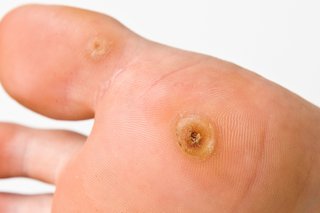
For many, a verruca will disappear in a few weeks to months. However, if they do not it is likely you will require treatment to remove them before they grow or spread. Although one small verruca can be pain-free but unsightly, a large cluster can be quite painful to walk on. Adjusting your walk to relieve the pain can lead to further foot complications. So, it is best to take action as soon as possible.
Over the counter treatment options may work for some people. However, stubborn, persistent verruca will require more appropriate specialist treatment and observation. A medical professional should review all lesions. This is very important so to rule out more serious health concerns.
Specialised treatment is often provided with minimal pain with great results. High strength acid paste or cryotherapy using true liquid nitrogen can be the most appropriate methods for nearly all strains of verrucae. Your podiatrist will advise you on the best course of action based on the verruca presentation, your lifestyle and detailed medical history.
We advised you do not begin treatment without consulting a medical practitioner first. Your Podiatrist should be the first port of call when dealing with these pesky verrucae.
For more information about our podiatry service, our foot health check-up, cryotherapy and medical pedicures.
By George Hill | Podiatrist | September 2019
Yellow Fever Update:
Recent news reports have raised concerns about yellow fever vaccine safety. It is important to understand the risks and benefits.
For decades, the yellow fever vaccine was considered to be extremely safe. More recently, however, we have become aware of a low rate of serious adverse effects occurring when older travellers are vaccinated for the first time. The two main types of adverse effects are called YEL-AVD and YEL-AND – the first involves damage to organs such as the liver, and the second damages the nervous system. Yellow fever vaccines contain live viruses that do not harm people with a normally functioning immune system but do seem to cause harm in a tiny proportion of people with an ageing immune system, as well as those with reduced immunity from other causes.
In one of the largest medical studies of yellow fever vaccine safety, the rate of YEL-AND in people aged 60-69 was 2.5 per 100,000 people vaccinated, and in over 70s was 1.6 per 100,000. For YEL-AND, the rates were zero and 4.0 per 100,000 respectively.
According to the US Centers for Disease Control, in the absence of a yellow fever outbreak, the “background” risk of yellow fever occurring in unvaccinated travellers on a 2-week trip to a zone where yellow fever is present is calculated to be:
- West Africa: 50 cases per 100,000, with 10 deaths per 100,000
- South America: 5 cases per 100,000, with 1 death per 100,000
Yellow fever vaccinating centres normally explain these risks to everyone they vaccinate, and in particular to travellers aged over 60. Vaccination for personal protection is recommended where benefit outweighs the risks, and a medical waiver is given when it is not safe for the vaccine to be used. Age alone is not a reason for issuing a waiver.
Other factors that complicate the picture include the following:
- There are active outbreaks of yellow fever in several parts of the world, notably at present in Brazil as well as in several African countries, so the risk to travellers is often much higher than that quoted above.
- Vaccination is the only way to prevent and control yellow fever and is often the only possible public health measure for entire populations.
- Many countries therefore rigorously enforce vaccine requirements as a condition of entry.
- Yellow fever vaccine shortages are common – there is currently a serious shortage in the USA, and the vaccine is not always available when needed.
- Awareness of vaccine risks has come with a stricter approach to recommending vaccine only when travellers are definitely going to be at risk; however, an unintended consequence of this has been to delay the opportunity to vaccinate travellers for the first time until they are older and at greater risk of adverse effects.
The World Health Organization now considers vaccine protection to be life-long, though border officials in several countries do not always recognise this. A small number of recent cases of yellow fever in Brazil among people who had been vaccinated previously has raised further doubt about this policy, and Brazil currently recommends revaccination every 10 years. Revaccination has not been linked to adverse effects.
There is currently extensive UK press coverage (that has also been picked up in the US) of YF vaccine adverse effects – one death occurred shortly after vaccination in a distinguished cancer researcher, and a psychotic reaction in a former BBC journalist vaccinated in Greece. Both cases were attributed to the vaccine because of the timing. Further clinical details are not available, so we can’t yet be certain of a direct link, but this news will undoubtedly have a considerable impact on public perception of the vaccine.
Written by: Richard Dawood, Medical Director and specialist in travel medicine
Book your yellow fever vaccination today.
Links:
- Cancer pioneer Martin Gore’s sudden death from routine jab – Source: The Times
- I had a yellow fever jab, then the voices told me: ‘Kill! Kill! Kill!” – Source: The Times
Bosnia is where East meets West.
It is a country on the Balkan Peninsula in southeastern Europe and has become somewhat a destination for adventurous travellers.
Beautiful Ottoman architecture, rugged mountains, captivating castles, raft-able rivers, and humble hiking trails are all reasons why travellers are choosing Bosnia as their next travel destination. The unveiling of the Via Dinarica mega hiking trail means the number of tourists to the Balkan country of Bosnia Hercegovina is expected to rise steeply. The 1930km trail provides a corridor linking traditional cultures between the former Yugoslavian nations. So whether you plan to mill about the city of Mostar, stroll the streets of Sarajevo, or take a hike in the hillside, ensure you follow our top travel tips to stay healthy.
Vaccinations
All travellers are advised to be in date with their routine immunisations, including diphtheria, tetanus and polio (DTP) and measles, mumps and rubella (MMR). Europe has seen huge outbreaks of measles this year alone, so all travellers should make sure they have received at least two doses of the measles-containing vaccination. A simple blood test can be done for all those who are unsure about their immunity. Some travellers may wish to consider vaccinations for Hepatitis A and Hepatitis B, rabies and tick-borne encephalitis. The activities you plan to do whilst travelling will determine which vaccines would be required. If you have any doubts or concerns, we also suggest booking a pre-travel consultation with a specialist travel nurse to discuss your options.
Find out more about our travel and wellness vaccinations.
Trekking and Ticks
Bosnia offers a wealth of outdoor activities. Those who plan to take advantage of the great outdoors should strongly consider vaccination against tick-borne encephalitis (TBE). TBE is a bacterial infection. Usually, it is spread through an infected tick bite. However, during Spring to Autumn, the consumption of unpasteurised dairy produce also carries a risk. Contracting the illness causes a fever with neurological complications. It is vaccine-preventable. Protection requires 2 doses of the vaccination, given at least 2-weeks apart. A third dose is given 5-12 months later to give longterm protection. You should also avoid ticks by wearing long trousers and socks. Using DEET insect repellant should also repel them.
If you spot a tick on you, it needs to be removed promptly. Use some flat tweezers or a tick remover and clean the bite with alcohol to reduce the risk of infection.
See our Ultimate Bug Kit.
Rabies
Rabies is a fatal virus that can be found in the saliva of an infected mammal. Most commonly a wild dog. Exposure can happen through a bite, scratch or a lick to an open area of the skin. You cannot catch rabies from another person and it cannot spread through unbroken skin. You should, where possible avoid contact with animals when travelling, especially wild or stay animals.
Rabies is almost always fatal once symptoms appear, but treatment before this is very effective. Pre-travel rabies vaccination offers great protection. And means that in the unlikely event you come into contact with the rabies virus, fast and effective treatment can be given easily and in the country of the incident.
Pre-travel rabies protection requires a series of 3 vaccinations given as injections into your upper arm. Your vaccines will be given over a 3-week period, or over 1 week if an accelerated course is needed, prior to travel. Travellers at greater risk are those who plan to do outdoor activities such as hiking, trekking, cycling or caving. You should consider a rabies vaccine if you plan to do any of these activities whilst visiting Bosnia.
First Aid Kit
For those trekking in the hills, packing good basic first aid kit is essential. When travelling in rural areas, access to healthcare can be limited. Travelling with a medical kit will give you access to basic provisions needed to treat minor injuries and pains.
Basic provisions include pain relief, plasters and medication to treat an upset stomach, such as loperamide and oral rehydration salts. If access to safe water may be limited, consider packing chlorine dioxide tablets. Cuts, scapes blisters and even a twisted ankle can occur, so take blister pads, some waterproof dressings and a bandage to deal with any minor injuries whilst you are there. If you take regular prescription medication, ensure you pack enough for the duration of your trip and carry the prescription with you.
Book your travel appointment today
By Anna Chapman | Travel Nurse | August 2019
Tanzania is the perfect haven for adventurous travellers. Not only does it boast three of Africa’s Seven Natural Wonders, but it is home to the ancient nomadic stewards, the iconic, Maasai people. It is also the perfect place for an African safari adventure, with it’s 16 national parks accounting for more than 30% of the country.
Tanzania is blessed with the highest peak in Africa. Mount Kilimanjaro beckons visitors from all over the world. It is the world’s highest free-standing volcano and gets an estimated 30,000 travellers attempting to summit the peak each year. Climbers by the thousands venture here to challenge themselves on its muddy slopes, rocky trails and slippery scree.
It’s crowning jewel is the island, Zanzibar. The island is famous for its mix of exotic white sand beaches, dense palm trees and coral seas. A true paradise. It hosts famous spice plantations and is rich with diverse culture. Unguja (the main island in Zanzibar) is also home to many endangered species including the red colobus monkey and green turtle.
Whether you are visiting for an action-packed safari, challenging yourself to reach the peak of Mt. Kilimanjaro or relaxing on the island of Zanzibar, ensure you follow our top travel tips to stay healthy in Tanzania.
Vaccines
All travellers should ensure they are in date with all their routine immunisations, including diphtheria, tetanus and polio (DTP), and measles, mumps and rubella (MMR).
You should consider specialist travel vaccinations prior to travel. Hepatitis A and Typhoid are highly recommended. Furthermore, some travellers may also wish to be vaccinated against Rabies, Hepatitis B and Cholera for extra precautions. Especially if travelling to more rural areas.
For more information on our vaccines, please visit our travel and wellness vaccination pages.
Yellow Fever
In Tanzania, there is no risk of yellow fever. If you are only travelling directly from the UK and back, it generally isn’t advised to have yellow fever vaccine. There is, however, a requirement for travellers to have a certificate of vaccination if they enter Tanzania from another country that has Yellow Fever. Bordering countries such as Kenya, Uganda, Rwanda, Burundi & DRC would all require a certificate. In this instance, a vaccination or a waiver certificate may be advised. It is best to speak with a specialist travel nurse, who will look at your route and access what vaccinations and certificates you would require.
Prevent Malaria
Whether you plan to visit Zanzibar or the mainland, all areas of Tanzania have a risk of malaria. Therefore, you should take anti-malarial medication. Malaria is spread by mosquitoes that are most active between dusk and dawn. A common question is whether or not you need to take them if you plan to trek Mount Kilimanjaro. Even though the risk of malaria is low in areas above 2,500m, the start and finish of the trek take you well below this altitude. In short, you should take medication to prevent it. You should take precautions to reduce the risk of being bitten in the first place.
Precautions include:
- Wear long, loose clothing
- Wear plenty of mosquito repellent with a minimum of 50% DEET
- Use clothes spray containing permethrin – you can spray before you travel for short-duration trips
- Sleep under a mosquito net
See our Ultimate Bug Kit for everything you need to keep the mosquitos at bay.
Climbing Kilimanjaro
If you are trekking Kilimanjaro, make sure your pre-travel plans take this into account. Trekking is physically demanding and exposes you to the risk of altitude sickness. The summit of the peak is 5,895m and treks can take anything from 5-9 days. Altitude sickness is unpleasant. Not only this but it can develop into something more serious and become life-threatening. Take time to acclimatise. This will reduce your risk of developing altitude sickness. Ideally, choose a longer trek. A slower ascent over more days will reduce your risk considerably. Alternatively, you can get a prescription of acetazolamide (Diamox) to aid the process. Speak to a specialist travel nurse about this at your pre-travel consultation. Don’t let altitude sickness ruin your trip.
Book your travel appointment today
By Anna Chapman | Travel Nurse | August 2019
Osteopathic manipulation, or HVT (high-velocity thrust) as it is more technically known, is the “click” that many people associate with osteopathic treatment.
It is by no means always used by an osteopath, but when it is, it can prove to be a quick, efficient, and pain-free way of restoring function to a joint.
Many patients’ conditions may not be suitable for HVT, and many may not be keen to have it done anyway. In these cases, the osteopath will treat with a whole collection of other highly effective ways. HVT should be seen as a useful tool in some circumstances, but not a be-all and end-all of osteopathy.
So how does it work?
HVT is placing a short sharp tug though a joint, most often a spinal facet (which is what we will concentrate on here), a click may or may not be heard. The noise itself is a bit of a by-product. What it is has been disputed a little but the generally accepted explanation is that when the joint is stretched, the synovial fluid inside the joint itself physically does not stretch, so gas is forced out of solution causing gas bubbles that allow the joint to gap slightly, causing the clicking noise. This also explains why another click cannot be produced for a little while until the gas has been reabsorbed.
The gapping of the joint is the key to the effectiveness of HVT.
What I must point out at this point though is that the click is not a relocation of a joint.
Barely a day goes past that someone doesn’t tell me their osteopath “clicked something back in” often assuming it was a disc. As much as it can feel miraculous like this sometimes, and a patient can often feel and be quite a bit straighter following treatment, the HVT is about restoring function to the joint, not putting it back in place. Discs especially do not just “pop back in”.
So what does the gapping achieve?
Well, here we have to get a little technical. There are three predominant effects caused by HVT as far as we can tell.
Firstly, post-contractile sensory discharge or PCSD.
Imagine that the brain keeps many muscles at a gentle tension, this allows you to hold your posture. When an area is identified as problematic (painful or inflamed etc), the brain may choose to cause the muscles around the area to spasm, often to protect the area. The spasm itself may cause further pain. This then becomes a vicious circle and dysfunction.
Tension in the muscles is controlled by spindle fibres. This is what detects the short sharp tug of the muscles in HVT. Imagine the short sharp tug as a reset for these fibres. The brain then has to determine the level of muscle tension required and often can reset to the original tension, immediately bringing the joint out of spasm.
Massage of muscles, slow stretching over a longer period, has a similar effect but unfortunately can’t be performed on the small, deep muscles directly around and holding the joint.
Secondly, pain gate theory.
Even when nerves are reporting pain in a certain area, it is important that the body can still detect a soft touch in the same area. To achieve this soft touch and position detecting nerves override deep pain detecting ones. Where you ever told to rub your knee or elbow after you bumped it and it hurt? That’s pain gate, the soft-touch overrides the deep pain. It won’t stop it completely of course but even a little relief will make it feel better. In turn, this may again stop the brain causing the area to spasm.
HVT moves the joint quickly and sharply. This causes the positional detectors to immediately report this to the brain, inhibiting the deep pain.
Thirdly, meniscoid theory.
In a joint, smooth cartilaginous surfaces rub together, but they may not be quite as smooth as we used to think. Small pieces of cartilage appear to be in the joint. Possibly to fill small gaps; craters on a moonscape is a good way to think of it. It has been suggested that when the joint spasms, these small bits of cartilage, which are attached to the capsule around the joint can become trapped out of place. Gapping the joint allows the tethers to the capsule to quickly pull them back into place.
It’s possibly worth pointing out before I finish, that although I said earlier that the click is an unnecessary by-product, I do wonder if it could be argued that the psychological effect of hearing the click could be put forward as a fourth effect. Hearing a click and knowing that it may have relieved a painful joint does often make a patient immediately relax. This may itself be part of the healing process.
Osteopathic manipulation is often a quick efficient way of relieving dysfunction of a joint. It is not a miracle cure. Many other things have to be taken into account for the osteopath to treat fully and effectively.
HVT will not immediately heal damaged tissue or disperse inflammation, but it often is a good way to kick start the process.
Book an osteopathy appointment
By Andrew Doody | Osteopath | August 2019
What is Cyclospora?
Cyclospora is a tiny, single-celled parasite, spread by contaminated food. It can cause diarrhoea, abdominal cramps, nausea, loss of appetite, bloating, gas, fatigue, mild fever, and weight loss.
Why is it in the news?
There’s been an outbreak in travellers to Mexico, with at least 204 reported cases in returning holidaymakers since June. However, it is difficult to detect using standard tests. Because it is uncommon in the UK, most labs don’t look for it and may miss the diagnosis. So the true number is probably much higher.
What’s the most reliable way of detecting it?
The best way is called a rapid PCR test, which detects the parasite’s DNA. The test also looks for DNA and genetic material from 21 other diarrhoea-causing parasites, bacteria and viruses at the same time – so there is a very high probability of finding the right cause. As you’d expect, the test is available at the Fleet Street Clinic. Importantly, we can have a result within an hour or so of receiving a sample.
How can I prevent it?
Outbreaks have been linked to eating fresh uncooked berries/unpeeled fruit and salad items that have not been washed in safe water. Sticking to foods that have been freshly and thoroughly cooked, when you travel, is the safest option.
How is it treated?
Confirmed cases can be treated with an antibiotic called co-trimoxazole. Some of the more commonly-used antibiotics for travellers’ diarrhoea may not be effective.
If you have any concerns about cyclospora and other parasites, our PCR test service can help detect the exact cause of any issue you might have. What this allows is proper diagnosis and treatment. Usually, guess-work on what bug a patient is carrying or general prescriptions to tackle the illness might be given by medical professionals. The PCR test offers accuracy like nothing else.
You can book an appointment online.
Imagine you’re holidaying in a tropical paradise, walking barefoot on the beach. Would you consider this a health risk? What if this simple, carefree activity could turn your trip into a nightmare?
Unfortunately, this is what happened to a Canadian couple in the Dominican Republic, who contracted hookworm in Punta Cana after walking on the beach without shoes.
Fleet Street Clinic’s medical director, Dr Richard Dawood, is Telegraph Travel’s medical expert and shared his medical opinion on the case in a recent article.
The article details the story of the couple, who shared their plight on social media to raise awareness of the parasitic worm infection.
Hookworm can infect humans if soil contaminated with their larva comes into contact with bare skin. Most commonly, hookworm infection can occur in Africa, the Americas, China and south-east Asia, according to the NHS.
Dr Dawood explained to the Telegraph how you can spot a hookworm infection:
“Typically there is a linear rash that follows the track of the migrating larva. It can become almost unbearable itchy, much worse than an insect bite, which is an important clue. There’s a local allergic reaction, which can then blister, making the line pattern harder to spot.”
And how to treat: “There are a number of different anti-parasitic treatments that work, either taken as tablets, or made into a cream and applied locally. The larvae can sometimes also be killed using cryotherapy to freeze them. Blisters or scratching can easily lead to infection, necessitating antibiotic treatment.”
To avoid hookworm, avoid coming into contact with soil or sand that could be contaminated. If walking on the beach, it’s advisable to wear shoes at all times!
Dr Richard Dawood at Fleet Street Clinic
Dr Richard Dawood is founder of Fleet Street Clinic in London and has practiced for over 35 years. He was one of the first doctors in the UK to establish Travel Medicine as a distinct speciality. Richard is the most senior UK travel medicine specialist working exclusively in a private setting.
You can book a travel consultation appointment online.
UPDATED RECOMMENDATIONS FOR Yellow Fever VACCINATION: Nigeria
The World Health Organization recently updated the yellow fever recommendations and requirements for residents and travellers to Nigeria.
As of 1 July 2019, the yellow fever certificate requirement for travellers to Nigeria changed. All travellers aged 9 months or over are now required to travel with a yellow fever vaccination certificate along with a valid visa. Failure to provide a valid certificate where required could deny entry to that country, or result in quarantine.
Previously a certificate was only required for those arriving from risk areas countries. However, an on-going outbreak of yellow fever, which started in September 2017, is continuing therefore a revised classification has been made. Between January and April 2019, a total of 930 suspected cases were reported in 447 Local Government Areas.
Advice for travellers
The Fleet Street Clinic would like to remind all travellers from the United Kingdom that there is a risk of yellow fever transmission throughout Nigeria.
We are a Certified Yellow Fever Centre with availability throughout the week and are usually able to accommodate same day appointments requests.
What is Yellow Fever?
Yellow Fever is an acute viral haemorrhagic disease transmitted by infected mosquitoes and has the potential to spread rapidly and cause serious public health impact. There is no specific treatment, although the disease is preventable using a single dose of yellow fever vaccine, which provides immunity for life.
For more information about Yellow Fever & the Vaccine.
Anyone travelling to Nigeria should book a Pre-Travel Consultation. One of our specialist Travel Nurses will access if a Yellow Fever vaccine is suitable for you.
Links:
World Health Organization
Japan is hosting the biggest Rugby event of the year in September.
Starting 20th September, across 12 Japanese cities, 48 matches will be played to determine the winner of Rugby World Cup 2019. Millions of people from around the world are expected to travel to Japan to attend this amazing sporting event. Much like any other reason for travelling, it does come with some health risks.
Big sporting events, like the Rugby World Cup, attract huge numbers of people which increases the risk of getting sick and spreading diseases. Venues are sometimes described as giant Petri dishes, where viruses and bacteria can flourish and spread.
But how can you prepare yourself so you remain healthy throughout your holiday?
Be prepared…
Get Vaccinated
It is advised that individuals are up-to-date with routine immunisations including diphtheria, tetanus and polio (DTP).
If you plan to venture outside of the major cities and explore Japan whilst you are there, you may need to consider some travel vaccines, such as Rabies and Hepatitis A or Hepatitis B. If those plans include visiting more rural areas, Japanese Encephalitis could be considered. For those trekking, hiking or camping, a vaccination against tick-borne encephalitis will provide protection against the disease.
MMR is a must
Ensure you are immune to measles before you travel. Japan has had multiple large outbreaks of measles this year and it is a highly contagious disease.
The best protection against measles is to ensure you have received 2 doses of the MMR vaccine. You may not have received the full course during your childhood vaccines which means you’re not fully immune. A simple blood test can determine immunity if you are unsure.
Beware of Flu Season
Flu season for the Northern Hemisphere begins in Autumn, which coincides with the start of the Rugby World Cup. It’s possible people could pick up the flu virus at these events as the Flu is a highly contagious viral disease. Transmission of the flu is always amplified when large groups of people congregate in enclosed space. People travelling to and from mass gatherings can also spread flu to other communities and to family members when they get home. An infected person can transmit the virus before even realising they are sick.
Getting a flu vaccine every year is the best way to avoid getting seasonal flu.
Those travelling from mid-September onwards should consider getting the flu jab as soon as it becomes available.
Find out more about our travel and wellness vaccinations.
Minimize Your Risk
Besides the flu vaccine, here are a few tips on how to minimize your risk of contracting an illness at the Rugby World Cup:
- Keep a distance from people coughing and sneezing – droplets from coughs or sneezes containing flu virus can travel at least 3 feet, so keeping this distance from sick people can help lower your chance of becoming ill.
- Wash your hands often, before eating or after contact with sick people, public places and bathrooms to limit your chances of contact with the virus.
- Carry hand sanitizer to use when hand washing is inconvenient or not available. Ensure it has a minimum of 60% alcohol content to be most effective.
- Avoid touching your mouth, nose and eyes with your hands.
- Use clean, disposable tissues to wipe your mouth or blow your nose. Throw away used tissue immediately after use.
- Avoid getting overly cold and wet by wearing appropriate clothing.
- if you are already sick, wear a face mask to help lower the chance of spreading your illness to others.
First Aid
Despite having a good reputation for health care, it’s worth being prepared for minor illnesses and injuries when travelling abroad. Pack an essential First Aid Kit for your travels and include some basic items such as pain relief, plasters, antiseptic creams and something to treat minor wounds. Being able to treat minor accidents whilst abroad means less time hunting down a pharmacy or time wasted visiting a doctor should you need it.
For convenience, we sell a ready to go Essential First Aid Kit, available online.
You can book a pre-travel consultation online.
Greenland is home to truly magnificent mountainscapes and glaciers.
Jakobshavn Glacier, the world’s fastest-moving glacier in the Northern Hemisphere can be found here.
In the Winter, tourist travel to this wonderland to potentially see the wondrous the Northern Lights. Things are quite different in the Summer.
Chasing the Midnight Sun
Summer in Greenland is an image not often associated with the country. Summertime offers eternal light in the land of ‘The Midnight Sun’ whereby the day has neither a beginning nor an end. Those wanting to experience this time-shifting experience must travel north or the Arctic Circle. The low-lying sun makes the surrounding scenery appear almost dreamlike; icebergs and hilltops are bathed in a surreal palette of pink, purple, yellow and red. Travellers to Greenland have options of hiking the land or sailing the fjords between icebergs.
If you plan to travel to Greenland this summer follow our top travel tips to ensure you stay healthy.
Vaccinations
Even though Greenland resides in the Arctic Circle, travellers should still ensure they receive appropriate pre-travel vaccinations. This includes being up-to-date with Measles, diphtheria-tetanus and polio. Greenland has a high risk of Rabies, a virus spread through the infected bite of a mammal. Travellers who plan to trek inland may wish to consider this vaccination before they travel to reduce the risk.
Suncare
Despite Greenland having long, dark winters, the summer months provide almost constant light. Bright sun, combined with the effects of lights reflection from snow and water can increase the risk of sun damage from UV light. Despite temperatures remaining cold, travellers still need to be sun smart. Ensure you wear a high factor SPF, and use lip balm to prevent cracking. Polarised sunglasses that wrap around will prevent the UV rays causing damage to your eyes.
Sea Sickness
Many activities in Greenland involve taking to the water and visiting the infamous Disko Bay in search of Icebergs. Sometimes the seas can be rough which can make for a miserable time if you are prone to travel sickness.
Sea Sickness can be reduced by:
-
Sit in the centre of the boat where the motion will be less aggressive
-
Close your eyes or focus on a point on the horizon, this can help your inner ear balance.
-
Avoid alcohol and large heavy meals, instead, keep hydrated on water and eat smaller lighter meals
-
Sucking on a mint or ginger sweet can help with nausea
-
Seas Sickness medication tablets
-
Patches that can be used to prevent sea-sickness
Trekking
Parts of Greenland can be remote so taking a good First aid kit with you is essential. Basic provisions include pain relief, plasters and medication to treat an upset stomach, such as loperamide and oral rehydration salts. If you take prescription medication to ensure you pack enough and carry the prescription with you. If you plan on trekking the hinterland, pack additional items such as blister dressings and plasters.
Book your travel appointment today
By Anna Chapman | Travel Nurse | July 2019
June to September is the best months to trek to Machu Picchu, although you can visit all year round. The weather is at its driest and coolest with gloriously sunny days. Trekking to the roof of the Andes is a rewarding experience that many travellers to Peru sign up for. Travellers who are trail-blazing their way on the Inca road to catch a glimpse of the forgotten city should follow our top travel tips to ensure they stay healthy on the road.
Vaccinations
All travellers to Peru should ensure that they are up-to-date with measles, diphtheria, tetanus and polio (DTP), and have received vaccinations against Hepatitis A and Typhoid. There is a risk of Rabies and Hepatitis B in Peru, and all travellers attempting the Inca Trail should consider vaccinations against these.
There is no risk of Yellow Fever on the Inca Trail or Cusco. However, the vaccination may be recommended to travellers who are doing further travel in Peru, such as the Amazon rainforest. Those planning to extend their trip to South America may require the Yellow Fever vaccination for personal protection. Additionally, you may require a valid yellow fever certificate to enter some other countries. It is best to book in a travel consultation with our specialist travel nurses to discuss your route.
Altitude Sickness
The highest altitude of the Inca trail is 4,215m, a whopping 1,800m higher than Machu Picchu itself! Most people start the hike from Cusco which lies at 3,400m, meaning trekking this wonder of the world poses a real risk of altitude sickness. Altitude sickness is unpleasant and can develop into something serious and become life-threatening. It is best avoided by taking time to acclimatise. Ideally, if you are arriving from sea level, spend a few days in Cusco before your trek begins to adjust to the different altitude. Choose a longer trek, a slower ascent over more days will reduce your risk considerably. Alternatively, you can get a prescription of acetazolamide (Diamox) to aid the process. Speak to a specialist travel nurse about this at your pre-travel consultation. Don’t let altitude sickness ruin your trip.
Stay Hydrated
Treks on the Inca trail usually last around 5 days, meaning that an average trekker will probably consume at least 15 litres of water over the course of their trek. Unclean and unsafe drinking water can lead to sickness and diarrhoea so it is important that travellers have access to safe water. Carrying 15 litres of water on the trail is a near impossibility so travellers should ensure that they have a way to make water safe to drink. Carrying water purification tablets, or a bottle with a filter can ensure you have access to safe drinking water throughout.
Travellers Diarrhoea
Travellers diarrhoea and other common gastrointestinal infections can put a dampener on any adventure but especially when hiking. Access to toilets is likely to be limited throughout your journey so it is important to stay healthy. Ensure all food you eat is thoroughly cooked. Pack an alcohol hand gel so you can keep your hand clean before you eat and after using the toilet. It is wise to carry medication with you, so, if you do become unwell you have doctor-approved medication available to take. We recommend packing one of our Worldwide Gastro Kits. Inside there is medicine to prevent and treat travellers diarrhoea, dehydration, mild infections, nausea and vomiting. Hopefully, you won’t have to use this kit, however, for peace of mind, it is better to be safe than sorry.
Foot Health
The Inca trail typically consists of between 6-9 hours of walking a day, with shared tent accommodation. Hiking the Inca Trail through the Sacred Valley to Machu Picchu is both arduous and awe-inspiring. Make sure you have good walking boots that are broken in before you start. Book an appointment with a podiatrist and osteopath if you have any niggles or pain before setting off. Take care of your feet throughout your adventure – keep them clean and dry to avoid problems. Any blisters should be cleaned and covered with a dressing to prevent pain and infection. Pack your own first aid kit with some basic medications for pain, allergies and upset stomachs in case you do become unwell. Access to medical supplies will not be until Aguas Calientes at the end of the trek. You can buy a Fleet Street Clinic Essential First Aid Kit online to save you the hassle of assembling yourself. We would recommend considering a medical pedicure upon your return. Treat our feet a little bit of TLC for taking you on an adventure of a lifetime.
We would encourage all those taking on the Inca trail adventure to consider booking a travel consultation with either myself or another of our specialist travel nurses. We all have extensive knowledge on what vaccines and health precautions you should take on an individual basis to remain healthy throughout your adventure. Chances are at least one of us has done a similar adventure so we can give you some first-hand experience on what to expect too!
Book your travel appointment today
By Anna Chapman | Travel Nurse | July 2019
The health of both our planet and its people is, without doubt, one of the most important issues of our time. Maintaining healthy wellbeing has been in the public eye for some time now, particularly the topic of how to achieve good mental health. Chinese medical thought and acupuncture treatment can help us understand what we can do to help ourselves to achieve and maintain good health. Its teachings encourage us to inhabit our body, to connect to and to nourish our physical self and the physical world around us. This physical basis provides the root of our mental and emotional well-being.
A holistic treatment
Where Western Scientific Medicine has gone down the microscope to discover the minutiae workings of the human body (cells, biochemicals, genes), the understandings of Chinese Medicine, developed over thousands of years, have focused on how the body systems work together. It observes a person in their environment, their lifestyle, their posture… to understand the causes of ill-health, and the symptoms that arise to alert us to this. The whole body-mind is considered, and treated, to bring us back to good health and well-being.
A leap of faith for our Western minds
Acupuncture is a leap of faith for our Western minds. The concepts on which it is based do not exist in Western thought. You can’t cut open the body and find the meridians which form the energetic framework of the human body, or the Qi (pronounced ‘chee’, meaning energy) which flows through this network to motivate our physiological processes. Similarly, you can’t cut open a light bulb and find electricity. Likewise, you cannot cut open a computer and find cyberspace. It doesn’t mean that these things don’t exist. Proof of their existence lies in their application and the same is true of acupuncture treatment. Only through experiencing acupuncture for yourself will you be able to judge its true value.
Acupuncture helps reduce stress
Acupuncture is often described as incredibly relaxing, regardless of what a person seeks treatment for. Furthermore, most patients report an improvement in energy levels, sleep and a feeling of general well-being.
Acupuncture helps calm the nervous system. As a result, it helps switch off the ‘Fight-Flight’ stress response. Fuelled by adrenaline to keep us alert and primed for action, the stress response helps us to achieve. It is a useful tool for success. If the stress reaction is prolonged and not switched off, problems start to arise.
Heart rate increases, breathing quickens, muscles tighten, blood pressure rises .. it is perhaps not surprising that stress-related ailments are estimated to account for 75-90% of all doctor’s visits. By calming the body and promoting parasympathetic activity, Acupuncture helps improve circulation and reduce general muscle tension. This enhances all body functions not concerned with immediate survival – immunity, digestion, fertility, rest, recovery, repair. Generally speaking, the results note an overall feeling of relaxation and well-being.
Acupuncture helps manage day-to-day ailments
Our Acupuncturist, Diane, has 25 years experience in Chinese Medicine. She treats a wide variety of day-to-day ailments. Including headaches, IBS, anxiety, infertility. As well as the musculoskeletal pain, which acupuncture is most famous for. Why not book an appointment today to see how acupuncture can help you improve your health and well-being?
If you think you could benefit from acupuncture, you can book your appointment online.
By Diane Timewell | Acupuncturist | July 2019
The Southern African nation, Mozambique is gaining popularity amongst the adventure traveller community. Often referred to as ‘The Pearl of the Indian Ocean’, it is well off the usual tourist trail of Africa. Mozambique offers rustic beaches, delightful architecture, superb national parks, and plenty of diving opportunities.
Many choose to start their adventure exploring the capital city, Maputo. It is easy to understand why. It is rich in culture with beautifully preserved Portuguese colonial architecture. You could easily spend a week enjoying the hospitality of the friendly locals, eating the delicious food and partying the night away. Maputo is a largely-underestimated African capital city.
Mozambique is also known for having some of the most pristine dive sites in the world. Tofo is arguably one of the greatest places on Earth to see megafauna marine life. Crystal clear water provides perfect visibility to view the abundant marine life. The beautiful tropical Islands of the Bazaruto and Quirimbas Archipelagos are some of the most romantic and secluded beach destinations in the world – ideal for honeymooners.
Whatever your holiday entails, ensure you read out top travel tips to stay healthy in Mozambique.
Vaccinations
Travellers should ensure they are up-to-date with their routine immunisations including measles, mumps and rubella (MMR) and diphtheria-tetanus and polio (DTP). Additional travel vaccinations are advised including hepatitis A, typhoid, rabies and hepatitis B. It’s best to speak with a travel nurse about any specific travel vaccinations you may need in a pre-travel consultation.
For more information on our vaccines, please visit our, travel and wellness vaccination pages.
…What about Yellow Fever?
Yellow Fever is a viral haemorrhagic illness spread from the infected bite of the Aedes mosquito. Whilst it can occur in parts of Africa, there is no risk of Yellow Fever in Mozambique. Therefore, travellers do not need to be vaccinated.
The only exception to this will be for travellers who are entering Mozambique from a country which does have a risk of the illness. In this case, it is best to speak to a travel nurse to see if you require the vaccine. If you do, you will need to be in possession of a Yellow Fever Vaccination certificate as a condition of entry. Ask your travel health specialist for advice.
…And Polio?
Polio is a viral infection. As it is contagious, you can get polio from contact with an infected person. In addition, consuming food or water that has been contaminated by a person with poliovirus also puts you at risk. There has been a worldwide effort to eliminate polio, which is proving highly successful. However, Mozambique still remains at risk due to vaccinate-derived circulating strains. All travellers should ensure they are up-to-date with their polio immunisation. The polio vaccine is a combination vaccination, given with diphtheria and tetanus. It provides protection for 10 years.
If you plan to stay for longer than 4 consecutive weeks, it’s advised that your polio vaccine be administered within the last 12-months. You should also have the dose recorded on an International certificate of vaccination prophylaxis card as proof of immunisation. Furthermore, long-term travellers to Mozambique may be required to show this when they leave the country, as proof they have been immunised.
Malaria
All of Mozambique has a risk of malaria. Malaria is an infection spread by the Anopheles mosquitoes which are most active during dusk till dawn. You should take strict precautions against mosquito bites. This includes wearing long loose clothing and using an insect repellent with a minimum of 50% DEET. You can reduce the risk of indoor mosquito activity with the use of plug-in vaporisers. Plus, sleeping under a mosquito net can help reduce night-time bites.
We recommend taking antimalarial medication for the duration of your trip. As there are different options available, it’s best to speak to a travel nurse to find the best option for you and your family.
See our Ultimate Bug Kit.
Special precautions post-Cyclone Idai
Cyclone Idai battered the coast of Mozambique on the 9th March 2019. The storms brought heavy rains, winds and flooding. As a result of the initial impact alone, there were hundreds of fatalities. The storm created many serious health risks. Firstly, like most natural disasters, the storm has displaced a huge number of local people. Which as a result, will increase the risk of diseases spreading. Secondly, it has placed a strain on the countries structural and health infrastructure. Which as a result, and can lead to further flooding and increases the risk of water-borne infections such as cholera. Thirdly, the increase of water has led to an increase in breeding sites for mosquitoes. Therefore, there is an increased risk of malaria and other mosquito-transferred diseases.
Although the risk for tourists will be much lower than that of the local population, extra precautions to avoid infectious diseases should be taken. You should pay extra attention to the food and water hygiene you consume. This will minimise the risk of you getting a diarrhoeal illness.
If you are travelling to an area with a known outbreak, the Cholera vaccine can be considered. Similarly, those undertaking humanitarian work or those with inadequate access to safe water and sanitation should also consider the vaccine.
Book your travel appointment today
By Anna Chapman | Travel Nurse | July 2019
THE WORLD HEALTH ORGANISATION (WHO), HAS REPORTED THAT POPULATION EXPOSURE TO HEAT IS INCREASING DUE TO CLIMATE CHANGE.
The WHO states, ‘global temperatures and the frequency and intensity of heatwaves will rise in the 21st century as a result of climate change’. Extended periods of heat exposure during the day and night time can increase the amount of physiological stress on the human body.’
The stress caused by heat exposure exacerbates the top causes of death globally. This includes respiratory and cardiovascular diseases, diabetes mellitus and renal disease.
They go on to state, ‘Exposure to excessive heat has wide-ranging physiological impacts for all humans, often amplifying existing conditions and resulting in premature death and disability.’
With the temperature said to continue rising, the WHO also states, ‘Awareness remains insufficient of the health risks posed by heatwaves and prolonged exposure to increased temperatures.’
So, who is most affected by heat exposure and how will it impact your health?
Who is affected?
Rising temperatures affect the whole population. However, some populations are more vulnerable to exposure to excessive heat. Those include:
- Elderly people
- Infants and children
- Pregnant women
- Outdoor and manual workers
- Athletes
- Poorer communities
How does heat impact health?
With rapid increases in external temperatures, the body will struggle to regulate our internal temperatures. The knock-on effect of this can result in a number of heat-related illnesses such as heat cramps, heat exhaustion, heatstroke, and hyperthermia. Reported small differences in the seasonal changes have been reported to have increased the number of heat-related illness and even death. Rising temperatures can also worsen chronic conditions such as cardiovascular, respiratory, and cerebrovascular disease and diabetes-related conditions.
What actions can you take to stay cool?
- Aim to keep your living space cool. WHO suggests ‘below 32 °C during the day and 24 °C during the night’
- If it is safe, open your windows at night time to cool your living space.
- Stay out of the heat by staying in the shade and avoiding going outside during the hottest part of the day.
- Take cool showers and wear loose-fitting clothing.
- Drink regularly and avoid alcohol and caffeine.
- Check on vulnerable family members who may be affected by the heat.
What to do if someone shows signs of a heat emergency?
It is extremely important to know what to do when someone is showing signs of heat illness. Everyone should know how to respond to heat emergencies, this can be learnt in first aid courses.
If one of your family members or someone you assist is showing signs of hot dry skin and delirium, convulsions and/or unconsciousness, call a doctor/ambulance immediately.
Whilst you are waiting for help to arrive place them in a cool place in a horizontal position and elevate their legs. It is now important to initiate external cooling.
This can be done by:
- Removing clothing
- Placing cold packs on the neck and groin
- Spraying cool water on their skin
- Fanning them
- If they are unconscious, place them on their side
If you or someone you are with is displaying mild signs of heat illness that is not considered an emergency, you might want to consider a same-day GP appointment. You can book an appointment online.
Have you ever thought of applying sunscreen before taking a flight?
If not, you may want to reconsider.
A recent article in the Telegraph Travel with contribution from Fleet Street Clinic’s medical director, Dr Richard Dawood, has highlighted a study published in the Journal of the American Medical Association (JAMA) Dermatology. It reports that pilots flying for about 56 minutes at 30,000 feet were exposed to the same amount of carcinogenic UVA radiation as one would receive 20-minute session on a tanning bed.
The plane’s windshield blocked only about half of the UVA rays, dangerous enough to contribute to cancer risk.
However, applying this potential risk to all types of aircraft and to the cabin space outside the cockpit is “a bit speculative”, notes Dr Dawood. The aforementioned study was based on UV radiation measured from the cockpit of a Socata TBM850, a single turbo-prop private plane.
“Awareness of the issue is a good thing – especially for pilots; and for passengers, sensible use of window shades to avoid strong direct sunlight, which most people probably do anyway,”
– says Dr Richard Dawood.
For more travel advice, contact our expert travel team at Fleet Street Clinic – you can book an appointment online.

Planning a trip abroad?
Whether you’re travelling afar for business or pleasure, the long-haul travel involved can be a daunting prospect. But with a little preparation you can enjoy a comfortable journey, and prevent the health risks associated with travel.
At Fleet Street Clinic, we regularly see frequent travellers for travel health-related consultations and vaccinations. Our travel experts have compiled some tips to ensure you are in great shape throughout your travels, starting with a healthy outbound flight:
Deep Vein Thrombosis (DVT)
Travelling on long-haul flights with extended periods of immobility can leave you at an increased risk of DVT (blood clots), especially if you have any pre-existing conditions.
To prevent DVT during your flight:
- Wear loose comfortable clothes.
- Keep moving during the flight – get up regularly to walk around the cabin to aid circulation.
- Keep hydrated by drinking plenty of water- drink at least one cup of water for every hour spent in the air.
- Avoid alcoholic and caffeinated drinks.
- Wear compression socks which apply gentle pressure to the ankle to help with blood flow.
Dehydration
Air in the plane’s cabin is recirculated, which results in a loss of moisture. This can cause dry skin, lips, and eyes.
To prevent dehydration:
- Contact lens wearers should remove lenses prior to travel and wear spectacles to avoid dry eyes and prevent damage to the cornea.
- Dry skin should be moisturised, and if nasal irritation occurs, a saline spray can be used.
- Keep hydrated – don’t be afraid to ask cabin staff for water outside of mealtimes.
Travel / Motion Sickness
Motion sickness occurs when there is confusion between what the eyes see, and what the inner ear senses. With turbulence, cramped spaces and lack of fresh air, susceptible travellers can suffer.
To minimise the risk of travel sickness:
- Keep hydrated.
- Avoid large meals prior to and during the flight.
- Request a seat near the front wing – the most stable part of the plane.
- Use preventative medication such as Cinnarizine (to be taken 2 hours prior to boarding the aircraft).
Jet Lag
Flying can leave you feeling sleep deprived and jet lagged.
To reduce avoidable risks and arrive at your destination in good shape, here’s how you can prevent or combat the effects:
- Avoid night-time flights when possible – otherwise make sure you build a rest period into your schedule on arrival.
- Give your body clock clues as to your new time zone – adjust your watch, observe local mealtimes and bedtimes.
- Use melatonin and timed exposure to bright light – talk to your doctor or consult a specialist travel clinic about using medication to aid both sleeplessness and wakefulness.
- Use our Jet Lag Calculator – whether you’re using timed exposure to bright light, melatonin, both or none of these methods, our calculator can calculate timings based on your exact travel details.
Book An Appointment
If you’re taking a long-haul flight and need travel vaccines or advice, you can book an appointment online to ensure a smooth transit to your destination.
Approximately 1 in 4 people in the UK will experience a Mental Health problem.
Unfortunately, how we cope with mental health problems, in general, seems to be getting worse.
Leading to an increased number of self-harm and suicide victims. Spotting early warning signs in the workplace and helping those who may be experiencing workplace problems is an extremely important part in reducing the number of deaths by mental ill health each year.
Stress, anxiety and depression are the biggest cause of sickness absence in our society. At Fleet Street Clinic, we believe in creating safe, healthy workplaces where mental health and physical health of employees are valued equally. Therefore, we believe that investing in mental health first aid training, much like physical first aid training should be part of everyone’s corporate wellbeing strategy.
The Fleet Street Clinic will be running a two-day Mental Health First Aid course delivered by Leigh Mckay. This course is designed for all employees, line managers, HR professionals, OH workers and senior leaders alike who wish to become a qualified mental health first aider. By training your staff you’ll be joining a global movement of over 3 million trained Mental Health First Aiders across 25 countries.
Leigh is a quality assured MHFA instructor accredited by the Royal Society of Public Health. She has a particular interest in psychology and emotional resilience. Leigh has a wealth of experience in delivering the MHFA courses in corporate companies. Plus, she advocates that a workplace and community that promotes wellbeing can have a positive impact on everyone’s physical, mental and emotional health.
What is Mental Health First Aid?
Mental Health First Aid (MHFA) is an Internationally-recognised training course. It teaches people how to spot the signs and symptoms of mental ill health. MHFA won’t teach you to be a therapist, however, just like physical first aid training, it will teach you to listen, reassure and respond, even in a crisis.
A quality assured instructor will deliver the adult MHFA courses, which are for everyone aged 16 upwards. All instructors attend an Instructor Training programme accredited by the Royal Society for Public Health. Therefore, they are specifically trained to keep people safe and supported whilst they study this course.
What will I learn?
Learning will take place through a mix of group activities, presentations and discussions. Throughout the course, you will gain practical skills and awareness about mental health.
This includes:
- A deeper understanding of mental health and the factors that can affect people’s wellbeing, including your own
- Practical skills to spot the triggers and signs of mental health issues
- Confidence to step in, reassure and support a person in distress
- Enhanced interpersonal skills such as non-judgemental listening
- Knowledge to help someone recover their health by guiding them to appropriate support
How will attending an MHFA course help?
There are many benefits to taking part in an MHFA course. Firstly, research and evaluation have shown this course raises awareness of mental health literacy. The more understanding and knowledge about mental disorders lead to better recognition, management and prevention. Secondly, this reduces the stigma attached to ill mental health, especially in the workplace. Further, this course champions its students to increase their confidence in handling mental health issues. But, most importantly, it promotes early intervention. Above all, becoming a Mental Health First Aider can enable the recovery of a sufferer and even save lives.
Course Details:
Date: Thursday 26th & Friday 27th September, 2019
Location: 29 Fleet Street, London, EC4Y 1AA
Cost: £350 per person
Spaces are limited.
To book yourself and/or a colleague on to the Mental Health First Aid course, please email to our Corporate Manager, Caroline McKenzie here.
A safari in Namibia is a unique experience in Africa. It has the highest sand dunes on the continent, the world’s oldest and uninhabited deserts, the Skeleton Coast and a lush jungle to the north. Whatever you have planned on your trip, ensure you follow our top travel tips to stay healthy.
Vaccines
All travellers need to ensure they are up-to-date with Hepatitis A, Typhoid and Diphtheria, Tetanus and Polio (DTP). These are your basic traveller vaccine requirements. You may wish to consider further vaccinations against Rabies and Hepatitis B.
There is no risk of Yellow Fever in Namibia, however, travellers who will arrive in Namibia having transited from a country with a risk of Yellow Fever will be required to be in possession of a valid Yellow Fever Certificate.
Countries this would apply to include Kenya, Nigeria, Zambia, Ethiopia, Brazil, Peru and Bolivia. For the full list of countries with risk of yellow fever transmission as per the World Health Organisation.
For more information on our vaccines, please visit our travel and wellness vaccination pages.
Malaria
There is a risk of malaria in the northern areas of Namibia of the Kunene River, Caprivi and Kavango regions and Etosha National Park. Windhoek, Swakopmund and the Skeleton coast have a low risk of malaria. If you intend to visit malarial regions, ensure that you take the antimalarial medication with you. Mosquitoes that are responsible for the spread of malaria are most active between dusk and dawn, and therefore you need to be extra cautious during this time against mosquito bites.
Insects
Ticks, flies and mosquitoes all have the ability to transmit unpleasant disease in Namibia. The best prevention against these diseases is to avoid mosquito bites. Cover up as much as possible and apply a minimum concentration of 50% DEET to any areas of exposed skin. Clothes can be treated with permethrin before setting off to provide an extra level of protection. Sleep under a mosquito net especially if you plan to stay anywhere remote or rural.
See our Ultimate Bug Kit.
Food and water
Travellers should exercise caution with food and water when travelling to Namibia to avoid tummy troubles. Do not drink tap water in Namibia, stick to bottled water or water that has been boiled. If you are undertaking a self-drive trip and plan camping in remote areas it is a good idea to take either a water bottle with a filter or some chlorine dioxide tablets to make water safe to drink should you not be able to find a shop with bottled water. The Namib Desert is one of the aridest in the world so always ensure you pack extra water.
See our Worldwide Gastro Kit to help with any travellers tummy troubles.
Book your travel appointment online today.
By Anna Chapman | Travel Nurse | June 2019
How to Cope During a Heatwave
The UK is currently experiencing a heatwave with temperatures rising to 35 degrees in some parts of the country this week. While sunshine is welcome and the vitamin D is much needed, too much heat can lead to illness. To avoid any heat-related sickness, make sure you are well-prepared! Follow Fleet Street Clinic’s tips to help keep safe during the hot weather.
Risks During the Heat:
- Exposure to such high temperatures increases sweating, and results in loss of fluid and electrolytes causing rapid dehydration. This can result in heat exhaustion or heatstroke which can be life threatening if not dealt with promptly.
- The highest risk groups are the elderly, babies, children and those with pre-existing medical conditions.
- If you engage in strenuous physical activity this will increase the risk of illness related to the heat.
Top 7 Tips For Beating the Heat
- Seek shelter and shade during the middle of the day (11am -3pm).
- If you are outside, ensure you protect your skin against the sun with a high factor sun cream, hat and sunglasses.
- Wear loose fitting, light-weight and light colour clothing.
- Keep hydrated by drinking plenty of fluids and eating food with a high water content (such as fruit).
- Ensure you are taking in sufficient salt in your diet (sweating leads to electrolyte and salt depletion).
- Avoid caffeine and alcohol, which can worsen heat-related illness.
- Heat stroke can be a life-threatening emergency and medical help should be sought.
About Fleet Street Clinic
Fleet Street Clinic is an independent healthcare practice in London. For more advice or to book an appointment with our expert medical team, you can book online.
Glastonbury has been going for over 50 years and is back this year following a fallow year last year.
Whether you are a festival first-timer or a seasoned Glastonbury veteran, make sure you follow our top tips on how to stay healthy during festival season.
First things first, facilities…
A major part of festival fun is the back to nature approach to living, so do expect basic living facilities. Facilities at festivals are confined to porta-loos, long drops and communal showers; a perfect breeding ground for bugs. Dodge the diarrhoea by following some simple rules. Wash your hands where possible, especially before eating and always after the toilet. If running water isn’t available, use hand wipes or hand sanitiser. Pack your own pocket-size alcohol hand gel for when you are on the go.
The Vaccines…
Don’t be fooled into thinking vaccinations are only for those far-flung destinations. Glastonbury is the largest greenfield festival in the world and over the course of a week, home to over 175,000 people. Crowded spaces and shared living areas increase the risk of infectious diseases spreading. Many of which are entirely vaccine preventable. Measles and mumps cases have been on the rise in the UK, so festival goers should check they have received at least 2 doses of the MMR vaccination to ensure they are protected. If there is any doubt you can get immunity tested to put your mind at ease. Young adults and children can also be particularly vulnerable to meningitis, so if you are in this group, make sure that you have also received the recommended Meningitis ACWY vaccination.
You can find more information on all our vaccinations here.
Eat, drink and be merry…
It is estimated that an average festival goer burns around 9,000 calories and walks over 15 miles. Make sure you fuel your festival by eating plenty, especially if you are drinking alcohol. Keep hydrated and ensure you drink plenty of water to prevent dehydration, especially on those (potentially) hot days.
Come rain or shine…
Glastonbury has seen it all: heatwaves, rain, floods, cloudless skies. The Great British weather is never predictable and exposure to extreme weather can cause anything from hypothermia to heat stroke. Be prepared for all eventualities. Take warm waterproof clothes that will dry quickly in case of wet weather. Pack cool, light coloured clothing to help you keep cool in the sun. Pack a hat and some good suncream and make sure you wear it! Shady areas are few and far between if you are centre stage for the day, and without sun protection you could end up with sunburn, or worse, heat stroke. You can lean more about staying safe in the heat here.
STI’s
Don’t run the risk of sexually transmitted infections if you decide to go beyond social intercourse. The best way to prevent infections such as chlamydia and gonorrhoea is to use condoms. Some STI’s can take several weeks to present themselves, and in some cases are asymptomatic (display no symptoms at all). It is quick and easy to get checked for STI’s, so if you have any concerns when the festival is over, make sure you get tested.
You can book appointments for all our services online.
Parents are being urged to get their children vaccinated for measles, mumps and rubella following outbreaks of measles across Europe:
Anyone who is eligible to get vaccinated should get the MMR vaccine.
A measles outbreak across Europe has left UK officials urging parents to get their children vaccinated for measles, mumps and rubella. As measles is highly infectious, anyone who has not received 2 doses of the MMR vaccine is at risk. Particularly those unvaccinated people travelling to countries where there are currently large outbreaks of measles.
In the first three months of this year, there have been 231 confirmed cases of measles and 795 of mumps. While Public Health England (PHE) figures showed while measles cases were lower than the 265 reported during the same period last year, they had more than doubled compared to the 97 reported between October and December. The number of mumps cases has nearly tripled compared to the 275 cases during the first three months of 2018. No new cases of rubella have been reported.
PHE has now appealed to parents to make sure their children receive the MMR vaccine when it’s offered, or to get a GP appointment booked if they missed it. Officials have also warned that not only is measles highly contagious, but it can also kill a child if they are not vaccinated. Anyone who has not received two doses of MMR vaccine is at risk of measles as it is highly contagious.
There have been 3,789 cases of measles in Europe during the first three months of this year, according to the European Centre for Disease Prevention and Control. The highest numbers were in Romania, France, Poland and Lithuania.
Advice for travellers
For all those planning to travel to Europe, make sure you are up-to-date with all currently recommended UK vaccines. This includes two doses of the MMR vaccine for protection against measles, mumps and rubella.
Anyone who is not sure if they are protected should check with their GP practice. Vaccination is usually done within your childhood vaccinations. However, the MMR vaccine is available to all adults and children who have not had their two-dose course. In some cases, the MMR vaccine can be offered to babies from six months of age. Cases such as travelling to countries where measles is common, or during an outbreak situation. Book a travel consultation with our travel nurse for advice on the best option for your children before you travel.
Head of immunisation at PHE, Dr Mary Ramsay, warned with measles outbreaks across parts of Europe, families should make sure they are vaccinated before travelling. ‘There are measles outbreaks happening across Europe so if you are planning to travel, make sure you check with your GP and catch-up if needed.’
Herd immunity
Measles elimination can only be sustained by maintaining and improving coverage of MMR vaccine in children, and by using all opportunities to catch up older children and adults who missed getting the MMR vaccine.
To achieve herd immunity for measles at least 90 to 95 per cent of the population needs to be fully protected. PHE said 94.9 per cent of eligible children aged five received their first dose of MMR in quarter 4 of 2018. However, the second dose of protection falls to 87.4 per cent for children aged five.
Fleet Street Clinic’s medical director, Dr Richard Dawood explains, ‘When the rate of vaccination in the general population falls below 95%, outbreaks occur and can easily spread, with the highest impact on those most vulnerable populations, undermining years of hard work around the world to bring measles under control.’
Vaccination against Measles, Mumps & Rubella
One dose of the MMR vaccine is about 90 to 95 per cent effective at preventing measles. Protection rises to around 99 per cent after the second dose. Two doses of MMR in a lifetime are needed for a person to be considered fully protected.
The MMR vaccine schedule:
- Two doses, to be given at least 4 weeks apart.
- If the first dose is given before 12 months of age (due to the need for early protection), this should be discounted and the child should continue to receive 2 doses as per the normal schedule.
- The vaccine is also available to all adults and children who are not up-to-date with their 2 doses.
Anyone who is not sure if they are fully vaccinated should check with their GP.
You can book all vaccination appointments online.
Travel nurse Anna takes us on a journey to Tel Aviv. A city on Israel’s Mediterranean coast steeped in history and a vibrant cultural scene. From vaccinations to sun protection follow the top tips to travel safely.
Vaccines
All travellers are advised to ensure that they are in date with their routine vaccinations. Measles outbreaks have been reported in Israel since September 2018, and there are concerns that the increase of travellers heading to Israel for Passover in mid-April could see cases rise. Travellers should ensure that they have received two doses of measles vaccination (often referred to as the MMR) prior to departure.
Other travel vaccinations to be considered are diphtheria, tetanus and polio, and Hepatitis A. Some travellers may also wish to consider vaccinations against Hepatitis B and Rabies. It is always best to discuss which vaccinations are necessary for your trip with a travel nurse.
However, vaccinations cannot protect you from many diseases and dangers in Israel, the risk can be reduced through your behaviours…
Sun
Israel lies within the sub-tropical region with a Mediterranean climate. Summer temperatures can reach 40 degrees Celsius, and even higher in the Negev desert. Don’t let the Mediterranean summer breezes deceive you and stay sun safe. Keep hydrated, wear a high factor sunscreen and avoid the suns rays between 11am-3pm when at its strongest.
Food and Water
Israel is foodie heaven but travellers should still maintain good food and water practices to avoid tummy trouble whilst away. Avoid tap water and ice made from tap water: stick to bottled water. Ensure you wash your hands thoroughly before eating and after using the toilet. Ensure all food you eat is cooked thoroughly and served straight to you. For those who would still like the freedom to eat and drink without worry, it is advisable to carry a gastro kit with you. Inside will be various medications that can assist with travellers’ diarrhoea, should it occur.
Insects
Mosquitoes and sand flies can be particularly problematic during the summer months. Not only can their bites cause irritation, but they can also spread diseases such as West Nile Fever, dengue fever and leishmaniasis. There are no specific vaccinations and preventative treatments for these diseases, and bite avoidance is the only way. Try and cover up especially between dusk and dawn, and wear a good insect repellant that contains at least 50% DEET.
See our Ultimate Bug Kit.
From Red to Dead…
From the riches of the coral seas in the red to the abyss of the dead sea, take sensible precautions when taking the plunge. The dead sea lies 413m below sea level and is actually rather tricky to swim in. Tourist usually come to float on its surface as the high salt content makes it hard to submerge. Be careful. Cover any cuts you have with waterproof plasters to avoid a sharp sting. Do not splash when in the water, as it may cause injury or irritation to your eye if it enters. If you wear contact lenses, it’s best to swap to your glasses.
You can book all vaccination appointments or travel consultations online.
By Anna Chapman | Travel Nurse | May 2019
Bolivia is famous for its salt flats and varied terrain spanning over the Andes Mountains, the Atacama Desert and Amazon Basin rainforest. Located in South America, the climate varies drastically from one eco-region to the other. Travelling around Bolivia you’ll experience different climatic extremes, such as humid tropical climates to subtropical climates to desert-polar climates. It is important to seek travel advice before travelling as medical advice can vary dependent on the area/s you plan to visit.
Our general advice includes:
Vaccines
Routine immunisations are a high priority; it is good to check that they are all up-to-date before travelling anywhere. Given the current worldwide outbreaks, we strongly recommend checking your immunity status to measles. A simple immunity test can confirm all those who are unable to source vaccine proof. The best protection against measles is having 2 doses of a measles-containing vaccination, such as the MMR.
Travel vaccinations for Bolivia vary depending on where you plan to travel, and what you plan to do. It is best to book a consultation with a travel nurse to discuss your upcoming adventure. They will assess what risks you will potentially be exposed to. From this, they can develop a bespoke treatment plan specifically for your holiday.
As a minimum, travellers should be protected against Hepatitis A, and diphtheria, tetanus and polio. Certain travellers may consider vaccinations against typhoid, Rabies, Hepatitis B and Yellow Fever.
Yellow Fever
Yellow Fever is an unpleasant virus spread by the Aedes aegypti mosquito. This mosquito tends to bite during the day and is present in many lowland areas of South America and in all areas below 2,300m in Bolivia. Travellers who intend to visit the lowlands, such as the Chaco, Santa Cruz district and the Amazon may be advised to have the vaccine.
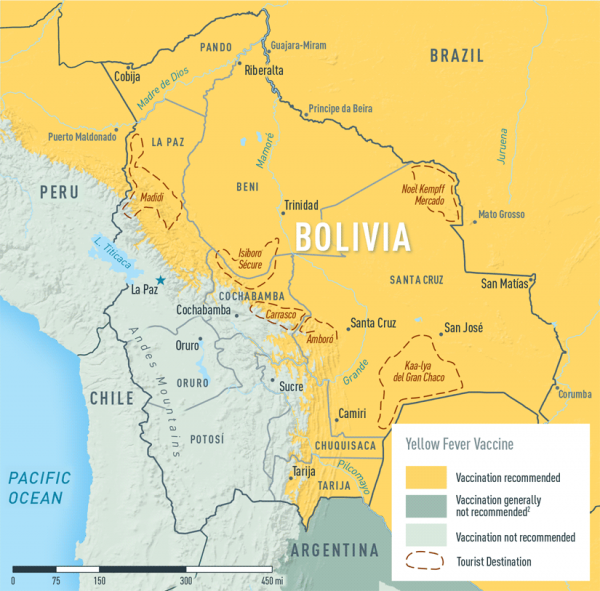
If your travel route includes other South American countries, you may also require the vaccination and an accompanying Yellow Fever Certificate in order to enter that country. The vaccination is not suitable for everybody. A careful risk assessment should be undertaken by a practitioner that specialises in the vaccine. Yellow Fever can only be given at designated Yellow Fever vaccination centres (YFVCs) – Fleet Street Clinic is a registered clinic.
Altitude
Bolivia is home to some of the highest peaks of the Andes mountains, with elevations of over 6,000m. The frequently visited cities of La Paz, Potosi and Uyuni all soar over 3,500m, making altitude sickness a real risk. The risk can be reduced by ensuring you stay hydrated, plan a slow ascent and factor in some acclimatisation days. Acetazolamide (Diamox) can be used to help aid the process. Book a pre-travel assessment and speak to a travel nurse about your options.
Insects
Mosquitoes, bugs and flies do more than just bite. They have the ability to transmit diseases that aren’t always preventable by vaccination or medication. Illnesses such as dengue fever, chikungunya, Zika, yellow fever, malaria and sleeping sickness are a few risks.
The best prevention is to entirely avoid mosquito bites. Cover up as much as possible and apply a minimum concentration of 50% DEET to any areas of exposed skin. Spraying your clothes with permethrin before travelling can provide extra protection. Sleep under a mosquito net, especially, if you plan to stay anywhere remote or rural.
See our Ultimate Bug Kit.
Malaria
Malaria occurs in the northern parts of Bolivia, in the Beni and Pando districts. Travellers heading to these areas should ensure they take anti-malarial medication. Mosquitoes that spread malaria are predominantly night-time biters. So, extra precautions should be taken between dusk and dawn. Any travellers who experience fever or flu-like symptoms on return from their trip should ensure they get tested for malaria, as unfortunately, no single prevention method is 100% effective.
First Aid
Whilst medical services and pharmacies are available in bigger cities, access to basic services is limited or even non-existent in the remote regions. Travel prepared and take a small medical kit that can treat basic complaints. Pack painkillers, antiseptic cream, plasters or dressing, and medication in case you suffer from an upset stomach. Head over to our online shop to purchase an essential first aid medical kit. This contains all your travelling medical essentials.
If you are prone to allergies, a non-drowsy antihistamine is helpful. Furthermore, if you take prescription medication, be sure to pack enough to last you for your entire trip.
Book your travel appointment today
By Anna Chapman | Travel Nurse | May 2019
What is HPV?
Human Papillomavirus, or HPV, is the name of a group of viruses with around 200 different types, that is most commonly passed on via genital contact.
Although HPV is highly common, 90% of HPV infections go away by themselves and do not cause any harm. Most people with HPV never develop symptoms or health problems.
However, it is possible for HPV infections to persist and cause cellular change in your body. This can lead to:
- Cancer of the cervix, vulva, and vagina in women
- Precancerous lesions in men and women
- Genital warts in men and women
- Head and neck cancers in men and women
HPV vaccines have a well-established role in preventing cervical cancers as well as these other aforementioned conditions.
Who Should Be Vaccinated against HPV?
In theory, HPV vaccines are best given to young people before they become sexually active, and therefore before they can be exposed to HPV.
Individuals who are already sexually active might also benefit as they may not have yet acquired all of the HPV strains covered by the vaccine. Patients aged under 16 can only be vaccinated with their parents present.
Why Boys should receive the HPV Vaccine
- About 15% of UK girls who are eligible for vaccination are currently not receiving both doses. This figure is much higher in some areas
- Most older women in the UK have not had the HPV vaccination
- Men may have sex with women from other countries which have no vaccination programme
- Men who have sex with men are not protected by the girls’ programme
- The cost of treating HPV-related diseases is high: treating anogenital warts alone in the UK is estimated to cost £58 million a year, while the additional cost of vaccinating boys has been estimated to cost about £20 million a year
Source: HPV Action
To book an HPV vaccination for yourself or your child, you can book an appointment online. Or find out more information about HPV here.
Brazil: Yellow Fever
The incidence of Yellow Fever cases in Brazil has been increasing recently, with over 1000 cases of Yellow Fever in Brazil since July 2017. The cases were reported in Sao Paolo, Minas Gerais, Rio de Janeiro, Espiritu Santo and Distrito Federal.
As well as an increase in human cases of yellow fever, 738 cases of yellow fever virus in monkeys have been reported. Since the outbreak, several unvaccinated travellers have contracted yellow fever, and there has been at least one death. Due to the ongoing outbreak, travellers going to at risk areas of Brazil are advised to get the Yellow Fever vaccination.
In addition the World Health Organisation also advised travellers heading to the states of Parana, Santa Catarina and Rio Grande do Sul should receive the vaccination, irrespective of location.
What is Yellow Fever?
Yellow Fever is a flavirus found in the tropics of Africa and South America.
Monkeys are a natural carrier for the virus and it is spread between monkeys and humans via the bite of an aedes mosquito.
Illness: It causes an acute viral illness which has a 50% mortality rate.
Prevention: The yellow fever vaccination should be considered for travellers who are visiting a high risk area. A single vaccination affords life long protection. The vaccination many not be suitable for everyone, so ensure you seek a full travel consultation.
Map of current areas with a risk of Yellow Fever
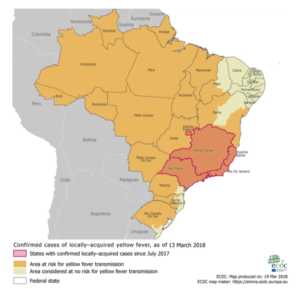
Book your travel appointment today
By Anna Chapman | Travel Nurse | February 2019
Sepsis Signs:
World Sepsis Day – 13 September
Sepsis is a global health crisis and affects 27 to 30 million people every year. Out of those affected, 7 to 9 million dies. That’s one death every 3.5 seconds.
Sometimes called the silent killer, Sepsis is a bacterial infection of the blood which can become life-threatening. It is very hard to detect in the early stages, with symptoms similar to many other conditions and illnesses. In the UK alone, around 37,000 people die from sepsis each year.
Thankfully, due to public awareness increasing due to medical bodies and health campaigns, sepsis is being talked about more. As a result, parents and doctors have the condition forefront-of-their mind. The condition is treatable with early recognition and care.
Causes of Sepsis
Bacterial infections are the most common causes of Sepsis. However, Sepsis can also be caused by infections like seasonal influenza viruses, dengue viruses, and highly transmissible pathogens.
Children under 1, the elderly and those with chronic diseases and a weakened immune system are most at risk of sepsis.
Symptoms of Sepsis
Sepsis can display in a variety of ways including:
-
Slurred speech or confusion
-
Extreme shivering or muscle pain or fever
-
Passing no urine all-day
-
Severe breathlessness
-
It feels like you’re going to die
-
Skin mottled or discoloured
If someone is ill and is getting progressively worse with two or more of the above symptoms, then it is advised for you to go to A & E without delay.
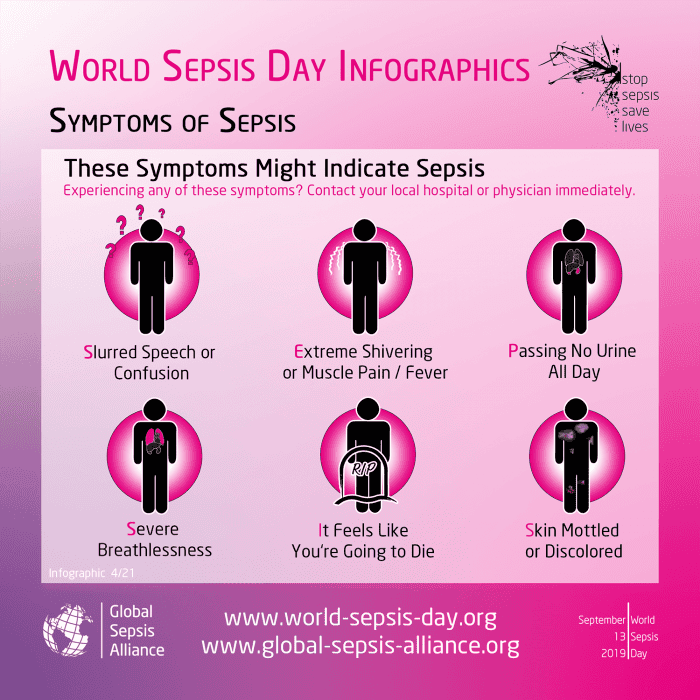
Preventing Sepsis
Preventing infection in the first place is the best way to prevent Sepsis from occurring.
This can be done by:
- Vaccinations – protect yourself from diseases which if serious, could lead to Sepsis.
- Hand Hygiene – reduce the spread of diseases and infections.
- Safe Childbirth – reducing infection to the mother and baby.
- Awareness of Sepsis– knowing the causes and symptoms can save lives.
If you think you are experiencing symptoms of sepsis, you should call 111 as you may require immediate medial attention.
For general GP health checks or vaccinations, you can book an appointment online.
Are you considering setting up a corporate health programme for your company?
The benefits of introducing a workplace health and wellbeing programme are clear: it has been proven that a successful corporate wellbeing programme leads to higher productivity, decreases in absenteeism and lower staff turnover. Ultimately, if your employees feeling healthy and looked after at work, it allows them to reach their potential and helps your company to achieve its business goals.
Perhaps as a result of the growing evidence in favour of such initiatives, businesses are now investing more than ever into corporate wellness programmes.
But with so many options available, how do you begin to create your own bespoke workplace programme? Firstly, be prepared to set aside time and budget. At the initial planning stage, there are several important factors to consider: how to structure the programme to your company’s ethos and business objectives, how to ensure staff involvement (at all levels), considering the size of your workplace, personalisation according to the needs of your company and the requirements of individual employees.
Fleet Street Clinic Corporate Wellbeing Programmes
At Fleet Street Clinic, we create bespoke corporate programmes across the UK. We work with companies of all sizes – from local businesses to City firms to international media agencies. We have a wealth of medical experts available, from hypnotherapists, osteopaths, dieticians, and can offer all kinds of services on site such as flu jabs, health screens and GP services.
We deliver programmes designed to boost the health and happiness of your staff, building and strengthening your workforce.
Want to find out more? You can visit our Corporate Healthcare Services page and make an enquiry. One of our Corporate Managers will be in touch soon.
With November being Mouth Cancer Awareness month, it is important to highlight the signs and symptoms of mouth cancer.
During a dental appointment, your dentist will naturally look for abnormalities within the mouth and these include signs of oral cancer. It is important that in between dental appointments you also take notice of what is going on inside your mouth. If you notice any changes is it essential you tell your dentist or doctor immediately.
Mouth cancer can develop in most parts of the mouth, including the lips, tongue, gums, cheek and the throat. If it is caught early, the chances of surviving mouth cancer are nine out of ten – those odds are pretty good, and that’s why early detection is so important.
– If in doubt, get checked out.
It can be hard to spot symptoms of mouth cancer, which is why it is important to regularly attend your dental appointments. Your dentist can perform a check-up and look for slight abnormalities that you might otherwise miss. If anything is found, your dentist will provide onward referral to a specialist for further investigation.
Given that early detection is so crucial for survival, it’s extremely important that we all know what to look out for. In between dental appointments you should look out for changes in your mouth health that could indicate mouth cancer.
Signs & Symptoms of Mouth Cancer:
Three signs and symptoms not to ignore are:
- Ulcers which do not heal within three weeks.
- Red and white patches in the mouth; or
- Unusual lumps or swellings in the mouth or head and neck area.
If you notice anything unusual in your mouth, it’s advisable to make an appointment with your dentist.
Checking for Mouth Cancer:
When checking for signs of mouth cancer you should follow the following routine:
Head and neck
Check if both sides look the same and search for any lumps, bumps or swellings that are only on one side of the face. Feel and press along the sides and front of your neck being alert to any tenderness or lumps to the touch.
Lips
Pull down your lower lip and look inside for any sores or changes in colour. Use your thumb and forefinger to feel the lip for any unusual lumps, bumps or changes in texture. Repeat this on the upper lip.
Cheek
Use your finger to pull out your cheek so that they can see inside. Look for red, white or dark patches.
Then place your index finger inside your cheek, with your opposing thumb on the outside gently squeeze and roll the cheek to check for any lumps, tenderness or ulcers, repeat this action on the other cheek.
The roof of the mouth
With your head tilted back and mouth open wide, your dentist will look to see if there are any lumps or if there is any change in colour. They will run their finger on the roof of your mouth to feel for any lumps.
Tongue
Examine your tongue, looking at the surface for any changes in colour or texture.
Stick out your tongue or move it from one side to another, again looking for any swelling, change in colour or ulcers. Finally, take a look at the underside of the tongue by placing the tip of your tongue on the roof of your mouth.
The floor of the mouth
Look at the floor of the mouth for changes in colour that are different than normal. Press your finger along the floor of your mouth and underside of your tongue to feel for any unusual lumps, swellings or ulcers.
If you find anything unusual in any of these areas, or are unsure of anything, visit your dentist or doctor as soon as possible.
The best ways to prevent mouth cancer:
- Cut down on alcohol consumption;
- Cut down or stop smoking;
- Getting the HPV vaccine, Gardasil 9; and
- Enjoy a healthy diet.
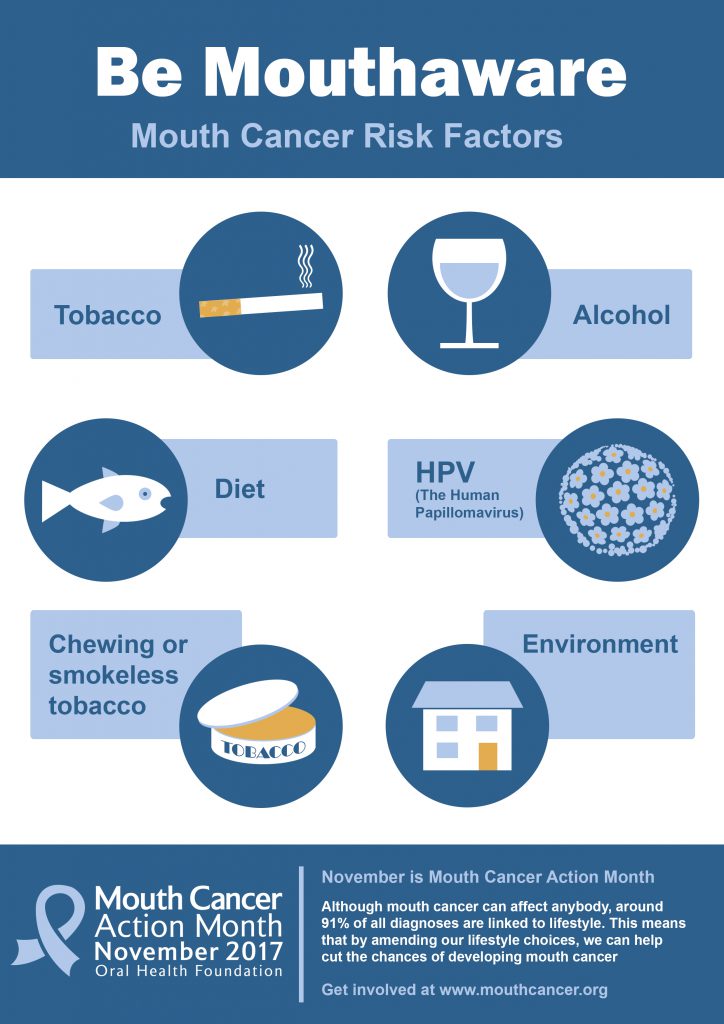
You can book a dental appointment with Temple Dental.
MARCH IS OVARIAN CANCER AWARENESS MONTH
A vital month raising awareness of ovarian cancer to improve early diagnosis to save lives.
More women died from ovarian cancer in the UK (4,227) than from all other gynaecological cancers combined in 2016, according to Cancer Research UK. However, worryingly one in five women in the UK (22%) mistakenly believe that a smear test (cervical screening) can detect ovarian cancer, according to research Target Ovarian Cancer carried out with YouGov.
We are committed to raising awareness of the disease.
Speak to one of our female GP’s about any concerns you may have about your gynaecological history and your families medical history. During your consultation, we will also conduct a breast check and pelvic examination.
“In the UK a woman dies every two hours from ovarian cancer, but the earlier the diagnosis the better the chances are”
Professor Hani Gabra – Director of Ovarian Cancer Action Research Centre
What is ovarian cancer?
Ovarian cancer is when abnormal cells in the ovary begin to grow and divide in an uncontrolled way and eventually form a growth (tumour). Every year 7,300 women in the UK are diagnosed with ovarian cancer.
Who can get ovarian cancer?
The risk of developing ovarian cancer increases as you get older. The most common type of ovarian cancer is epithelial ovarian cancer, this usually occurs in women older than 50 years old. We don’t know exactly what causes epithelial ovarian cancer. But some factors may increase or reduce the risk.
Factors that increase the risk include:
- getting older
- inherited faulty genes
- having breast cancer before
Factors that may reduce the risk include:
- taking the contraceptive pill
- having children
- breastfeeding
Ovarian Cancer is notoriously difficult to spot.
With non-specific symptoms in the early stages. It is hoped that this new method of early diagnosis could help save lives.
How to recognise the symptoms of Ovarian Cancer:
Early Ovarian Cancer symptoms can be similar to those of other conditions, these some to watch out for:
- Persistent bloating – not bloating that comes and goes
- Pain in the lower stomach and pelvis
- Difficulty Eating and feeling full quickly
- Back pain
- Fatigue
- Change in bowel habits
What should you do if you’re worried?
It is important to contact your GP as soon as possible if you spot any symptoms that are abnormal for you.
We understand talking about your concerns and having an examination can be quite worrying and for some, embarrassing, therefore, to make you as comfortable as possible, all our well woman services are booked with a female GP.
There is an Ovarian Cancer Blood Test – CA 125 available
Levels of protein CA125 in the blood are recognised as a marker for ovarian cancer. This simple and effective blood test will detect early stages of ovarian cancer. You can either have this as a stand-alone blood test or add it on to your medical for an additional cost. Please inquire for prices..
Links:
Target Ovarian Cancer
Cancer Research UK
For more information about Fleet Street Clinic’s Women’s Health Services.
You can also book a GP appointment online.
FINISHING THE LONDON MARATHON
The 2018 London Marathon is just around the corner! Are you preparing for the run this year? If so, you’ll be very aware of the struggle ahead. A challenge like a marathon is incredibly rewarding but also tough on the body. Increasing your exercise capacity to this level pushes the limits of endurance both physically and mentally.
But even though this can feel torturous at times, you should not ignore recurrent pain or discomfort that persists after adequate rest. A common mistake is to push through and wait until pain prevents training before seeking care. By then, prolonged time off is often necessary to heal. It is estimated that 50 to 70 percent of first-time marathon runners drop out before their race.
If you do pick up an injury:
- First and foremost, stop and get it assessed.
- Maintain your strength and endurance as much as possible while recovering from your injury. If it prevents you from running, low-impact cardio exercise such as swimming, cycling or pool running can continue to improve exercise tolerance.
- Don’t be over-anxious to return to running, a good indicator of readiness is once you can walk for 30 minutes without pain during or after, you can begin a slow, careful return to pain-free running.
- Do not push through the pain.
Moving forward
As you increase your training and running, consider a biomechanical assessment. Slight problems in gait caused by many issues from footwear to posture to old injuries can cause new injuries (knees are particularly susceptible), or cause you to have to slow your pace or walk during the race.
Listen and respond to your body throughout training and recovery, and that finish line is waiting for you!
Post race
As you can imagine, a marathon takes its toll on the body in many ways. A post race assessment is well worth it, to identify any issues caused, not to mention a treatment to work out some of that lactic acid and to restore full function to the joints and muscles.
Our osteopath Andrew Doody and podiatrist George Hill can help with any marathon-related complaints. For more training tips and advice, or marathon injury treatment you can book an appointment online.
Measles Outbreak – What You Need to Know
The WHO has issued a warning about recent outbreaks of measles in Europe and the USA. Cases of measles have risen rapidly in recent months in Italy, Romania and most recently in US.
Measles is a highly contagious virus with potential for serious complications.
Initial symptoms can include:
- Runny nose
- High Temperature
- Spots in the mouth
- Aches and pains
- Sore eyes and swollen eyelids
A rash appears after 2-4 days which can present as blotchy spots, often starting at the head and progressing down.
Medical Advice for Measles
If you think you may be suffering from measles, or are concerned about risk of infection when travelling, please see your doctor straight away.
Travelling to areas with a risk of measles
Make sure you are up-to-date with your vaccinations before you travel, including the measles, mumps and rubella (MMR) vaccine. If your child will be travelling, the MMR can be given from 6 months of age. If you have not had measles or if you have not had two doses of MMR, you may be at risk. Measles is easily passed from person to person and can be a serious illness in adults as well as children. It is never too late to have the vaccine.
Call Fleet Street Clinic for medical assistance, advice on vaccinations and travel precautions on 0207 353 5678 email info@fleetstreetclinic.com or book online now.
Stoptober is a good time to reflect on smoking habits and how to improve health issues related to tobacco use.
Quitting smoking is one of the most effective ways you can improve your health and the benefits start almost immediately. And remember, it’s never too late to quit!
The benefits of stopping smoking
After 20 minutes
Blood pressure and pulse are normalised, blood circulation improves.
After 8 hours
Levels of carbon monoxide in the blood decrease.
After 48 hours
Your sense of smell and taste are improving.
After 2 to 3 days
Less or no phlegm in the throat, fewer breathing difficulties.
After 5 to 7 days
Your breath is fresher, your teeth are cleaner and energy levels higher.
After 2 to 3 weeks
Physical withdrawal symptoms will stop, and you can now go several hours without thinking about smoking. Your risk of blood clots (thrombosis) is reduced.
After 4 weeks
Coughing, blocked sinuses and breathing difficulties should subside. The lungs are better able to resist infection.
After 2 to 3 months
Lung function improves by 5%.
After 1 year
The risk of developing cardiovascular disease is halved.
After 2 to 3 years
The risk of developing severe pneumonia or flu is the same as for a non-smoker. Your risk of heart disease, angina (chest pains) and stroke continues to fall.
After 5 years
The risk of throat, oesophageal and bladder cancer is halved.
After 5 to 10 years
The risk of developing cardiovascular disease or thrombosis is the same as for a non-smoker.
After 10 years
The risk of lung cancer is halved. The risk of developing osteoporosis decreases.
After 15 to 20 years
The risk of lung, throat, oesophageal or bladder cancer is the same as for a non-smoker. But heavy smokers (20 a day) have double the risk of lung cancer for the rest of their lives.
Help with quitting
If you need any advice or help to stop smoking, you can book an appointment with one of our GPs.
National Smile Month is a UK campaign to promote good oral health.
Fleet Street Clinic is proud to be supporting this great campaign.
Dr Pilar Gesto, one of our highly-qualified dentists, explains why good oral health is key…
“In our busy and sometimes stressful lives, it is common to forget the power of a smile. This simple gesture can affect our work, our social life and our love life. But don’t worry. Beautiful smiles all have one thing in common: they always come from healthy mouths!”
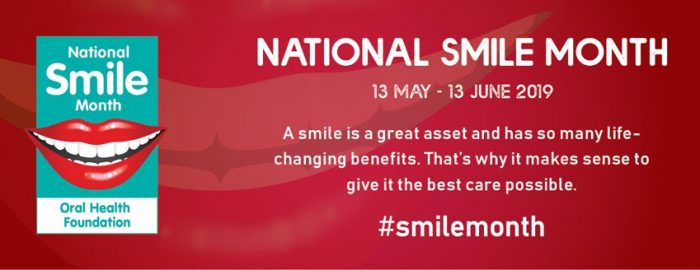
To achieve a healthy and beautiful smile, simply follow the straightforward advice below:
- Clean and floss your teeth after every meal.
- Visit your dentist for regular check-ups.
- Avoid too much food and drinks that may stain your teeth, such as coffee and red wine.
- Do not smoke.
- Do not use abrasive toothpaste or products that may damage your enamel, such as sticky foods and acidic diet.
- In some cases, a whitening treatment may be appropriate if recommended by your dentist.
- Most importantly: smile as widely as you can!
We are very sorry to hear that Interhealth is ceasing to trade. As a hugely respected health practice, it is a great loss for Travel Medicine in the UK.
Fleet Street Clinic is in contact with Interhealth to offer support and provide continuity of medical care for existing individual and corporate Interhealth clients as required.
If you are looking for continuity with Interhealth services as an individual, or if you require corporate services such as Occupational Health and Travel Healthcare including travel vaccinations, please get in touch.
For more information please call Fleet Street Clinic on 0207 353 5678 or email at info@fleetstreetclinic.com
Ask the average person what viral disease they think claims the most lives, and HIV might be the likely response. However, this is not so, according to research in the Lancet. The research suggests that viral hepatitis caused 1.45m deaths in 2013 compared to 1.2m lives claimed by AIDS in 2014. What is Hepatitis?
Hepatitis is best defined as an inflammation of the liver caused by the hepatitis virus. There are 5 types of hepatitis virus called; A,B,C,D and E. Contaminated food is usually the cause of virus types A and E. Types B, C and D are spread via infected bodily fluid contact. Virus types B and C lead to the most deaths.
Prevention
Hepatitis A and B are vaccine preventable. Many countries offer these vaccines routinely on the childhood schedule but this is not the case in the UK.
Hepatitis Vaccination at the Fleet Street Clinic
Vaccinations are needed to give protection against hepatitis A and B and they currently are not part of the childhood vaccination schedule in the UK. At the Fleet Street Clinic, we make it a priority to have a good supply of hepatitis A and B vaccines for children all year round. The hepatitis vaccinations can be given individually, or as a combined injection. For long lasting protection, several doses are required. Our vaccination team are highly trained, well-qualified and have dozens of years’ experience between them. Our vaccination service takes place in a clean, comfortable and safe environment.
You can learn more about our vaccinations here.
While hepatitis is causing millions of fatalities across the globe, you can take steps towards protection against the virus by booking an appointment for hepatitis vaccinations at Fleet Street Clinic today.
Tennis Elbow and Golfer’s Elbow
As our glorious British Summer continues and everyone basks on the tennis court, our osteopath, Andrew Doody, calls time on an old problem.
Tennis elbow is a condition that causes pain around the outside of the elbow. It’s clinically known as lateral epicondylitis and often occurs after strenuous overuse of the muscles and tendons of the forearm, near the elbow joint.
You may notice pain:
- on the outside of your upper forearm, just below the bend of your elbow
- when lifting or bending your arm
- when gripping small objects, such as a pen
- when twisting your forearm, such as turning a door handle or opening a jar
You may also find it difficult to fully extend your arm.
The name tennis elbow is because the tennis backhand shot is a common way to develop the problem, however any strain or overuse can cause it.
Lesser known golfer’s elbow (medial epicondylitis) is a similar issue but on the other side of the elbow.
These conditions are easy to get but can hang around for weeks and months if left untreated. This is largely due to the fact that lots of the muscles in the hand and forearm attach to those two spots on either side of the elbow. This means that once the area is enflamed, most everything you do with the hand can re-aggravate it, from drinking a cup of tea (or Pimms) to opening a door (or raising a trophy).
Once diagnosed, treatment involves firstly reducing the inflammation with rest, cold compresses and anti-inflammatories, followed by massage and careful mobilisation to help relieve pain and stiffness and restore the range of movement. Specific supports can also be quite beneficial at this time.
Preventing tennis elbow
Preventing tennis elbow is tough but here are a few pointers:
- If you have tennis elbow, stop doing the activity that is causing pain, or find an alternative way of doing it that does not place stress on your tendons.
- Avoid using your wrist and elbow more than the rest of your arm. Spread the load to the larger muscles of your shoulder and upper arm.
- If you play a sport that involves repetitive movements, such as tennis or squash, getting some coaching advice to help improve your technique may help you avoid getting tennis elbow.
- Before playing a sport that involves repetitive arm movements, warm up properly and gently stretch your arm muscles to help avoid injury.
- Use lightweight tools or racquets and enlarge their grip size to help you avoid putting excess strain on your tendons.
- Wear a tennis elbow support when you are using your arm, and take it off while you are resting or sleeping to help prevent further damage to your tendons. Ask your osteopath for advice about the best type of brace or splint to use.
Increasing the strength of your forearm muscles can help prevent tennis elbow. Your osteopath can advise you about exercises to build up your forearm muscles.
Andrew Doody is an osteopath at Fleet Street Clinic and is fully registered with the General Osteopathic Council (GOSC). Book an appointment with him if you have any musculoskeletal injuries.
The Fleet Street Clinic is pleased to advise that it is has been awarded SEQOHS Accreditation by the Royal College of Physicians, a quality mark endorsing the provision of Safe Effective Quality Occupational Health Services.
We undertake a full range of Occupational Health Services:
- Management Referrals, Fitness to Work and Absence Management
- Pre-Placement Assessments (formerly Pre-Employment Assessments)
- Pre Deployment Medicals and certificated fitness for deployment
- Post Deployment Medicals
- Ergonomic Assessments
- Immunisations & blood tests
- Health Clearance Services for healthcare workers
If you would like further information about our occupational health services or wish to discuss your company’s needs, our OH Administrator can be contacted on occhealthadmin@fleetstreetclinic.com or 020 7353 5678.
With the Rugby World Cup in full swing, our osteopath Andrew Doody takes you through some of the most common injuries in this most physical of sports.
The five most common rugby injuries:
A medial collateral ligament tear
This is the ligament on the inside of the knee. It stabilises the knee (along with the lateral collateral and cruciate ligaments). Due to the nature of tackling a player by hitting into the outside of the leg, this can often gap the opposite side, putting the ligament under enough strain to tear or even rupture. Quick changes of direction can also strain this ligament.
Haematoma of the thigh
In similar circumstances as the MCL injuries during tackling, impact on the thigh can often cause severe bruising of an area as the soft tissues are smashed against the thigh bone with blood vessels being damaged and blood then clotting around the area.
Hamstring tears
The three muscles on the back of the thigh, commonly known as the hamstrings are often injured in many sports, not only rugby. Rapid changes of pace can strain the muscle, especially if it is not fully warmed up (although research is beginning to show it’s not quite as simple as previously thought). Mechanical issues in the leg such as gait on running can also add to the danger of a tear.
Calf strain
In a similar fashion, the calf muscle is often strained, usually where it attaches to the Achilles tendon. Again, overuse, especially on a tired muscle, can cause strains, as can the mechanics of the foot and ankle complex.
Concussion
The one that has the spotlight on it most recently is, of course, concussion. Any blow to the head can cause varying degrees of concussion. This can be from mild to extremely serious. Very difficult to prevent in rugby, the emphasis has fallen on rapid identification of when a concussion has occurred and immediate action to minimise the danger of ongoing damage.
Rugby is a rough sport and it is always difficult to greatly lower the risk of injury without hugely compromising what is a great game. The RFU is working hard to achieve this though, through changes to the laws of rugby. As well as raising awareness of injuries, both in regard to preventative factors and response after injury occurs.
Osteopathy can stretch and condition the muscles and ease the pain; a routine of stretches to carry out at home can also be recommended. Andrew Doody offers a trusted osteopathy service which can assist with pain relief and also address the underlying causes of injuries, decreasing your chances of future injury.
If you have had a rugby injury or are experiencing any musculoskeletal problems, you can book an appointment online.
Sexual Health Awareness
We are focusing on Sexual Health Awareness at Fleet Street Clinic this week, to encourage people to talk about their sexual health with health care professionals and help to diagnose and treat STIs.
Did you know:
– More than two-thirds of people have never had an STI test.
– Many people carrying an STI do not display symptoms.
This is why it is worth getting tested, even if you don’t feel that something is wrong. Having an STI check can sometimes make people nervous, but a sexual health appointment with a professional is quick and helps keep your health on track.
STI Symptoms
Although not everyone presents symptoms, some common complaints in men and women suffering from an STI can be:
- Pain when passing urine
- Itching or burning around the genital area
- Discharge that smells
Having these symptoms doesn’t mean you have an STI, but make sure you go to a GP to get checked out and find out the cause.
Health professionals advise to always use condoms to help reduce the chance of STI transmission from intercourse and oral sex.
Sexual Health Advice at Fleet Street Clinic
At Fleet Street Clinic, we provide access to Sexual Health tests and advice from our trained medical professionals.
You can learn more about our sexual health services here.
If you would like a sexual health appointment, you can book online.
With summer just around the corner, many are busy shopping for essentials. Sun cream, swimwear and toiletries are more likely on the list rather than travel vaccines. Many forget to check if they are up-to-date on the recommended travel vaccines. To make sure you get full enjoyment out of your holidays it’s important to stay safe during and after your break.
Below we have highlighted some health concerns you need to know if you are travelling this Summer:
Measles:
Throughout this year we have seen an increased rise in measles cases all over the world. The disease can be easily prevented with two doses of the safe and efficient MMR vaccine. A review of your childhood vaccine records will indicate if you have had the MMR course or if in need of a booster or the full course. Those struggling to confirm their immunity can have a simple immunity blood test which will either confirm if they are immune or not.
Hepatitis:
When visiting areas with poor sanitation, which can affect the water and food consumed, travellers, should consider the Hepatitis A vaccination. A safe and effective vaccination which prevents the viral infection and stop travellers falling ill whilst away. In addition to the vaccination, travellers also should take caution and ensure all food is cooked thoroughly and served hot, stick to bottled water which is sealed and avoid ice (usually tap water).
Hepatitis B is a viral infection spread by contaminated blood and bodily fluids. Examples in which travellers can be at risk are contaminated medical equipment which may be used in an emergency for example needles and syringes. Hepatitis B can also be prevented with a vaccine course before travelling.
Malaria:
Every year there are more than 200 million new cases of malaria, another preventable and treatable disease. The World Health Organizations lists 91 countries and territories at risk of malaria transmission. Preventative medication can be taken to reduce the risk of catching Malaria as there is currently no vaccination.
Infectious diarrhoea:
In about 20% of travellers with diarrhoea, more than one bug turns out to be responsible for the illness. Bugs can be caught from drinking tap water and eating uncooked food or salads washed in tap water. It can put a dampener on holiday plans and make you feel under the weather. Antibiotics can be prescribed prior to travel, in case of a severe infection. Our gastro kit is designed to help travellers who may need medication to help cases of infectious diarrhoea whilst travelling.
“There may be avoidable risks to your health depending on your overall health, destination and planned travel activities. We can assess the risks and provide you with the best travel health advice to ensure you have an enjoyable trip and return healthy.”
If you wish to discuss how to stay safe on holiday or would like more advice on what vaccinations you may need, our travel nurses can help. Book a travel consultation to discuss your needs.
Uzbekistan is home to spellbinding architecture and ancient cities. In terms of sights alone, Uzbekistan is Central Asia’s biggest draw and most impressive showstopper. Fabulous mosques, medressas and mausoleums are just some of the pulls for tourists when visiting Uzbekistan while more eccentric views can be seen at the fast disappearing Aral Sea and Nuratau Mountains.
Travel Nurse, Anna, shares her top tips on how to stay healthy during your trip to Uzbekistan.
Vaccinations
Ensure you are up-to-date with your travel vaccinations. The minimum advised for a trip to Uzbekistan is diphtheria tetanus and polio, and Hepatitis A. Typhoid, Hepatitis B and Rabies can be considered by some travellers. It is advisable to attend for a pre-travel assessment with a travel nurse 6-weeks before your trip as some vaccinations requires several injections to complete the course.
Food and water
Precautions against the dreaded traveller’s diarrhoea should be taken to prevent an upset stomach ruining your trip. Do not drink tap water in Uzbekistan, stick to bottled water or water that has been boiled. If you are trekking or visiting remote areas it’s a good idea to take either a water bottle with a filter or some chlorine dioxide tablets to make water safe to drink, should you not be able to find a shop with bottled water.
Sour milk dishes dominate the Uzbek cuisine. Cue caution if you want to try ‘kurt’, the famous fermented cheese balls. There is a risk of a bacterial disease called brucellosis that can be spread through unpasteurised dairy products such as cheese and milk.
Travelling further afield
Uzbekistan forms one of the countries on the old silk route. If you plan on a tour of the ‘Stans’ or attempting the whole Beijing to Istanbul route, you may need to consider other travel health precautions. Depending on your route, and also the time of year you intend to travel, you may wish to consider vaccinations against Tick-Borne Encephalitis and Japanese Encephalitis.
Altitude
Khazret Sultan, Uzbekistan’s highest peak stands at 4643m. Many popular walking and hiking routes such as Big Chimgan exceed over 3000m, making altitude related illnesses a hazard. Tips for reducing altitude sickness include a slow ascent route, keeping hydrated, ensuring that your sleeping altitude doesn’t exceed 500m per day. Diamox (acetazolamide) is a prescription medication that can reduce the symptoms of altitude related illness.
Book your travel appointment today
By Anna Chapman | Travel Nurse | April 2019
Marrakesh is a former Imperial City and the heart of Morocco. Whether you plan on visiting the medinas of Marrakesh or branch out to the sands of the Sahara or the heights of the Atlas mountains, ensure you follow our top travel tips to stay healthy.
Vaccinations
All travellers should ensure they have received vaccinations against Hepaitis A and diphtheria-tetanus and polio. Vaccinations against typhoid should be considered for those who cannot guarantee safe food and water during their trip, Hepatitis B and Rabies vaccinations can be considered for some travellers, especially those travelling to more remote locations.
Water
Travellers should be careful when dining in Morocco. This will help to prevent food and water-borne illnesses. You should avoid drinking tap water, and stick to boiled water, or bottled sealed water. Those who are trekking may wish to take a water bottle with a filter or a supply of chlorine dioxide tablets to make water safe when in remote locations.
Food Safety
Stick to the mantra of cooking it, peel it, boil it, forget it. If you cannot cook, peel or boil what you plan to eat or drink, it is probably safest to avoid consuming. Food contaminated with local water, such as salads are considered high risk and best to be avoided. Ensure all food is cooked thoroughly and served straight away. Avoid buffet items which may have been sat for long periods of time and could be contaminated. You can also purchase our worldwide gastro kit.
First Aid
The availability of health care and first aid supplies are limited in Morocco. Whether you are visiting the median of Marrakesh or ambling around the Atlas, taking a good first aid kit with you is essential – click here to buy online now.
Basic provisions include pain relief, plasters and medication to treat an upset stomach, such as loperamide and oral rehydration salts. If you take prescription medication to ensure you pack enough and carry the prescription with you.
Altitude
The peak of Mount Toubkal exceeds 4,000m and can be summited in 5-7 hours. High altitude and fast ascent rates can put travellers at risk of altitude sickness and acute mountain sickness. The risk can be reduced by ensuring you stay hydrated, plan a slow ascent and factor in some acclimatisation days. Acetazolamide (Diamox) can be used to help aid the process, speak to a travel nurse about this at your pre-travel assessment.
It is always best to seek travel advice before any holiday. A pre-travel assessment is quick and easy, vaccinations and prescriptions can be given within a single appointment and any follow-up treatments to complete courses arranged for a convenient time straight away.
Book your travel appointment today
By Anna Chapman | Travel Nurse | April 2019
So you’re back to work and the tree’s on its way back to the loft. Time to come through on all the New Year’s resolution bravado. Here are a few tips about how to do just that.
Create a plan
Decide what it is you’re wanting to achieve and tailor your program towards it. Do you want to lose weight? Get fitter? Tone up? All three? Don’t just choose the new fitness regime trend, think what you enjoy to do and go with that! You stand much more chance of continuing if you do. Identify times of day when you can exercise and which days you will do it. It’s much harder to stick to a regime that is just squeezed in when and if you have the time (not to mention inclination!)
Determine your readiness
Make sure you are mentally and physically ready to start, and more importantly ready to stick to, a regime. Check with your GP if you have any concerns about your health before you start. A good proportion of my new patients come from people who have caused injuries in the first few weeks, or even days sometimes, of starting a new regime. If you have any niggles, get them treated, and get advice on how to prevent them from recurring.
Be realistic
Set goals that are achievable and realistic. To lose a stone or be able to run 10k by Easter are realistic. To decide you are going to the gym every day before breakfast probably won’t last long. Fitness needs to be built gradually with a good base. Get advice on what exercise you need to do. Just running will help cardiovascular fitness somewhat, but needs to be part of a balanced all-around program if you want to be healthier generally. To maintain it, alone, running will also soon start to cause musculoskeletal problems.
Talk a friend into joining you
There will probably be no shortage of people thinking along the same lines as you. Teaming up hugely increases the chances of you both sticking to a program and makes it much more fun and less painful than trying alone. Even just planning together and talking about what you’re doing, (even if diaries don’t allow actually exercising together), is really encouraging.
Think long-term
Don’t look at this as a quick fix just to drop a few pounds. Take it easy and don’t rush. Tailor your plan around becoming more fit and healthy permanently. If you do it will help with so many other things, from energy levels to less aching joints or back, to stress relief and better sleep.
By Andrew Doody | Osteopath
Andrew is available for pre-exercise assessment, advice on exercise/regime planning, and diagnosis/treatment of outstanding or new issues, as well as advice on injury prevention. You can book an osteopathy appointment online.
As it’s backcare awareness week, let’s talk about back pain at work.
Back pain can be the result of heavy lifting, repetitive movement or simply by sitting at your desk all day.
We know how hard it is to live and work in pain and back pain is no exception. By now I’m sure we all realise that sitting for long periods is bad for you. But just how bad have our habits become? And what can be done about it?
Sitting in an office chair for long periods of time can wreak havoc on your lower back. In addition to many other joints and muscles. Simply stated, our bodies weren’t made to sit for prolonged periods of time. In fact, our bodies developed a heck of a long time before chairs were around at all.
According to research, the average office worker spends an average of 5 hours and 41 minutes per day sitting at their desk. The same study also found that those who sit longer at work are more likely to sit more outside of work as well.
Overall, sedentary jobs have increased 83% since 1950. With physically active jobs now only make up about 25% of the workforce. That’s 50% less than in 1950. Additionally, the average working week is longer. We now work an average of 47 hours a week, 164 more hours a year than 20 years ago.
On top of the time spent sitting in the workplace, on average, we spend 7 hours sleeping and 4.5 hours watching tv a day.
So should we be standing?
A recent study in the European Journal of Preventive Cardiology found that standing for almost six hours a day instead of sitting not only prevents weight gain — it can help people shed pounds.
They calculated that standing burned 0.15 calories more per minute compared to sitting. If an average person stood for six hours a day instead of sitting, they would burn an extra 54 calories a day. Some studies had it even higher.
In addition, muscle activity from standing is also associated with lower risks for strokes and heart attacks. Quite a few studies have shown that a single day of breaking up sitting with standing or short walks seems to have a beneficial effect on health parameters. Which include blood sugar control, blood pressure, and feelings of pain and fatigue.
However, before we all decide to stand all day instead, let’s look at the downsides. There’s a confusing array of conclusions from recent studies involving the health implications of standing vs sitting for long amounts of time. There have been studies, for example, that have concluded that people who primarily stand for long periods of time during the day, instead of lowering their risk for heart disease, maybe up to twice as likely to develop it. Perhaps long periods of standing are not the answer either. It has also been pointed out that standing for extended periods of time isn’t safe for all people, such as those with joint or vascular issues.
However, swapping out some sitting time for standing time is not only about heart disease.
One variable that makes sitting for extended periods damaging to the spine is the sustained contracture of the abdominal and hamstring muscles. This creates an imbalance. This, in turn, creates affecting the mechanics of the lower back. It also increases the load on the lumbar discs.
Using a standing desk, even for a portion of a workday, can minimise this imbalance. This helps maintain better spinal alignment and muscle symmetry.
So is a combination of sitting and standing the answer?
A recent study was performed where office workers of varying ages and body masses used a sit-stand desk where they alternated between sitting and standing throughout an 8-hour workday. The study found that the participants reported a 31.8% reduction in standing desk back pain when compared to sitting for the entire workday.
But just like sitting and leaning forward for extended periods can increase pressure on the back, the same applies to standing with poor ergonomics. Maintaining good posture and taking frequent breaks is the best way to ensure you’re standing or sitting optimally.
Try not to wear high heels (you can swap out for flats or slippers while at your desk if needed). Have the top of the computer screen at about eye level, and vary posture. When you’re in a sitting phase of your day make sure your chair and workstation have been fully ergonomically assessed. Discuss any conditions with your osteopath. They can advise how to adapt both the sitting and standing phases to suit you better. Have regular breaks from your desk altogether when you walk around the office.
And then of course if you really want to blow the budget there are treadmill desks…
If you’re experiencing back pain you can book an appointment with our Osteopath, Andrew Doody, online.
ADVICE ON TICK-BORNE DISEASE IN EUROPE
Tick-borne Encephalitis (TBE) is a viral disease that is spread by the bite of an infected Ixodes tick. It is estimated that the disease infects at least 13,000 people every year.
Symptoms can occur from 4-28 days post-bite and include fever, fatigue and muscle aches.
The virus can also go on to affect the brain and spinal cord, causing meningitis, with up to 20% of cases resulting in death. Unfortunately, there is no specific treatment for TBE.
TBE occurs in 3 main geographical locations:
European TBE – Western Europe
Siberian TBE – Urals, Siberia, Far-Eastern Russia and Finland
Far Eastern TBE – far Eastern Russia, China and Japan
Transmission of TBE occurs mainly during the summer months, mainly via wild vertebrate animals such as rodents. It can be transmitted either by ingestion of unpasteurised milk, or milk products from infected animals or by the bite of an infected tick.
If you’re travelling to affected countries during the transmission period, you are most at risk if you are doing outdoor activities such as hiking, camping and walking in forested areas where ticks are abundant.
Take the following precautions to avoid infection:
Wear long trousers and sleeves. Impregnating clothing with permethrin and using insect repellents such as DEET are also good ways of preventing tick bites.
Get vaccinated. Ticovac (and Ticovac Junior for children) is advised for travellers who may be at risk. It requires two vaccinations prior to travel, and the third dose after a year can provide up to 5 years protection.
Check your body for ticks -especially in the armpits, groin and behind the knees.
Remove ticks promptly and correctly and clean the bite site with antiseptic.
Fast Facts
| What | Tick-Borne Encephalitis |
| Where | Eastern Europe, Scandinavia, Siberia |
| When | Summer Months |
| How | Infected bite of a tick |
| Can it be prevented? | Yes – Vaccination and tick-prevention |
Tick Removal Tips
If you find a tick embedded on your skin you need to remove it, asap:
To remove a tick follow these steps :
- Use a pair of fine tweezers or a tick-remover
- Grasp the tick head as close the skin as possible
- Pull upwards at right-angles to the skin
Top tip: Avoid putting pressure on the body to avoid incomplete removal which may cause infection.
TICK-BORNE ENCEPHALITIS VACCINATION
There is a vaccination against tick-borne encephalitis (Ticovac and Ticovac Junior) which is highly effective against TBE. The primary schedule requires two vaccinations to be given 14 days apart, and a third dose to be given one year later. A booster vaccination is recommended after 3 years. The vaccination is suitable for adults and children over the age of one-year-old.
You can book a travel consultation appointment online to find out if you beed a tick-borne encephalitis vaccine for your next trip.
MUMPS OUTBREAKS IN UK UNIVERSITIES:
CASES OF MUMPS REPORTED AT A NUMBER OF UK UNIVERSITIES
Public Health England has confirmed they are urging students to get MMR vaccinations.
A number of cases of mumps have been reported in Nottingham and Exeter. The recent rise in teenagers and young adults who have not had two doses of the MMR vaccine are believed to have caused an increase in UK cases. Unprotected students are particularly vulnerable due to close living conditions. Students are being urged to ensure they have received the full two-dose MMR vaccine course to protect themselves against mumps.
A total of 241 suspected cases were reported, with 52 confirmed, across Nottingham Trent University and the University of Nottingham and 7 confirmed cases at Exeter University.
MUMPS VIRUS
Mumps is a contagious viral infection which causes swelling of the parotid glands.
Initial symptoms can be similar to a cold and include:
- Headache
- High Temperature
- Joint Pain
- Feeling Sick
- Tiredness
- Loss of Appetite
- Swelling of the face/neck
Mumps can result in some serious complications. It can cause temporary hearing loss in 1 in 20 people. Mumps can cause a rare but potential risk of encephalitis, which affects 1 in 1,000 sufferers and requires hospitalisation.
It is spread in the same way as colds and flu – through infected droplets of saliva that can be inhaled or picked up from surfaces and transferred into the mouth or nose.
A person is most contagious a few days before the symptoms develop and for a few days afterwards.
Some people suffer complications that can include inflammation of the pancreas, viral meningitis (inflammation of the brain), inflamed and swollen testicles in men and ovaries in women.
MEDICAL ADVICE FOR MUMPS
If you think you may be suffering from mumps, or are concerned about the risk of infection, please see your doctor straight away.
Those who have not had the MMR vaccine – or have only received one dose – regardless of age, should ensure they receive two doses of the MMR (measles, mumps and rubella) vaccine.
In order to keep virus’ such as mumps from spreading, a certain proportion of the population must be immunised, this is called the ‘herd immunity’.
Herd immunity is particularly important as not everyone can get vaccinated, but those who can are able to help people those who can’t. Some people are unable to get vaccinated because they’re too ill, too young or have an impaired immune system. When we vaccinate, we protect not only ourselves but also the most vulnerable members of our communities.
VACCINATION AGAINST MUMPS
The disease can be easily prevented with two doses of the MMR vaccine, that has safely and efficiently been in use since the late 1980s’.
Make sure you are up-to-date with your measles, mumps and rubella (MMR) vaccine. Although the NHS immunisation schedule offers the vaccine to children from 12 months of age, the MMR can be given from 6 months. If you have not had measles, mumps or rubella or if you have not had two doses of MMR, you may be at risk. Measles mumps and rubella are easily passed from person to person and can be a serious illness in adults as well as children. It is never too late to have the vaccine.
You can book an MMR vaccine online.
Links:
There is no denying that a marathon is an extraordinarily long distance to run and the effects it has on the body can be enormous.
No part of the body is more affected than your feet.
From the intense training regime to the 26.2 miles of constant pounding on hard concrete, it is crucial you look after your feet before and after the London Marathon.
There are many injuries that can be picked up whilst training such as blisters, callus build-up, cracks in the heal and ingrown toenails. Vigorous long-distance running can amplify these injuries but also cause nail damage and even loss of a toenail.
Caring for your feet post marathon is extremely important and visiting a podiatrist is advised to reduce the possibility of long-term damage which could be irreversible.
The key to post-race recovery starts with putting your feet up, relax them with some rest and then think about booking a podiatrist appointment roughly 3 days after your marathon. This will allow any soft tissue that has become inflamed to reduce.
If you have nail damage:
It is important that any pain caused by nail damage be investigated by a podiatrist, this could be from a loose nail to a build-up of pressure from a blood blister under the nail. Following trauma never force the removal of a nail or attempt ‘home-surgery’ as you are likely to create a nail bed infection and increase the risk of causing more long-term damage – leave this to a podiatrist.
If the nail damage isn’t significant nor causing any pain, you can protect it to reduce any further damage and monitor it’s healing. If the area doesn’t heal or begins to become painful it is advisable to book in with a podiatrist for medical help.
If you have excessive swelling and bruising:
These two symptoms can be a key indicator of a fracture, even in the absence of noticeable pain.
In some cases, adrenaline from running the marathon can conceal the pain caused by the fracture and the runner will push on and either ignore the warning signs or simply not register the pain. If swelling occurs for a prolonged period of time or a new bruise develops up to a couple of days post marathon, it is recommended that you seek advice from a podiatrist or visit a GP.
Post race foot care is an extremely important part of your post-race aftercare and will speed up your recovery time and in turn, will mean you can begin training for your next marathon quicker and with healthy feet.
If you would like to incorporate a podiatry appointment into your marathon training or book in for a post-marathon foot care appointment, you can book an appointment online.
Massages are known to reduce stress and help you relax but they are often overlooked as part of an extensive exercise recovery plan. Not only are they important throughout marathon training programmes but are an essential part of recovery.
Recovering from a marathon is a critical component to a perfect training plan that runners often neglect. Post marathon massages are known to prevent injury, help repair injured muscle tissue and decrease recovery time to help you get back to your training regime quicker. Unfortunately, if you don’t properly recover from a marathon, it will be harder to break your PR and stay healthy.
It doesn’t matter if you’re a professional runner or if it’s your first marathon, the impact of running such a distance has undoubtedly put your body under enormous stress and physical duress.
The most obvious physical impacts are muscle soreness and fatigue which cause damage. It will take your muscles approximately 2 weeks post marathon to return to full strength.
It is essential for marathon runners to have considered a 2-3 week marathon recovery protocol that focuses on rest and rejuvenation and we’d recommend 2 sports massages within that time frame to assist recovery.
It is never recommended to have a massage on the day of a marathon or the day after as your body firstly needs to rest and heal the muscular damage and correct any inflammation.
We’d recommend…
Day 1 – 3 Post Marathon
A light massage or using a roller massage stick to help loosen and stretch your muscles from any delayed muscle soreness. A deep tissue massage isn’t recommended just yet.
Day 4 – 7 Post Marathon
You should consider booking in a deep tissue sports massage. Point out any areas that are really bothering you and use massage to help prevent injuries. Your osteopath can also help identify any injuries you may have and the best action to recovery.
- Effects and benefits of sports massage
- Pumps blood and fluids around the body.
- Helps stretch muscles and improve elasticity.
- Helps get rid of lactic acid build up.
- Breaks down scar tissue.
- Reduces pain.
- Relaxes muscles, body and mind.
- Can help reduce anxiety.
Combining recovery massages with a good diet and plenty of water will help you recover much more quickly.
If you would like to incorporate recovery massages into your marathon training or book in for a post-marathon massage, you can book an osteopathy appointment online. Learn more about our osteopathy services here.
As a specialist travel clinic, we are passionate about travel and get inspired by stories from our patients every day.
We meet interesting people day in, day out, both at the clinic and when we’re doing trade shows.
Following a chance meeting at the Adventure Travel Show in January, we felt inspired to support Damian King as he embarks on an extreme adventure across India.
Damian explained his plans to walk from North India to South India – starting at Kashmir and ending in Kanyakumari. This is a total of 2,547km aiming for 30miles per day – which is no easy feat!
Not only is Damian’s mission a personal extreme adventure to tick off the bucket list but a way to raise awareness and fundraise for CALM, Campaign Against Living Miserably (CALM). If you are unfamiliar with this charity, they are leaders in the movement against male suicide. Which, unfortunately, is still the single biggest killer of men under 45 in the UK.
It is a sad fact that on average 84 men take their lives every week in the UK. As a society, we need to remove the stigma of mental health as a whole but specifically around gender expectations, gender norms and toxic masculinity which has embedded itself with our culture. As healthcare professionals, we strongly believe in promoting a healthy lifestyle, advocate for disease prevention and highlighting the importance of self-care and wellbeing. This is why we so passionately decided to support Damian. To be in some way a small (but essential) part of his adventure and assist in raising awareness for male suicide felt thrilling and essential. Part of our company ethos is to support the adventurous traveller so we said yes to becoming his medical partner, offering support for vaccinations, travel advice, medical kits, podiatry advice and also nutritional advice.
“The decision to work with the guys at Fleet Street Clinic was quite simple. I required a varied number of services which they offered. They are centrally located in between the West End and City, and more importantly, it doesn’t have the clinical feel of a doctors surgery like many do.”
– Damian King
As a specialist travel clinic, we advocate the importance of good health whilst travelling and assist travellers to view health as one of the most important aspects of their adventure holiday. We have assisted with Damian in his preparation for his adventure from top to toe. Important parts of his pre-travel preparation were travel vaccinations alongside travel advice; highlighting risks from the weather, insects, animals, food and water. Other important health checks included a visit to the podiatrist to ensure his feet remained healthy during training and whilst walking, the nutritionist to speak about the impact of his diet whilst travelling and what he should and shouldn’t be eating in preparation for such a drastic amount of exercise and an in-body scan to document his training efforts which looks at weight distribution, muscle mass and body fat percentage.
We are proud to be a part of Damian’s journey and we wish him a fantastic and safe adventure. If you would like to follow Damian King’s adventure, you can find out more on his blog or on his Instagram.
If you are thinking of embarking on your own travel adventure and need a travel consultation appointment, you can book online.
Boating in the Bahamas
The best way to see the Bahamas is by boat. As an archipelago of over 700 islands and cays all strung together like pearls over a turquoise sea, the majority of visitors choose to cruise to see the many delights that this country has to offer. Whether you only visit the Bahamas or take an all-encompassing Caribbean cruise, it is important to remember those travel vaccinations and travel health advice are essential if you are to enjoy a happy healthy holiday.
Here are our top travel tips for staying healthy in the Bahamas…
Vaccinations
All travellers should be in date with diphtheria, tetanus polio and Hepatitis A. There is no risk of the Yellow Fever virus in the Bahamas, however, if your cruise takes you to an area that does have a risk of the virus (such as South America), you will need to provide evidence of vaccination in the form of a valid Yellow Fever certificate. Cruise ships are confined spaces with a high volume of passengers which makes you more susceptible to infections. If you plan on travelling during the winter months, it is sensible to consider a flu vaccination as respiratory viruses can spread easily.
Sun
The Bahamas lie in the tropical Caribbean seas making the sun, sea and sand the major attraction. Remember to be sun safe. Wear a high factor sun cream throughout your holiday. The sun’s rays are particularly strong between 11am-3pm so it’s best to avoid direct exposure during this time. Slap on a hat, slip on a shirt and slop on some sunscreen.
Insects
The Bahamas have a risk of dengue fever, chikungunya and the Zika virus. These illness are spread via the bite of an infected Aedes mosquito. Whilst causing mild illness in many, they can cause more serious complications and are best avoided. Zika virus is associated with a serious complication during pregnancy and those who are pregnant or plan to become pregnant soon after the trip are advised against travel to the area. There are no specific vaccinations against these mosquito-borne viruses so bite prevention is the only defence. Cover up exposed skin and wear an insect repellent containing at least 50% DEET.
See our Ultimate Bug Kit.
Gastro Kit
The majority of Bahamian cuisine comes straight out of the sea. Whilst seafood and fish are delicious, ensure that any food consumed is cooked thoroughly and served fresh to you. The Bahamas has an abundance of fresh tropical fruit but it is wise to adhere to the ‘cook it, boil it, peel it or forget it’ saying to avoid the dreaded traveller’s diarrhoea. We advise travellers to take a gastro kit with them which can help prevent and treat the commonest gastrointestinal symptoms that occur when travelling.
Cruise Health
If you do plan to see the Bahamas by boat, ensure you follow some sensible precautions to avoid getting sick from fellow passengers. Wash your hands regularly, make use of the alcohol-based sanitizers stations on board, carry a small alcohol-based hand sanitiser to keep your hands clean when off the ship. Ensure you stay hydrated, but make sure you drink water from a safe source (bottled, boiled or purified).
Book your travel appointment today
By Anna Chapman | Travel Nurse | March 2019
An Arab nation on the east bank of the Jordan River, Jordan is one of the safest countries to visit in the Middle East. Awash with biblical heritage, ancient sites and large swathes of desert; it is a natural wonder with historical sights to tempt any traveller.
The daytime temperature rarely drops below the high teens, and flight time is less than 5 hours from the UK. Whether you are ambling in Amman, wandering the Wadi’s, dipping in the Dead sea or plodding around Petra, be sure to follow our top travel tips to stay healthy.
Vaccinations
All travellers should ensure they are up to date with their routine vaccinations. Vaccinations include diphtheria, tetanus, polio and hepatitis A. Hepatitis B and rabies can be considered for those at risk (speak to a travel nurse prior to departing).
Rabies
Rabies is a fatal virus spread through the bite, scratch or lick from an infected animal, most commonly a cat, a dog or a bat. The risk is greatest when the animal pierces the skin and/ or makes contact with an open wound. There are many ‘high risk’ countries, in Jordan, dogs, cats and bats are the biggest culprits and the risk of these animals carrying the disease is high. Once the rabies virus enters the nervous system there is no treatment and it is fatal. Travellers can reduce the risk of rabies by receiving pre-travel vaccinations against the disease. This doesn’t exempt the traveller from treatment if they have been exposed, but simplifies the process and provides the best outcome. Rabies treatment is scarce and can be very difficult to source in some countries, so having pre-travel immunisations puts you in the best possible position should something happen. Those who are trekking, camping or going off the grid to places like Wadi Rum are at highest risk of the disease.
Food and Water
Jordanian cuisine is delicious, but ensure you avoid the dreaded traveller’s diarrhoea by following some sensible precautions. Ensure you are up-to-date with Hepatitis A vaccination as this viral illness are spread through contaminated food and water. Wash your hands regularly, especially after using the toilet and before eating. Ensure water is either boiled or bottled with a good, unbroken seal. Do not drink tap water or brushing your teeth with it and avoid ice. Ensure all food you eat is served piping hot and straight to you.
All that bites
Take precautions against sand fly bites that are ubiquitous in Jordan. Aside from producing a painful bite, they can also carry a parasite responsible for Leishmaniasis. Sand flies tend to feed at night and fly close to the ground. Prevent them from feeding on you by covering up, especially between dusk and dawn. Wear long trousers and socks to prevent bites around your ankles as they are flow flyers. Wear good insect repellant with a minimum of 50% DEET. Sleep under a mosquito net, especially if you are camping or hiking in the more rural areas of Jordan.
See our Ultimate Bug Kit.
From red to dead…
From the riches of the coral in the red sea to the abyss of the dead sea, take sensible precautions when taking the plunge. The dead sea lies 413m below sea level and is actually rather tricky to swim in. Tourist usually come to float on its surface as the high salt content makes it hard to submerge. Be careful. Cover any cuts you have with waterproof plasters to avoid a sharp sting. Do not splash when in the water, as it may cause injury or irritation to your eye if it enters. If you wear contact lenses, it’s best to swap to your glasses.
Book your travel appointment today
By Anna Chapman | Travel Nurse | March 2019
This week is Cervical Cancer Prevention Week (#CCPW) and we’d like to remind all our patients that cervical cancer can be fatal – It is the most common cancer in women aged 35 and under.
Current UK statistics state:
> 2 women lose their lives to the disease every day
> 9 women are diagnosed with cervical cancer every day
> 75% of cervical cancers can be prevented by a smear test
Thousands of lives can be saved every year with better awareness and understanding of the symptoms of cervical cancer. Regular smear tests and having the HPV vaccine can dramatically decrease your chances of developing cervical cancer and will also assist in early detection.
Smear tests are extremely important and a major contributing factor to lowering the number of cervical cancer cases seen each year. On average, cervical screening helps save the lives of approximately 4,500 women in England every year, however, 1 in 4 women still don’t attend their smear test.

Smear tests are a method of detecting abnormal cells on the cervix, (the entrance to the womb). The detection and removal of abnormal cells can prevent cervical cancer from developing. As with all cancers, the earlier a problem is detected, the better the patient’s outcome.
Information on Cervical Cancer
Cervical cancer is not thought to be hereditary.
Cervical screening is not a test for cancer as screening programmes help to prevent cancer by detecting early abnormalities in the cervix, so they can be treated. If these abnormalities are left untreated they can lead to cancer of the cervix (the neck of the womb).
Symptoms:

For more information: www.jostrust.org.uk
Stay healthy at Holi
Holi is a famous spring Hindu festival that is celebrated in every part of India. It is known as the festival of colours and is mostly celebrated in March in Rajasthan.
The celebration signifies the beginning of spring beginning and the end of winter. It is sometimes known as the “festival of colours” or the “festival of love”. During the festival, it is encouraged to throw powdered paint (gulal) into the air. This symbolises the abundance of colours of spring and the celebration of a new season.
Here are top travel tips to stay healthy at Holi.
Don’t forget your travel vaccinations
Travellers going to India should ensure they are up-to-date with their travel vaccinations. These include Hepatitis A, Typhoid and Diphtheria, Tetanus and Polio. Rabies, Hepatitis B and Japanese Encephalitis are sometimes suggested and are dependent on where you’re travelling to and the activities you plan to do there. A consultation with a travel nurse will provide you with all the information needed to make an informed decision either way.
You can find more about vaccinations on our travel and wellness vaccine pages.
Eat, drink and be merry…
India is food heaven but don’t let travellers diarrhoea turn it into a Holi holiday hell. Avoid tap water or ice from an unknown source. Ensure bottled water has an intact seal if buying from a vendor. Alternatively, invest in a water-to-go bottle which has a built-in filter making unsafe water safe to drink. You can pick one up during a travel appointment at the clinic whilst getting your vaccines.
Eat well-cooked food served piping hot, and avoid fruits and salad items that might have been washed in the local water. It is worth investing in a gastro medical kit which contains all the necessary medicines should you get sick at any point during your travels.
Colour vision…
Holi festival is synonymous with the throwing of coloured powder. Contact lens wearers should stick to their glasses during the festival so to avoid getting dye in their eyes. Any dye that makes its way into your eye could cause a chemical injury and lasting damage. If any powder does get in your eye, wash it well with clean running water.
Don’t let the dye stop the DEET.
Dengue fever, chikungunya, Zika, Japanese Encephalitis and even malaria can occur in parts of India. Therefore, banish the bugs bites by covering up as much as possible, wearing a good insect repellent with at least 50% DEET. See our Ultimate Bug Kit.
If you are trying to conceive, travelling to ‘at-risk countries’ is not advised.
For more information on the Zika virus and advise, you can speak to one our travel nurses during a travel consultation.
We’d always recommend for travellers to book a 30-minute travel consultation with a travel nurse prior to travelling to ensure all necessary vaccinations are given and any risks are discussed.
Book your travel appointment today
By Anna Chapman | Travel Nurse | February 2019
Senegal is one of West Africa’s most visited countries; it is considered one of the most stable democracies in Africa, which is probably why it is more popular than it’s neighbouring countries. Senegal offers the hustle and bustle of Dakar, the sand dunes of the Lompul Desert, the clear waters of the Casamance and tropical backwaters of the Sine-Saloum Delta. Unfortunately, a tropical environment comes with tropical diseases, especially ones that fly!
Don’t wing it with your health, follow our top travel tips to stay healthy and have a bug-free break …
Sleeping Sickness
Sleeping sickness, also known as “human African trypanosomiasis”, is caused by the tsetse fly, which is native to the African continent and generally active during the day. If an infected tsetse fly, which is carrying the parasite, bites you, it can cause acute trypanosomiasis. Sleeping sickness infects the brain causing confusion, disturbed sleep (hence the name) and can be fatal if not treated.
Malaria
Malaria is prevalent throughout the whole of West Africa, including Senegal. It is spread by the bite of an infected Anopheles mosquito. Generally, these mosquitos bite most often during dusk til dawn. All travellers to Senegal should take anti-malarial medication and take preventative measures against mosquitoes.
Yellow Fever
Yellow Fever is a virus spread by the Aedes mosquito, that is most active from dawn till dusk. Catching Yellow Fever can be fatal but can be prevented by vaccination. The vaccination gives a lifetime of protection, however, it is not suitable for everyone and a comprehensive risk assessment should be sought from a travel clinic. Additionally, there is a requirement to be in possession of a valid Yellow Fever certificate when entering Senegal from another infected country, especially those who plan onwards travel to Gambia or Guinea-Bissau.
Zika Virus
Zika Virus is spread by the Aedes mosquito which commonly bites during the day in urban settings, such as Dakar and St Louis. The majority of people who are infected with Zika virus have no symptoms, but if contracted during pregnancy or close to conception it can cause Congenital Zika Syndrome. Currently, there is no vaccination nor cure for Zika virus infection and strict precautions against mosquitoes should be taken.
Best prevention to banish those bugs?
- Wear long loose clothing and cover-up. If the insects can’t bite you, they can’t transmit their diseases to you.
- Use a minimum of 50% DEET spray on any exposed areas of skin and reapply regularly
- Sleep under a mosquito net
- Treat clothes with permethrin
- Ensure you receive a travel consultation prior to departure to receive the appropriate pre-travel vaccinations and medications against malaria and Yellow Fever
- You can purchase one of our Ultimate Bug Kits to help protect yourself
Book your travel appointment today
By Anna Chapman | Travel Nurse | February 2019
The Blue Hole in Belize is famous for being a natural wonder with a unique diving experience. It’s world-class diving rates as one of the top 5 diving sites in the world. Belize is a great travel destination for the adventure traveller.
Avoid getting that sinking feeling by following our top 5 tips for staying healthy…
1 – Vaccinations are important.
Ensure you are up-to-date with your travel vaccinations including diphtheria, tetanus and polio and Hepatitis A. Speak to a travel nurse before you travel to ensure you are protected for your trip, especially if you have multiple destinations planned.
2 – Pack a small first aid kit.
A small first aid kit packed with travel essentials will cover you for minor injuries. Forceps or tweezers are useful for removing foreign bodies, such as sea urchin spines, and antiseptic wash or cream can be used to treat any coral cuts or abrasions. We stock a perfect essential first aid kit on our online shop.
3 – Be sun-safe to avoid sunburn.
Be conscious of how much sun exposure you get. The Caribbean sun can be strong with an increased risk of sunburn if you’re not careful. Wear sunscreen in between your dives with a protection level of at least SPF50 and spend time in the shade, especially in the midday sun between 11am and 3pm. Cover up with clothes, a hat and sunglasses to protect your skin, scalp and eyes.
4- Keep hydrated.
Although you are surrounded by water, diving and the sun exposure can cause dehydration. Ensure you drink plenty of fluids to prevent it. It is best to avoid drinking tap water directly, unless using a water bottle with a filter or chlorine dioxide tablets, both of which will make the tap water safe to drink. Another alternative is to buy bottled water with a seal although, those trying to reduce their plastic footprint should opt for the former options.
5 – Avoid sea sickness.
The journey from the mainland to the blue-hole can take up to 3 hours and is often crossing bumpy seas. If you are prone to travel sickness you may want to ensure you pack some medication to prevent this so not to interrupt your experience.
Book your travel appointment today
By Anna Chapman | Travel Nurse | February 2019
November is Mouth Cancer Awareness Month, and Fleet Street Clinic has collaborated with the charity campaign MouthCancer.org to help raise awareness of the disease.
For more information about Mouth Cancer, you can read the Q&A’s below.
What is Mouth cancer?
Mouth cancer relates to cancer found in the lips, tongue, cheek and throat.
There are, on average, almost 7,800 new cases of mouth cancer diagnosed in the UK each year. The number of new cases of mouth cancer is on the increase, and in the UK has increased by over half in the last decade alone.
Who is at risk?
Mouth cancer is twice as common in men than in women, though an increasing number of women are being diagnosed with the disease. Age is a factor, with people over the age of 40 more likely to be diagnosed, though more young people are now being affected than previously.
People with mouth cancer are more likely to die than those having cervical cancer or melanoma skin cancer. Prognosis is good if the disease is caught early.
What can cause mouth cancer?
Although mouth cancer can affect anybody, around 91% of all diagnoses are linked to lifestyle. This means that by amending our lifestyle choices, we can help cut the chances of developing mouth cancer.
There are many known contributors to mouth cancer:
- Tobacco
- Alcohol
Many cases of mouth cancer are linked to tobacco and alcohol.
If tobacco and alcohol are consumed together the risk is even greater.
- Over-exposure to sunlight can also increase the risk of cancer of the lips.
- Poor diet is linked to a third of all cancer cases. Book a Dietitian Consultation
- Experts suggest the Human Papilloma Virus (HPV), transmitted through oral sex, could overtake tobacco and alcohol as the main risk factor within the coming decade. Book Your HPV Vaccine
What is the link between HPV and cancer?
There’s growing evidence that an increasing proportion of cancer is caused by HPV infection in the mouth. Around 1 in 4 mouth cancers and 1 in 3 throat cancers are HPV-related, but in younger patients, most throat cancers are now HPV-related.
HPV doesn’t directly give you cancer, but it causes changes in the cells it’s infected (for example, in the throat or cervix) and these cells can then become cancerous.
The HPV vaccine, Gardasil 9 is available at Fleet Street Clinic for both girls and boys. The vaccine was developed to fight cervical cancer, but it is likely that it’ll also help to reduce the rates of mouth cancer.
It is advisable to give the HPV vaccine before sexual activity starts to get the best protection. The underlying principle being there has been no exposure to any HPV strains yet. You can, however, receive the vaccination later on in life, this is down to personal choice. We’d recommend a GP consultation to discuss the HPV vaccine prior to booking.
More information on Gardasil 9.
What are the signs of mouth cancer?
Mouth cancer can appear in different forms and can affect all parts of the mouth, tongue and lips. Symptoms of mouth cancer include:
- A painless mouth ulcer that does not heal normally
- White or red patch in the mouth or on the tongue
- Any unusual lumps or swellings that linger
- 1 or more mouth ulcers that don’t heal after 3 weeks
- Pain when swallowing
- A feeling as though something’s stuck in your throat
Be mouth aware and look for changes in the mouth:
It is important to visit your dentist or your GP if these areas do not heal within three weeks.
How can mouth cancer be detected early?
Mouth cancer can often be spotted in its early stages by your dentist during a thorough mouth examination. If mouth cancer is recognised early, then the chances of a cure are good.
It is also advised to self-check regularly for any noticeable changes in your mouth, the inside of your cheeks, the front and sides of your neck, colour and texture changes of your tongue, changes to your lips and finally, lumps and swellings on your head and neck.
How can I keep my mouth healthy?
- It is important to visit your dentist regularly, as often as they recommend, even if you wear dentures. This is especially important if you smoke and drink alcohol.
- When brushing your teeth, look out for any changes in your mouth, and report any red or white patches, or ulcers, that have not cleared up within three weeks.
- When exposed to the sun, be sure to use a good protective sun cream, and put the correct type of barrier cream on your lips.
- A good diet, rich in vitamins A, C and E, provides protection against the development of mouth cancer. Plenty of fruit and vegetables help the body to protect itself, in general, from most cancers.
- Cut down on your smoking and drinking.
If you have any concerns about mouth cancer, you can book a GP appointment or a dental appointment with Temple Dental.
With thanks to mouthcancerawareness.org
Statistics via Mouth Cancer Foundation Org
At present, there is currently a shortage of Hepatitis B vaccine available in the United Kingdom and across the world.
Despite current global shortages, Fleet Street Clinic maintains good stock levels of the Hepatitis B vaccine.
The Hepatitis B virus is one of the most prevalent blood-borne viruses worldwide and is a major cause of chronic liver disease and liver cancer. In the majority of cases, Hepatitis B is asymptomatic – without symptoms. It is easily preventable through vaccination, and we strongly believe this vaccine should be offered more widely – all young, sexually active adults ought to be protected.
Although the overall risk for travellers is low, Hepatitis B immunisation is recommended for travellers travelling to East Asia and Sub Saharan Africa where between 5 – 10 % of the adult population is estimated to have persistent Hepatitis B infection. High rates of infection are also found in the Amazon, southern parts of eastern and central Europe, the Middle East and Indian subcontinents. The risk understandable increases for long-stay travellers in high-risk areas.
Certain behaviours and activities put individuals at higher risk, such as unprotected sex, adventure sports, body piercing, tattoos and injected drug usage.
Receiving medical or dental care in high-risk countries will also increase your risk and it is advised to avoid unless absolutely necessary. Travellers who have pre-existing conditions which may make it more likely for them to need medical attention should definitely consider the Hepatitis vaccination prior to travelling.
Cases of measles reported in the UK
A number of cases of measles have been reported in Liverpool and Leeds. Recent outbreaks in Europe, where countries such as Romania and Italy have been affected, are believed to have caused the increase in UK cases. To date, 17 cases in Leeds and 8 cases in Liverpool have been reported.
Measles virus
Measles is a highly infectious virus which can be transmitted to anyone who is not vaccinated, most commonly to young children. To prevent outbreaks, it is recommended that 95% of the population is vaccinated.
Initial symptoms can be similar to a cold and include:
- Runny nose
- High Temperature
- Spots in the mouth
- Aches and pains
- Sore eyes and swollen eyelids
A rash appears after 2-4 days which can present as blotchy spots, often starting at the head and progressing down. MEDICAL ADVICE FOR MEASLES
If you think you may be suffering from measles, or are concerned about the risk of infection, please see your doctor straight away.
Vaccination against MEASLES
Make sure you are up-to-date with your vaccinations including the measles, mumps and rubella (MMR) vaccine. Although the NHS immunisation schedule offers the vaccine to children from 12 months of age, the MMR can be given from 6 months. If you have not had measles or if you have not had two doses of MMR, you may be at risk. Measles is easily passed from person to person and can be a serious illness in adults as well as children. In 2012 there were 122,000 deaths worldwide caused by measles. It is never too late to have the vaccine.
MMR Vaccination at Fleet Street Clinic
You can book an MMR vaccination online.
We’re celebrating International Nurses’ Day with stories from our wonderful nurses about why they became a nurse.
Each one of them has a special story to share as to why they chose to become a nurse. We are so fortunate to have them working here at the Fleet Street Clinic. We’re celebrating who they are and all the incredible work they do for their patients on a daily basis.

I trained as a nurse in 2013 at City University based at Bart’s Hospital, London. After working for two years in sexual health, I undertook a Diploma in Tropical Nursing at the University of Liverpool. I have always had an interest in infectious and tropical diseases, and a huge passion for travel. After volunteering in Ecuador and Kenya, I completed a masters in Nursing with my research based in Bolivia. Working overseas exposed me to the burden of tropical diseases in other areas of the world, and travel medicine seemed to be a good fit for me.
I am able to educate patients about healthy travel and how to prevent tropical diseases. I also love to travel. It is really rewarding to be able to give someone good advice about a destination when you have visited. No consultation is the same, and I love the variety of people I see. In one day I have helped people prepare for deployment in a humanitarian crisis, a couple backpacking around the world, a family moving abroad, and television crew working in remote settings.
I have gained a formal qualification in travel medicine, and have also diversified my practice to incorporate Occupational Health as part of my remit. My role is rather a niche and unique in the nursing field but I wouldn’t have it any other way.

I began my nursing career after returning from a life-changing gap year in Australia. After working as a health care assistant at a brain injury hospital, where the majority of my family have worked in at one point in time, I decided to pursue a career in nursing. I enjoy building relationships with the patients and meeting new people. After qualifying in 2013, I moved to Bristol where I worked in the cardiology ward and admissions department. I was also a bank nurse, which involved me working different shifts on various departments around the hospital. I gained a breadth of experience in all fields.
One of the most memorable moments as a nurse was on an incredibly stressful night shift. I was a Junior Nurse. A patient left me a plate of strawberries and a note which said ‘You’re doing amazingly. Well done- you are a great nurse’. I will never forget those kind words and the confidence boost it gave me to get through the night.
I joined Fleet Street Clinic in January 2018 and haven’t looked back since. My passion for travel and nursing work brilliantly in my role as a travel nurse. I have also had the opportunity to further my skills by completing a qualification in Travel Health.
I love working at Fleet Street Clinic, it really is the perfect job.

I grew up in Brighton and had a passion for science and communicating with different people, so nursing seemed the best fit for me. I moved to London to train and qualify as a registered nurse at St Mary’s Hospital in Paddington. I was appointed Staff Nurse at St Mary’s where I gained a wealth of knowledge and experience working in the ‘Casualty’ department which is now known as A+E. I later moved on to St Thomas’s Hospital where I was appointed Senior Staff Nurse and later Senior Sister on a medical ward.
I took a break from my nursing career to have my two children. Soon after I was back working in GP practices as a ‘Treatment Room’ Nurse, which is now known as a Practice Nurse. I gained many skills and loved working with the patients and forming lasting relationships and friendships.
After 42 years working for the NHS, I decided to retire and hang up my nurse’s hat. However, when I saw the job at The Fleet Street Clinic I decided that I had areas of expertise I did not want to let go. I joined in April 2018 and have been working here for just over a year. I love the buzz of working at Fleet Street. I love the team and I love meeting new patients every day.
Visit our nurses at Fleet Street Clinic. Contact us today.
Sri Lanka was recently voted as the number one country to visit in 2019 by Lonely Planet. Our travel nurse Lucy spent two weeks exploring this award-winning country and here, she shares her top tips for a healthy trip.
January is an ideal time to visit Sri Lanka thanks to warm temperatures and clear skies. From tea tasting to surfing, hiking to whale watching, this ancient spice island has something for everyone.
Safari
If you are a wildlife lover, taking a guided jeep tour into one of Sri Lanka’s National parks is a must! Amongst the most popular are Yala and Udawalawe, where you are guaranteed to spot elephants by the dozen and if you’re fortunate a leopard. Prepare to wake up early and pack your mosquito repellent – most jeeps leave at dawn for the best chance of sightings, but mosquitos are also the most active during this time.
Although Sri Lanka is currently a Zika free zone, making it a popular choice for honeymooners, it is important to remember that mosquitos transmit other diseases such as Dengue and Chikungunya. Good bite protection is therefore essential and should include a mosquito repellent containing 50% Deet, as well as wearing long and loose clothing – also good for keeping the sun off your skin! Protect yourself from mosquitos with our Ultimate Bug Kit.
Train Rides
With new and improved services throughout the country, train travel is a highlight of any Sri Lankan trip and widely considered as some of the most scenic in the world. The most famous stretch is between Ella and Kandy; a journey that will last around 7 hours and takes you through lush jungle, tea plantations and waterfalls. Remember your antibacterial hand sanitiser though, because, as convenient as the onboard toilet is on a long journey, hand washing facilities aren’t always of a good standard. Perhaps pack some tissue as well!
Curries
Sri Lankan food is delicious and an essential part of the culture. As with all travel to tropical destinations, however, caution should be taken when trying out the local delicacies because contaminated food can cause travellers’ diarrhoea. So, before you sample the famous string hoppers and sambal, here are some simple food and water precautions to avoid an upset stomach:
- Make sure your food is served piping hot. Be cautious of food that has been sitting at room temperatures such as buffet and street food.
- Only drink bottled water, with an intact seal. This applies to the water you use to brush your teeth and the ice in your drinks.
- Avoid salads and uncooked vegetables that may have been washed in contaminated water.
- Always peel your fruit. If you can’t – don’t eat it.
- Ensure dairy products are pasteurised – many harmful organisms are transmitted through unpasteurised dairy.
It is worth investing in a gastro medical kit which contains all the necessary medicines should you get sick at any point during your travels.
Travellers’ diarrhoea is a common complaint in the returning traveller here at Fleet Street Clinic. If you are still experiencing stomach troubles on your return, our GP’s can run same day PCR testing to find the cause and most appropriate treatment.
If you would like aa travel appointment, you can book online.
By Lucy Mildren | Travel Nurse | January 2019
Panama sits on both the Pacific and Atlantic coasts. With its cloud forests, coffee farms, magical islands, world-class diving and a canal that connects two oceans, many people choose to make Panama their holiday destination.
If you plan to go, follow our travel tips to have a safe and healthy holiday.
Vaccinations for vacation
It is advised that all travellers be up-to-date with Diphtheria, Hepatitis A, Tetanus and Polio. Higher risk travellers may want to consider vaccinations against Typhoid, Rabies and Hepatitis B. It is best to speak with a travel expert to see what they advise for you.
You can find more information on our wellness and travel vaccinations.
Prevent mosquito bites
It is no longer necessary to take anti-malarial medication if visiting Panama. However, precautions against mosquito bites should be taken as viruses such as dengue fever, Zika virus and chikungunya can be transmitted in the region. Pack some insect repellent with at least 50% DEET, and take a mosquito net if you plan to stay in traditional accommodation that may not provide one. You can help protect yourself from mosquitos with our Ultimate Bug Kit.
Find out if you need a Yellow Fever Vaccination
Yellow Fever exists east of the Panama canal. If you plan to visit this area the vaccination is recommended. Also, those who plan to enter Panama from a country that has a risk of Yellow Fever (such as Colombia) will need to be in possession of a valid Yellow Fever Vaccination certificate.
Pack a first aid kit
A first aid kit with necessary medication and first aid items is a good idea. Accessing medical care and medical supplies in parts of the region can be difficult, especially for those who plan to visit the San Blas Islands, cloud forests or coffee farms. Those who plan on diving in the Bocas del Toro may wish to take out items such as ear drops for an infection, and antiseptic cream for any coral cuts.
Don’t get travel sick
A huge attraction in Panama is the coastline and archipelago, including the San Blas and the Pearl Islands. Accessing parts of Panama often involves long bumpy journeys by road and boat trips to the islands can often be choppy. If you suffer from travel sickness, ensure you pack medication to prevent this, and take it before you set out on the journey to prevent feeling queasy.
Book your travel appointment today
By Anna Chapman | Travel Nurse | January 2019
January is a great time to take control of your eating and help yourself to be a healthy you with the food you eat. Eating a more plant-based diet is undoubtedly recommended by many of the health professionals, however, it is essential that a healthy approach and balance is taken. Switching to a vegan diet can be unhealthy as well as healthy. In a vegan diet, it is essential to take note of particular nutrients that can get missed out which can lead to serious health consequences.
Protein
It is easy to not eat enough protein in a plant-based diet. Your body needs essential amino acids to build proteins and be healthy, so you should ensure you have a wide variety of proteins in your diet, such as:
- Soya
- Beans
- Lentils
- Seitan
- Quinoa
- Tofu
- Tempeh
- Nutritional yeast
Calcium
Calcium is an essential mineral for bone health. Insufficient calcium can lead to weak bones and bone fractures. Try and include as many calcium-containing foods each day. When choosing plant dairy alternatives try and choose those which are fortified with calcium. For milk look for at least 127mg calcium per 100g plant milk.
Foods that contain calcium include:
- Green leafy vegetables
- Tofu
- Bread
- Fortified plant milk
- Cauliflower
- Nuts
- Oranges
- Fortified plant based dairy alternatives
Iron
Iron is another essential mineral required for good health. Iron is a component of red blood cells. If we don’t eat enough iron then we can develop anaemia. This can cause severe tiredness, lethargy and generally feeling unwell.
Plant-based sources of iron include:
- Lentils
- Beans
- Tofu
- Tempeh
- Nuts
- Green leafy vegetables
- Fortified breakfast cereals
When eating these food, have with a food or drink high in vitamin C such as kiwi fruits or strawberries as these will enhance the absorption of iron. Avoid tea and coffee as this limits absorption of iron.
If you think you don’t get enough iron a simple blood test can confirm this, do check with your GP.
Vitamin B12
Vitamin B12 is the only vitamin present in animal food products.
There are some vegan products fortified with B12 such as;
- Nutritional yeast
- Yeast extract e.g., Marmite
- Breakfast cereals
If you have been vegan for some time, it may be worth considering a blood test to check your B12 levels. Discuss this with your GP.
Iodine
Iodine can be low on a vegan diet and can affect thyroid function. Sources of plant iodine include:
- Seaweed
- Iodized salt
Omega-3
Omega-3 containing foods, especially those high in alpha-linolenic acid (ALA) are involved with helping the body produce longer-chain omega-3s such as eicosapentaenoic acid (EPA) and docosahexaenoic acid (DHA).
Foods high in ALA include:
- Chia
- Hemp
- Flaxseeds
- Walnuts
- Soybeans
However, there is controversy as to whether this conversion is good enough to meet everyday needs. Some suggest a daily intake of 200–300 mg of EPA and DHA from an algae oil supplement may be a better way to prevent low levels, however, always check with your GP before starting any supplements.
Zinc
Zinc is required for overall good health but in particular for healthy hair and nails. Plant sources of zinc include:
- Beans
- Chickpeas
- Lentils
- Tofu
- Walnuts
- Cashew nuts
- Chia seeds
- Ground linseed
- Hemp seeds
- Pumpkin seeds
- Wholemeal bread
- Quinoa
By Ruth Kander BSc(Hons)RD | Dietitian
If you wish to discuss ways to maintain a healthy vegan diet or are thinking of becoming a vegan, Ruth holds a virtual clinic every Friday from 9am-2pm. Please call our reception team on 020 7353 5678 if you would like to request a face-to-face appointment
So Veganuary and Dry January are over… what happens next?
With your January healthy challenges over, you may be feeling healthier and refreshed knowing you have managed to stay vegan and/ or teetotal for 1 month. For some of you these new eating and drinking habits are here to stay but for many of you, it is now time to reintroduce meat and alcohol back into your diet safely.
A key theme to remember is everything in moderation!
What you eat and drink forms the backbone of maintaining a healthy lifestyle, which should always be the goal of any dietary alterations. Everyone’s dietary needs are different depending on their age, size and activity so there are no concrete rules to follow.
Read my top tips on how to reintroduce food and drink safely back into your diet.
Veganuary Tips:
Plant proteins are low in fat and high in fibre which is great for your gut health and cholesterol so following Veganuary these should continue to play a key part in your diet.
It is important to reintroduce food gradually and to start light. For the first few weeks stick with a predominantly plant protein diet and begin by introducing eggs and dairy initially. Move on to poultry and fish as these are easier for the body to digest than red meat but are high in healthy proteins. You will get the benefit of high-quality proteins and you won’t be missing out on iron.
Red meat is not bad for your body in moderation but it is calorie dense and the body digests it slower than any other food group. Your body won’t be used to the high protein content of red meats at the moment so introduce them in small quantities at first, building up so not to aggravate your digestive system.
Dry January Tips:
With regards to alcohol, it’s always nice to have a glass of wine with a meal or to relax at the weekend. But moderation is key. Try to keep within the limits of 14 units a week for both males and females and have frequent alcohol-free days throughout the week. It is important to remember not to have 6 alcohol-free days and save all 14 units to be consumed in 1 day, spread the 14 unit out evenly across the week.
An example of responsibly consuming alcohol could look like:
Weekly Alcohol Plan |
|
| Monday | Alcohol-free |
| Tuesday | 1 medium glass wine or equivalent |
| Wednesday | 1 medium glass wine or equivalent |
| Thursday | Alcohol-free |
| Friday | 3 medium glass wine or equivalent |
| Saturday | 2 medium glass wine or equivalent |
| Sunday | Alcohol-free |
*175ml (Medium Glass) = 2 Units / 250ml (Large Glass) = 3 Units

Drinking alcohol on an empty stomach will make you hungrier and increases the likelihood of snacking and unhealthy eating. It is much more preferable to drink alcohol with a meal as eating will distract you and make you fuller meaning you’ll consume less alcohol.
By Ruth Kander BSc(Hons)RD | Dietitian
If you wish to discuss ways to maintain a healthy vegan diet or would like more advice on how to reintroduce food back into your diet, Ruth can help. You can book a dietetics appointment online.
Be sun smart on the slopes
Even if it is snowing, don’t assume that the sun’s rays are safe. The sun’s rays reflect off the snow and intensify them. Ensure you wear a high factor SPF, and use lip balm to prevent cracking. Polarised sunglasses that wrap around will prevent the UV rays causing damage to your eyes.
Don’t get caught out in the cold
Winter temperatures on the slopes often fall below zero, putting travellers at risk of cold-related injuries such as hypothermia and frostbite. When travelling in cold climates, ensure you wear warm clothing in layers. Heat is rapidly lost through hands and feet, so wearing a hat and gloves will help minimise heat loss.
Stopping altitude sickness at the summit
Some of Europes best slopes are found at altitudes higher than 2500m putting skiers at risk of altitude sickness. If you plan on skiing from the summits, make sure you prepare. Know the altitude you are going to, and recognise the symptoms of altitude sickness. Skiers could consider the use of altitude sickness medication acetazolamide (more commonly knows as Diamox) to prevent developing altitude related illness.
If you would like more travel advice we’d recommend an appointment with one of our travel nurses.
Book your travel appointment today
By Anna Chapman | Travel Nurse | November 2018
